Search Result
Results for "
MCF7 cells
" in MedChemExpress (MCE) Product Catalog:
1
Biochemical Assay Reagents
3
Isotope-Labeled Compounds
| Cat. No. |
Product Name |
Target |
Research Areas |
Chemical Structure |
-
- HY-137099A
-
|
|
Others
|
Endocrinology
|
|
Genistein 7-sulfate sodium is a metabolite of genistein that can reduce the activity of estrogen agonists in MCF-7 cells. Genistein 7-sulfate sodium can promote the growth of MCF-7 cells at concentrations of 10 μM and above .
|
-
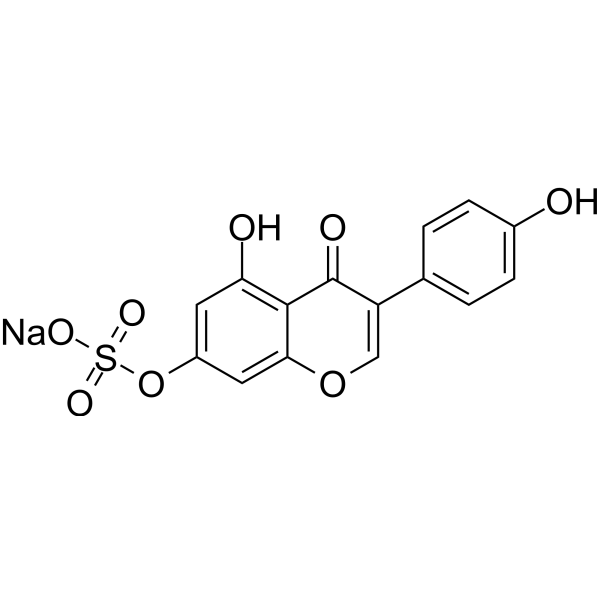
-
- HY-153588
-
|
|
HSP
|
Cancer
|
|
HSP90-IN-22 (Compound 35) is an Hsp90 inhibitor with antiproliferative properties on cells with IC50 values of 3.65 μM for MCF7 breast cancer cells and 2.71 μM for SKBr3 breast cancer cells, respectively.
|
-
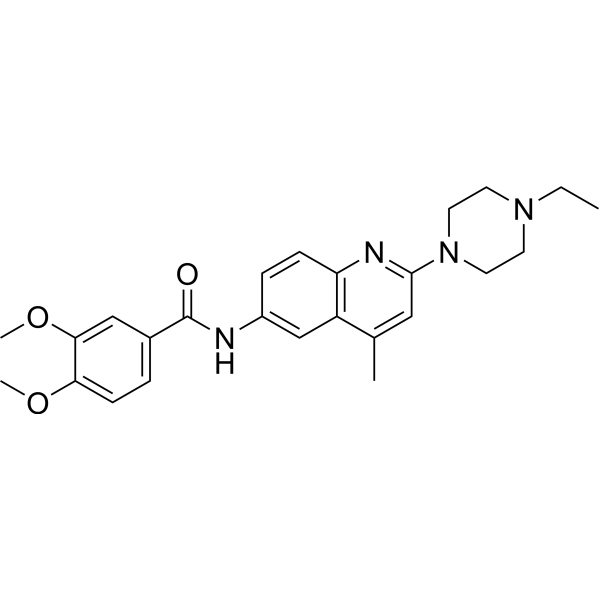
-
- HY-146162
-
|
|
Others
|
Cancer
|
|
Colletotrichalactones A is a polyketide that display moderate-to-potent cytotoxic activities against MCF7 cells with an IC50 of 35.06 µM .
|
-
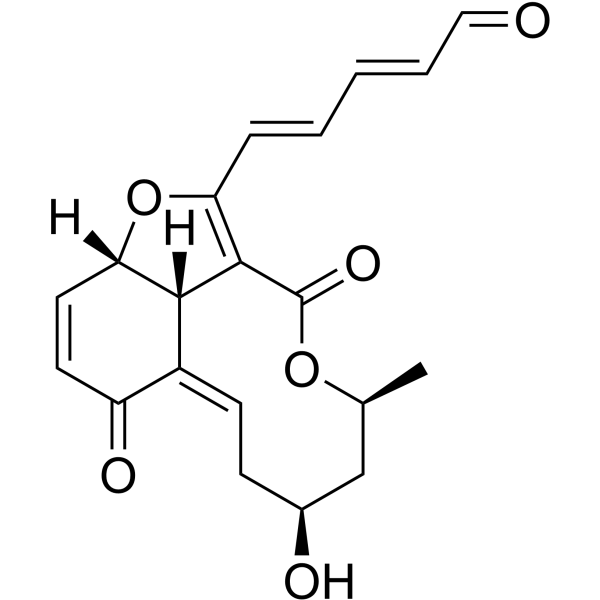
-
- HY-160563
-
-
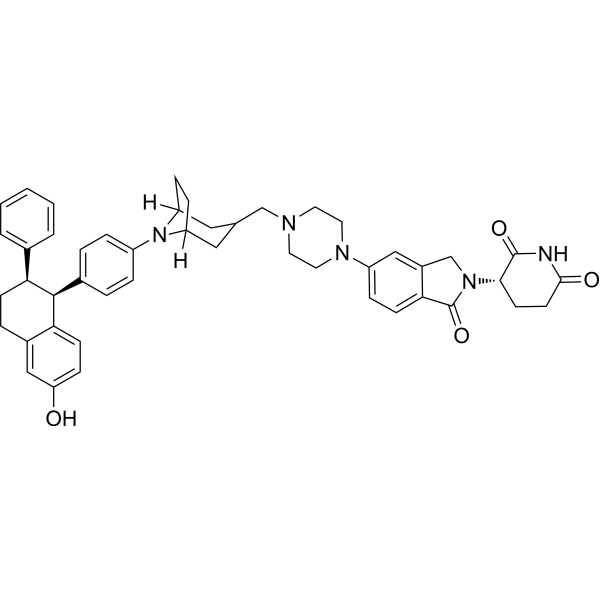
-
- HY-137099
-
|
|
Others
|
Endocrinology
|
|
Genistein 7-sulfate is a metabolite of genistein that can reduce the activity of estrogen agonists in MCF-7 cells. Genistein 7-sulfate can promote the growth of MCF-7 cells at concentrations of 10 μM and above .
|
-
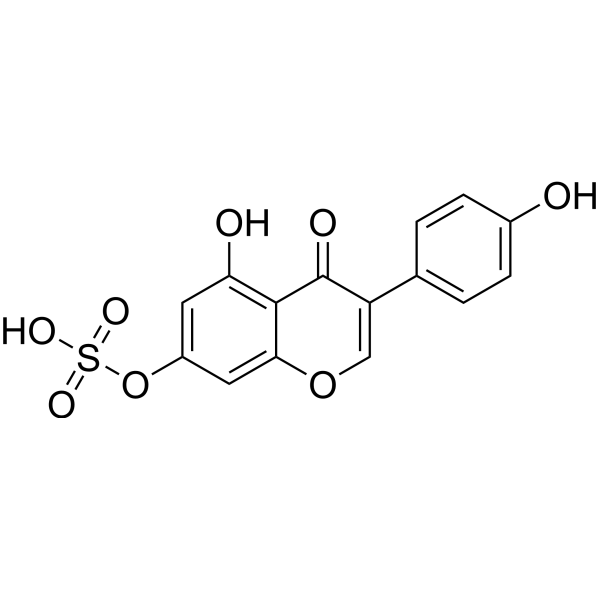
-
- HY-N11973
-
|
|
Others
|
Cancer
|
|
5,7-Dimethoxy-2,3-phenanthrenediol is a compound with estrogenic activity. 5,7-Dimethoxy-2,3-phenanthrenediol increases the proliferation of MCF-7 cell and the expression of ERβ in the MCF-7 cell line .
|
-
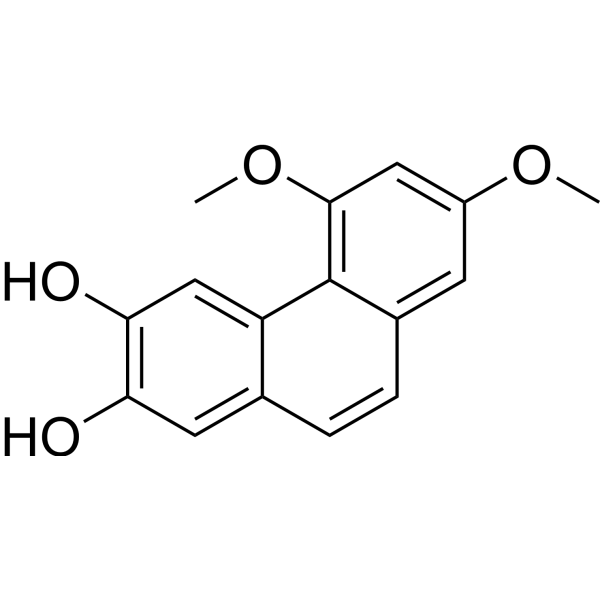
-
- HY-161267
-
-
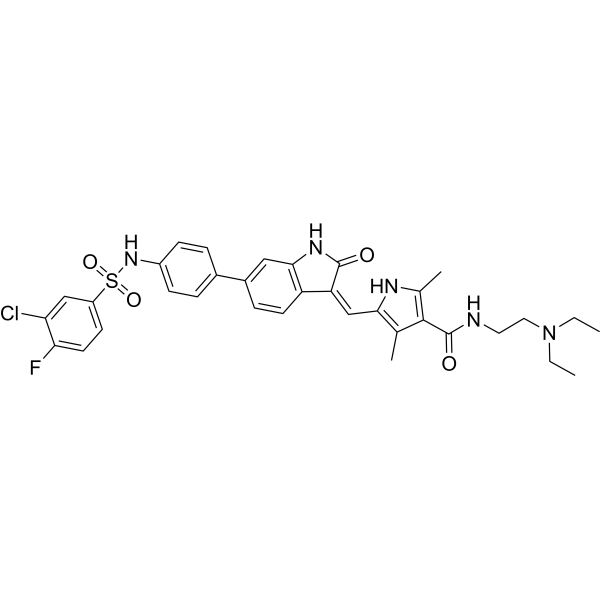
-
- HY-153700
-
|
|
Estrogen Receptor/ERR
|
Endocrinology
|
|
Estrogen receptor modulator 8 (compound 4) is an orally active inhibitor of Estrogen Receptor/ERR α (IC50=0.437 nM, MCF-7 cells). Estrogen receptor modulator 8 inhibits MCF-7 cells proliferation with an IC50 value of 0.1 nM .
|
-
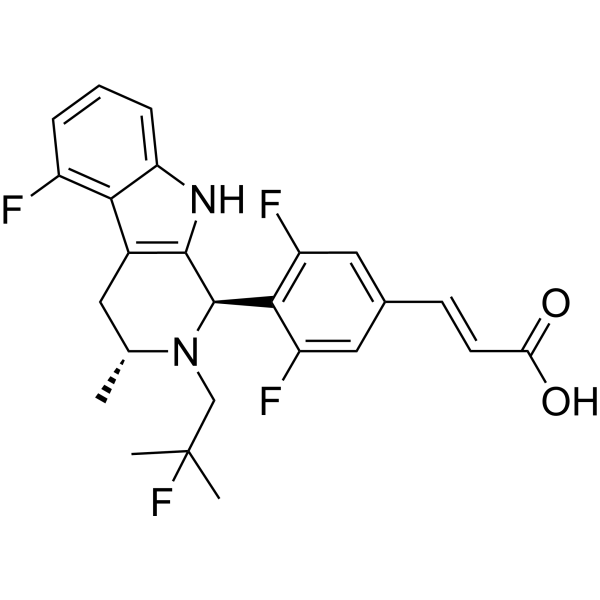
-
- HY-144637
-
|
|
Apoptosis
Autophagy
|
Cancer
|
|
Autophagy inducer 2 (Compound 11i) is a potent autophagy inducer. Autophagy inducer 2 exhibits apparent antiproliferative activity against the MCF-7 cell line with an IC50 value of 1.31 μM and remarkably inhibits the colony formation of the MCF-7 cells. Autophagy inducer 2 arrests the MCF-7 cells in the G2/M phase by regulating the cell-cycle-related proteins Cdk-1 and Cyclin B1. Autophagy inducer 2 has the potential for the research of breast cancer .
|
-
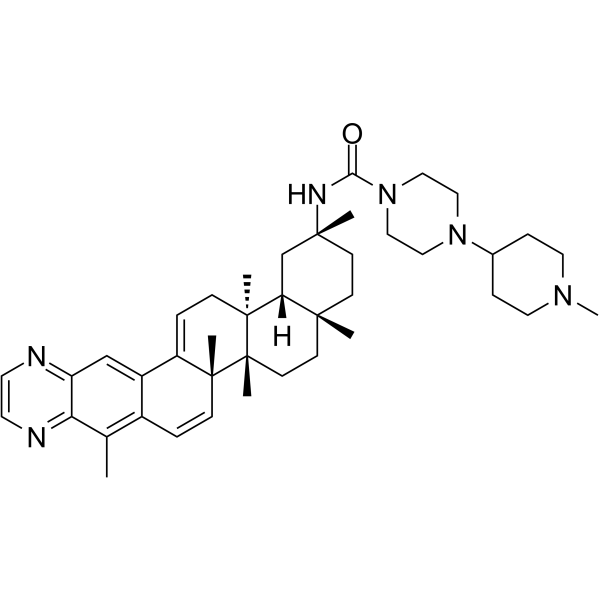
-
- HY-N10871
-
|
|
Others
|
Cancer
|
|
Neocryptomerin, a biflavonoid, shows inhibitory activity against U251, MCF-7, HeLa cell .
|
-
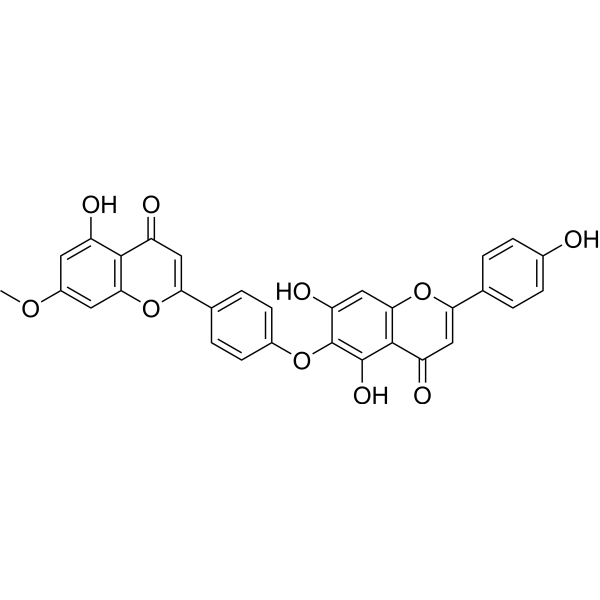
-
- HY-147710
-
|
|
MicroRNA
|
Cancer
|
|
PIN1 inhibitor 2 (compound 12) is a potent PIN1 inhibitor. PIN1 inhibitor 2 shows antitumor activity with an IC50 of 9.55 µM for MCF7 cells. PIN1 inhibitor 2 has the potential for the research of breast cancer .
|
-
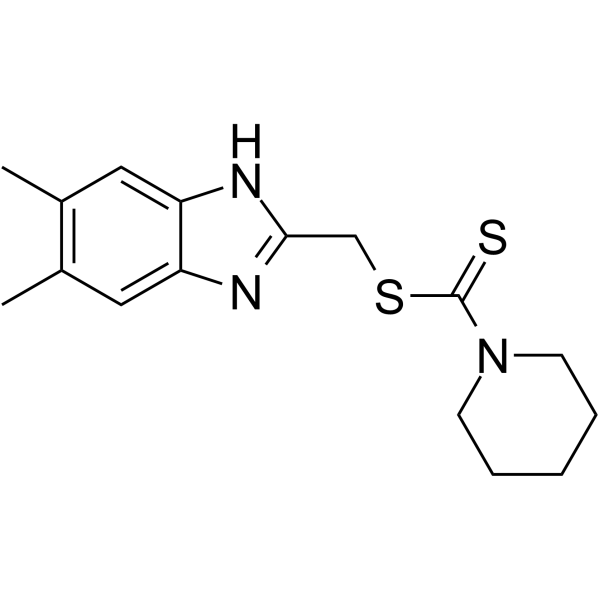
-
- HY-144306
-
|
|
Estrogen Receptor/ERR
Apoptosis
|
Cancer
|
|
ERα degrader 4 is an excellent and selective estrogen receptor α (ERα) degrader (IC50 of 0.31, 0.41 and 0.48 μM in MDA-MB-231, MCF-7 and MCF-7/ADR cells, respectively). ERα degrader 4 has potent inhibitory activity against MCF-7 cell lines. ERα degrader 4 is a potential SERDs candidate for the research of breast cancer .
|
-
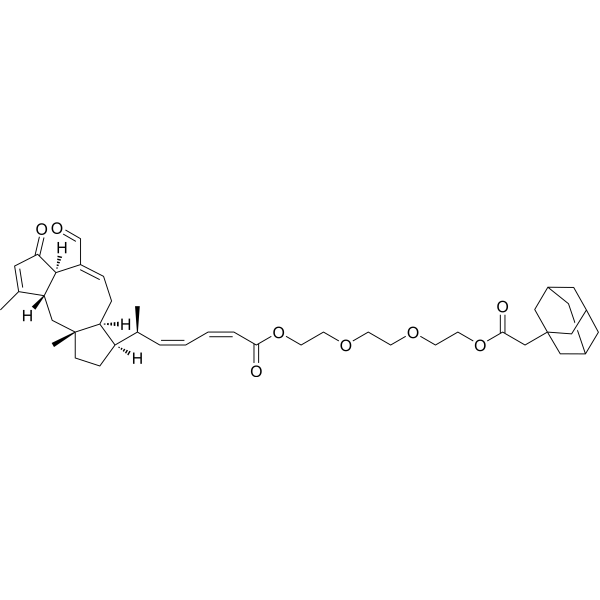
-
- HY-145866
-
|
|
Others
|
Cancer
|
|
Antiproliferative agent-3 (comp 4) shows the highest potency for MCF-7 cells (IC50 = 0.19 nM) .
|
-
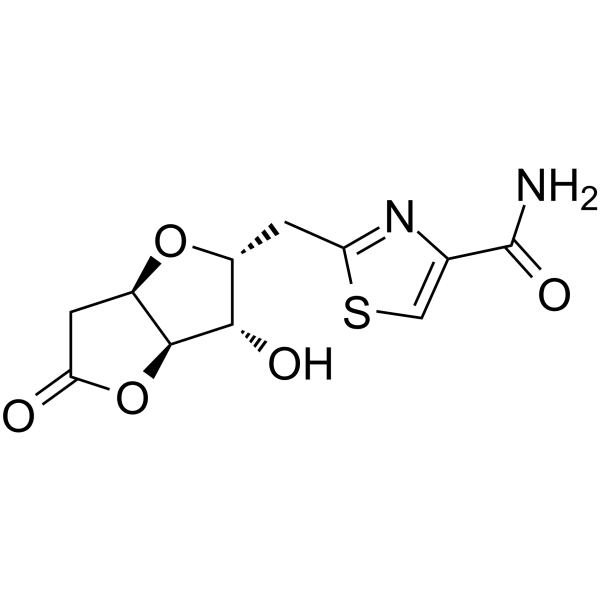
-
- HY-153469
-
|
|
ADC Cytotoxin
|
Cancer
|
|
Benzyl DC-81 (Compound 6a) is an anticancer agent with antiproliferative activity against A375 and MCF-7 cells .
|
-
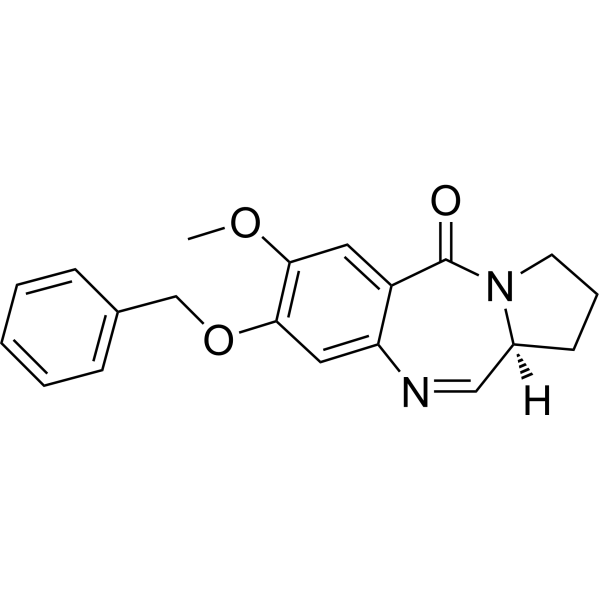
-
- HY-155841
-
|
|
Microtubule/Tubulin
|
Cancer
|
|
Tubulin polymerization-IN-46 (compound 9q) is a microtubule/Tubulin inhibitor that inhibits tubulin polymerization and induces apoptosis. Tubulin polymerization-IN-46 inhibits mitosis and arrests MCF-7 cells in the G2/M phase. Tubulin polymerization-IN-46 has anti-proliferative activity against MCF-7 breast cancer cells with an IC50 of 10 nM .
|
-
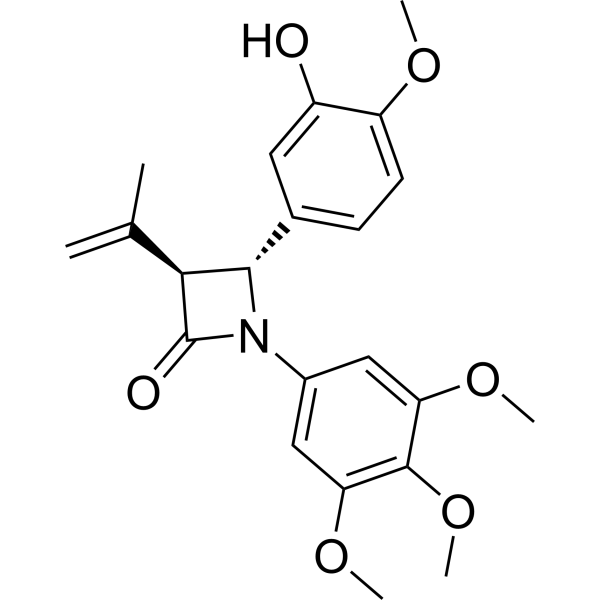
-
- HY-13668
-
|
PaTrin-2
|
DNA Methyltransferase
|
Cancer
|
|
Lomeguatrib is a O 6-methylguanine-DNA methyltransferase (MGMT) inhibitor, with IC50s of 9 nM in cell-free assay and ∼6 nM in MCF-7 cells.
|
-
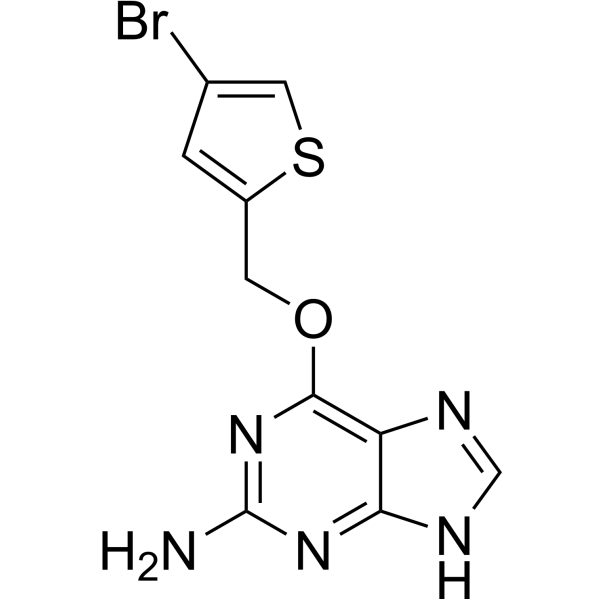
-
- HY-134964
-
-
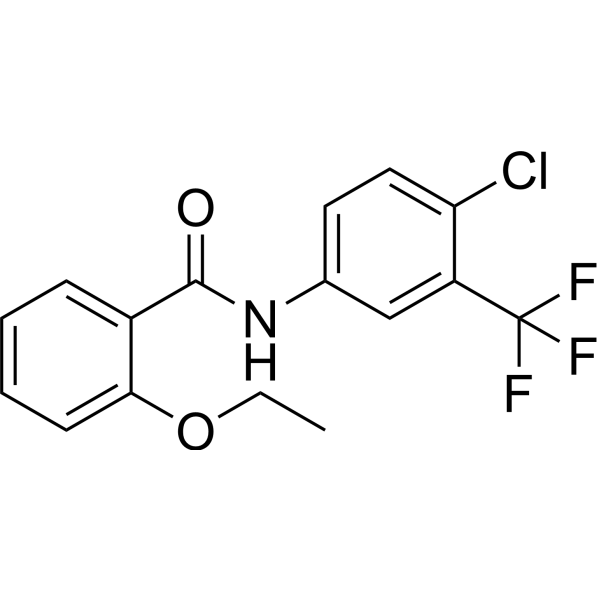
-
- HY-N12209
-
|
|
Others
|
Cancer
|
|
Neohelmanthicin A (compound 3A) is a phenylpropanoid compound with antitumor activity. The IC50s of Neohelmanthicin A for inhibiting leukemia cell line EL4, breast cancer cell line S180 and breast cancer cell line MCF7 are 0.13 μM, 7 μM and 23 μM respectively .
|
-
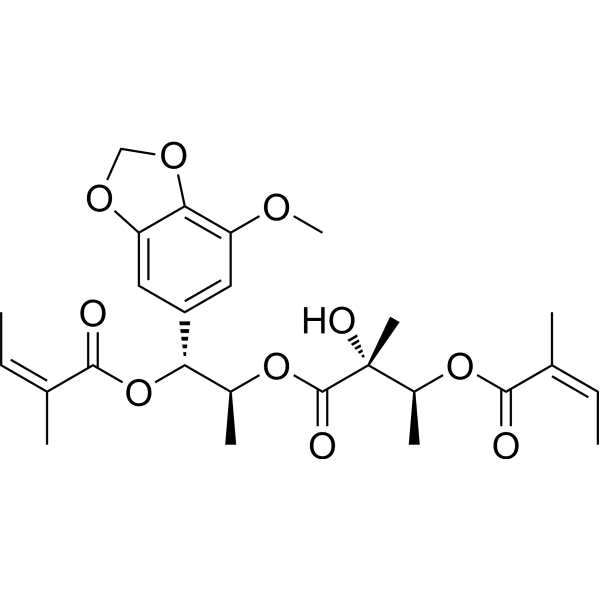
-
- HY-N5103
-
|
|
Others
|
Endocrinology
|
|
Genistein 7,4'-di-O-β-D-glucoside is a natural product with significantly estrogenic proliferative effect in MCF-7 cells .
|
-
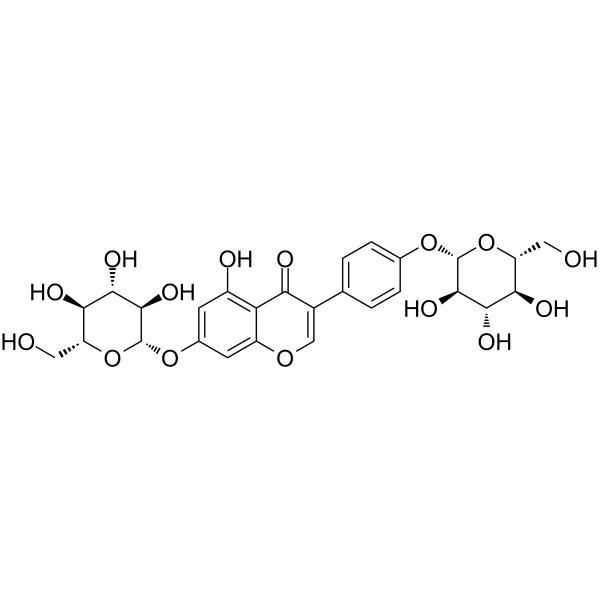
-
- HY-147967
-
|
|
EGFR
|
Cancer
|
|
EGFR-IN-63 is an EGFR inhibition (IC50: 0.096 μM) and it has anticancer activity in MCF-7 cells (IC50: 2.49 μM).
|
-
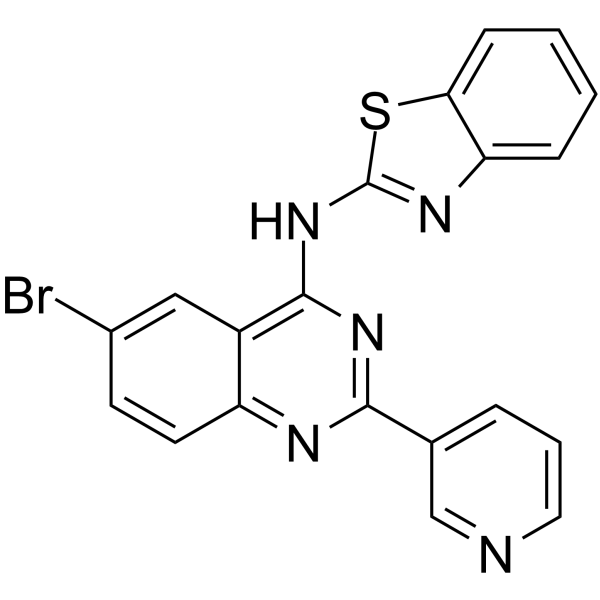
-
- HY-N3042
-
|
Platyphyllone
|
Others
|
Cancer
|
|
Platyphyllonol (Platyphyllone) can be isolated from A. japonica. Platyphyllonol shows cytotoxic effects on MCF-7 cells with IC50 values of 46.9 μg/mL .
|
-
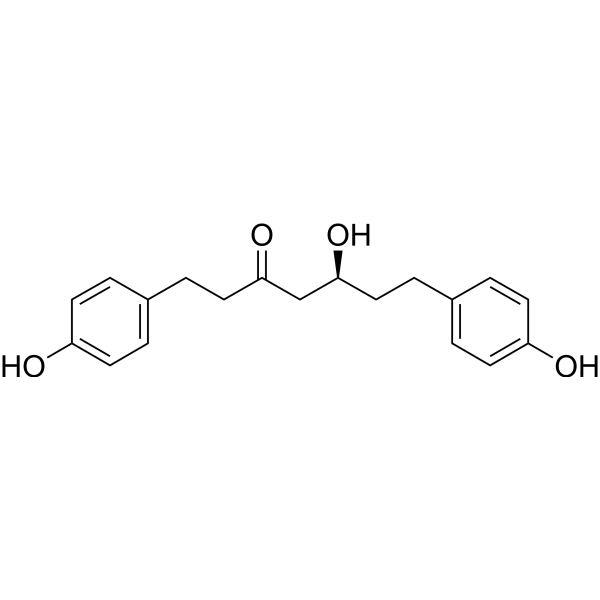
-
- HY-N4010
-
|
|
Others
|
Cancer
|
|
Iriflophenone, isolated from Aquilaria sinensis, stimulates MCF-7 and T-47D human breast cancer cells proliferation .
|
-
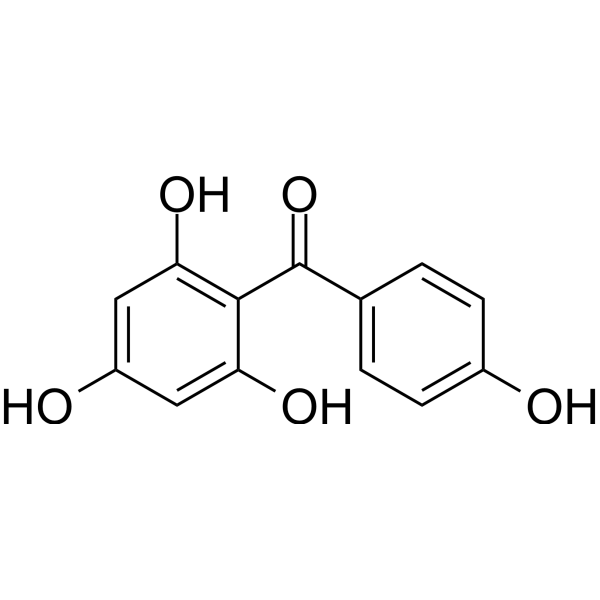
-
- HY-132247B
-
|
|
Others
|
Cancer
|
|
(S)-ErSO is the dextrorotatory enantiomer of ErSO. (S)-ErSO is inactive in MCF-7 cells (from patent WO2020009958A1, compound (s)-105) .
|
-
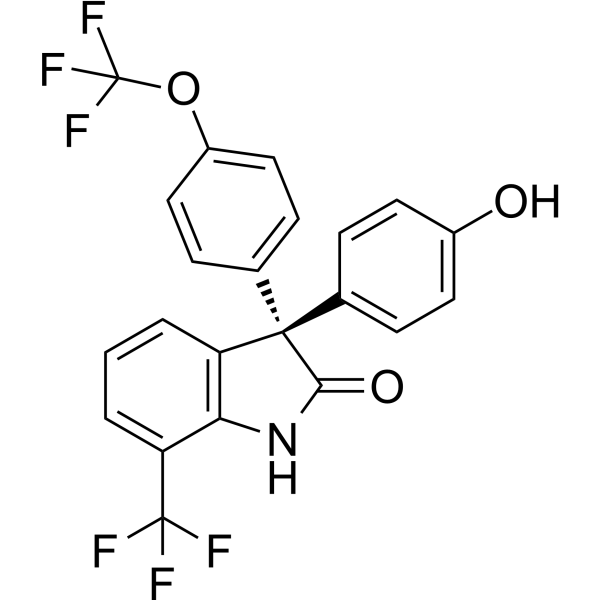
-
- HY-N8679
-
|
|
Endogenous Metabolite
|
Cancer
|
|
Physalin C is a natural product that can be found in physalis angulata. Physalin C shows cytotoxic activities against MCF-7 and HepG2 cells .
|
-
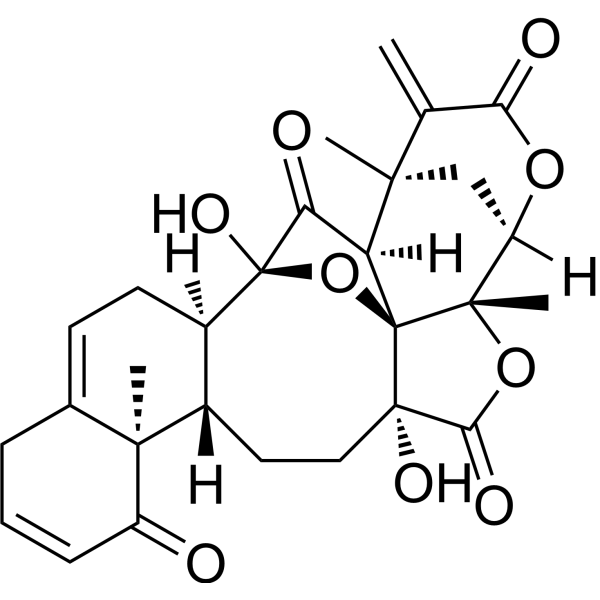
-
- HY-103452
-
|
|
Estrogen Receptor/ERR
|
Endocrinology
|
|
RU58668 is a steroidal antiestrogen that can be used as a potent antiproliferative agent on MCF-7 cells. RU58668 has the potential for the breast cancer research .
|
-
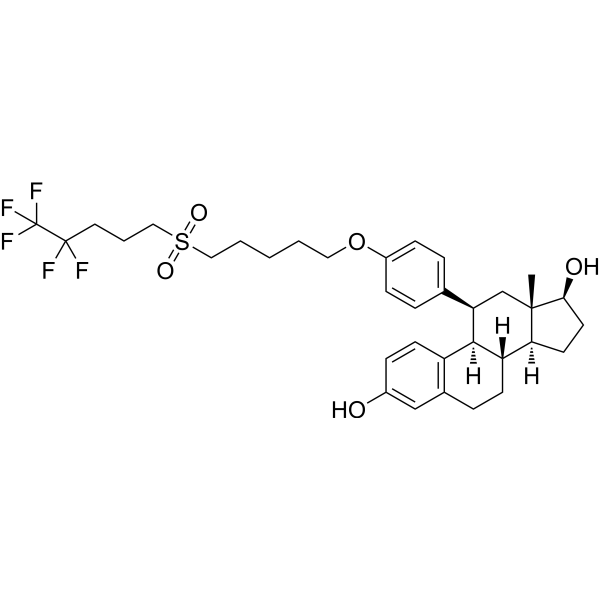
-
- HY-163126
-
|
|
Cholinesterase (ChE)
|
Cancer
|
|
AChE-IN-52 (compound A6) is an acetylcholinesterase (AChE) inhibitor. AChE-IN-52 shows antitumor efficacy, especially against breast cancer MCF-7 cells. AChE-IN-52 significantly disrupts the amino acid metabolism and inhibits migration of MCF-7. AChE-IN-52 plays anticancer role by regulating Best1 and HIST1H2BJ .
|
-
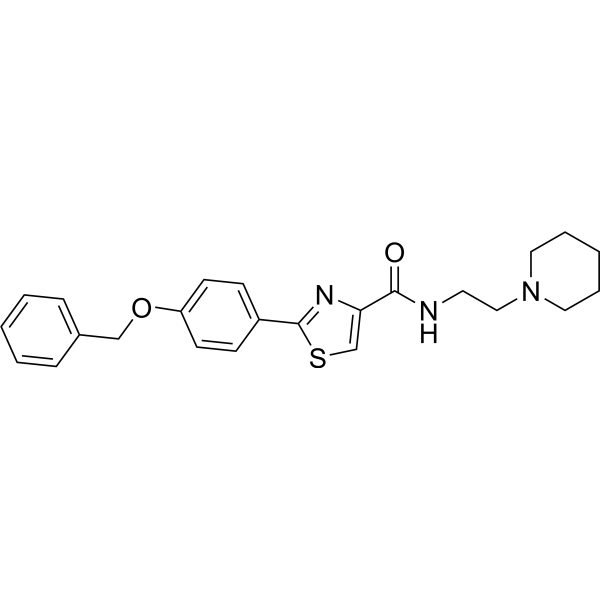
-
- HY-13686
-
PQ401
2 Publications Verification
|
IGF-1R
Apoptosis
|
Cancer
|
|
PQ401 is a potent inhibitor of IGF-IR signaling. PQ401 inhibits IGF-I-stimulated IGF-IR autophosphorylation with an IC50 of 12.0 μM in a series of studies in MCF-7 cells. PQ401 is effective at inhibiting IGF-I-stimulated growth of MCF-7 cells (IC50, 6 μM). PQ401 is a potential agent for breast and other IGF-I-sensitive cancers. PQ401 induces caspase-mediated apoptosis .
|
-
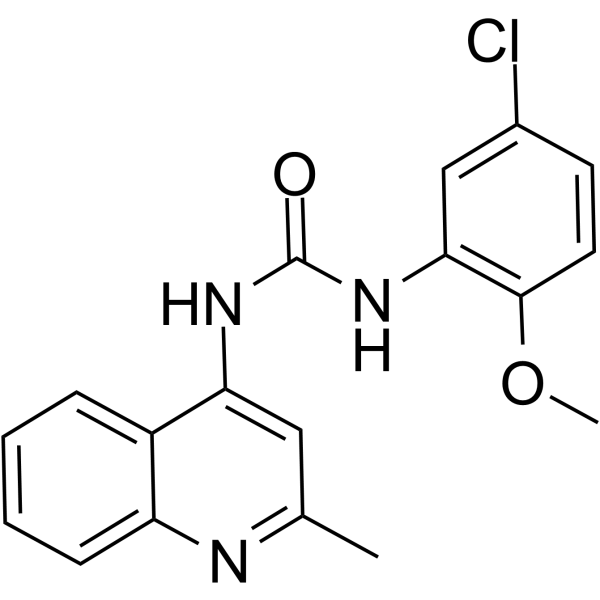
-
- HY-156114
-
|
|
EGFR
CDK
|
Cancer
|
|
EGFR/CDK2-IN-2 (compound 6a) is a dual inhibitor of EGFR and CDK-2 with IC50s of 19.6 and 87.9 nM, respectively. EGFR/CDK2-IN-2 induces apoptosis in MCF-7 cells and arrests the cell cycle in the S phase. EGFR/CDK2-IN-2 has significant anti-cancer cell toxicity and inhibits MCF-7 with an IC50 of 0.39 μM .
|
-
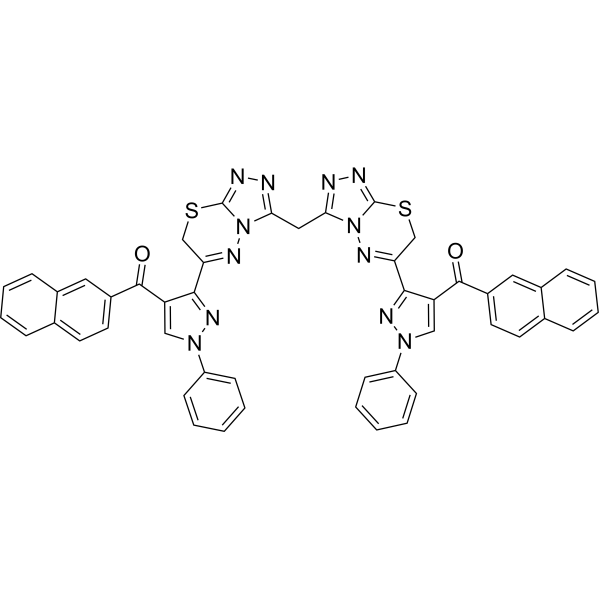
-
- HY-156115
-
|
|
EGFR
CDK
|
Cancer
|
|
EGFR/CDK2-IN-3 (compound 4b) is a dual inhibitor of EGFR and CDK-2 with IC50s of 71.7 and 113.7 nM, respectively. EGFR/CDK2-IN-3 induces apoptosis in MCF-7 cells and arrests the cell cycle in the S phase. EGFR/CDK2-IN-3 has significant anti-cancer cell toxicity and inhibits MCF-7 with an IC50 of 3.16 μM .
|
-
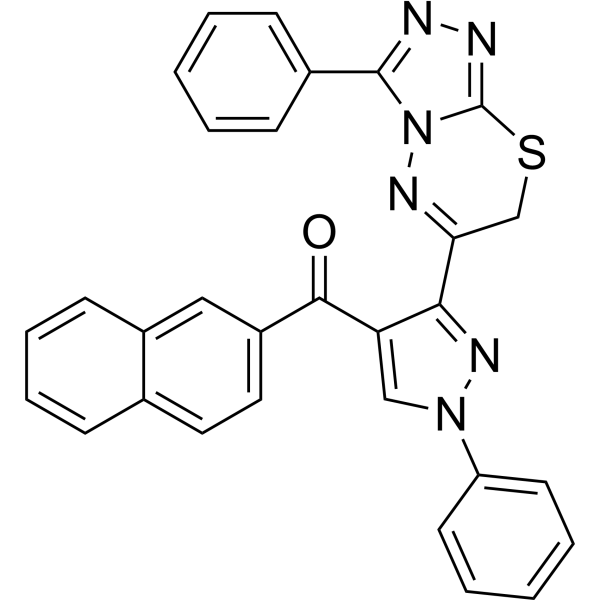
-
- HY-156116
-
|
|
EGFR
CDK
|
Cancer
|
|
EGFR/CDK2-IN-4 (compound 4c) is a dual inhibitor of EGFR and CDK-2 with IC50s of 89.6 and 165.4 nM, respectively. EGFR/CDK2-IN-4 induces apoptosis in MCF-7 cells and arrests the cell cycle in the S phase. EGFR/CDK2-IN-4 has significant anti-cancer cell toxicity and inhibits MCF-7 with an IC50 of 2.74 μM .
|
-
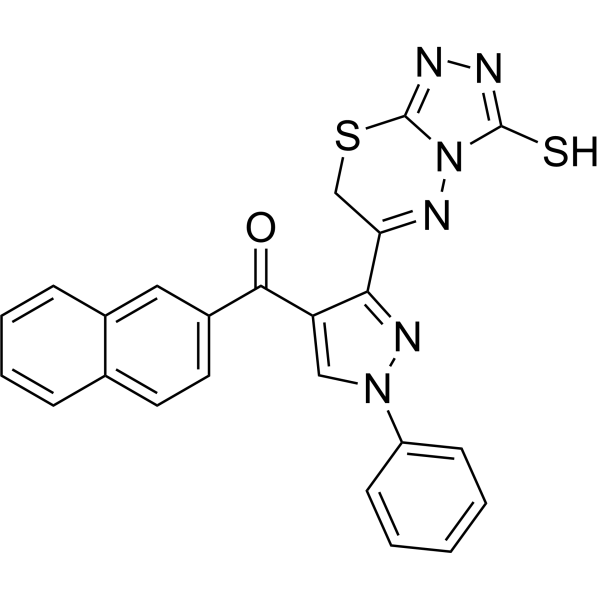
-
- HY-N2887
-
|
|
Others
|
Cancer
|
|
Araliadiol is a polyacetylenic compound isolated from the leaves of Aralia cordata Thunb. Araliadiol inhibits MCF-7 cells growth with an IC50 value of 6.41 µg/mL .
|
-
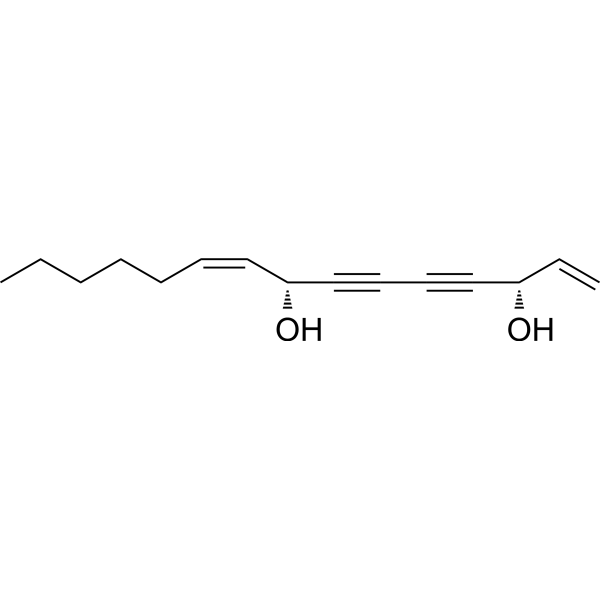
-
- HY-163281
-
|
|
Fluorescent Dye
|
Cancer
|
|
FSY-OSO2F is used as an amino acid tracer for subsutaneous MCF-7 tumors after labeling with isotope 18F. FSY-OSO2F shows an uptake in MCF-7 cells through the regulation of L-Tyr, ASC, and ASC2 transporters. FSY-OSO2F visualizes the U78MG glioma labeled with 18F .
|
-
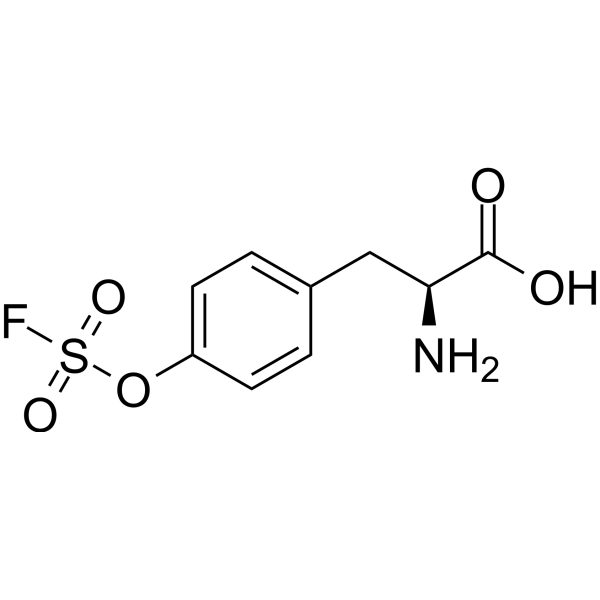
-
- HY-N2198
-
|
|
|
|
|
Podocarpusflavone A is a DNA topoisomerase I inhibitor. Podocarpusflavone A has moderated anti-proliferative activity and induces cell apoptosis in MCF-7. Podocarpusflavone A is developing anti-tumor agents .
|
-
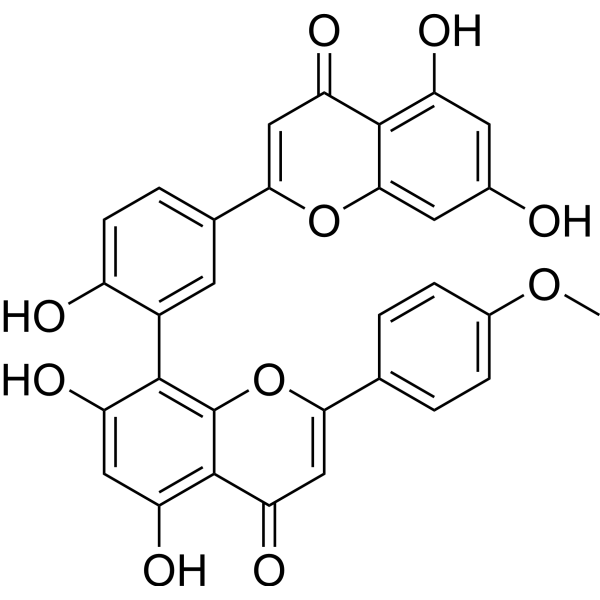
-
- HY-N10305
-
|
|
Autophagy
|
Cancer
|
|
Clionamine B is an autophagy stimulating aminosteroid isolated from the sponge Cliona celata. Clionamine B strongly stimulates autophagy in human breast cancer MCF-7 cells .
|
-
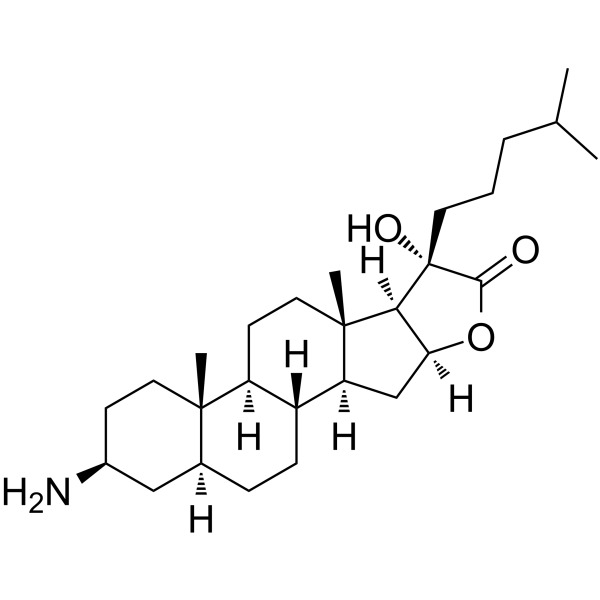
-
- HY-119539
-
|
|
Phosphatase
|
Endocrinology
Cancer
|
|
Limocitrin is a natural product that can be isolated from the buds of P. acerifolia and P. orientalis. Limocitrin suppresses estradiol-dependent proliferation of MCF7 cells weakly but estradiol-induced AlkP (alkaline phosphatase) expression only marginally .
|
-
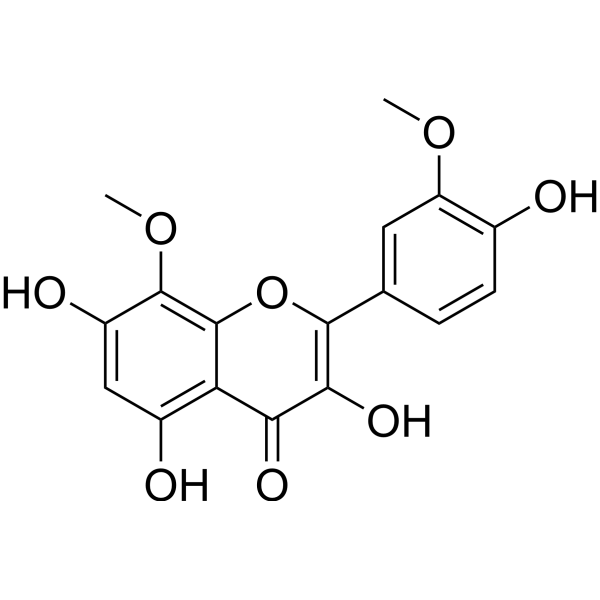
-
- HY-148789
-
|
OP-1250
|
Estrogen Receptor/ERR
|
Inflammation/Immunology
Cancer
|
|
Palazestrant is an antiestrogen and antineoplastic agent. Palazestrant can completely inhibit the activity of 17b-estradiol (E2) with IC50 value of 6.4 nM, and inhibit the proliferation of MCF7 and CAMA-1 cells with IC50 value of 1.4-1.6 nM. Palazestrant can inhibit ER +/HER2 + cancer .
|
-
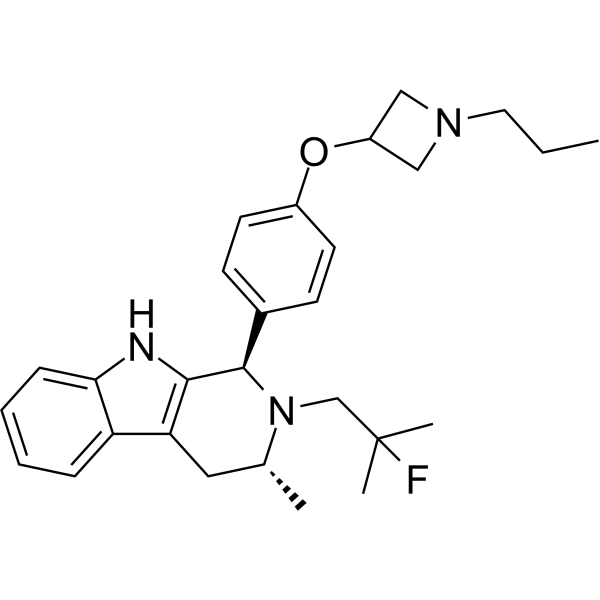
-
- HY-N2863
-
|
|
Others
|
Cancer
|
|
Goniothalenol is a styryl lactone that can be isolated from Goniothalamus griffithii. Goniothalenol exhibits cytatoxic activity against A2780, HCT-8, KB and MCF-7 cell lines .
|
-
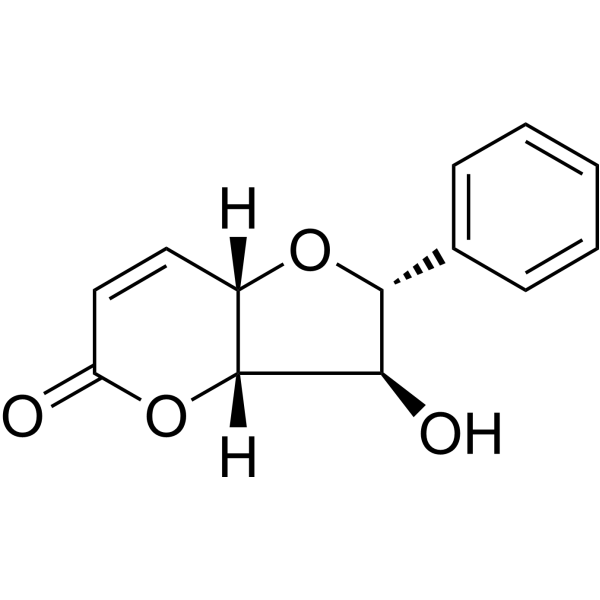
-
- HY-N7464
-
|
|
Others
|
Others
|
|
Jolkinolide E is a casbane diterpenoid from the roots of Euphorbia rapulum. Jolkinolide E shows weak selective activity against HepG2, MCF-7, and C6 cell lines .
|
-
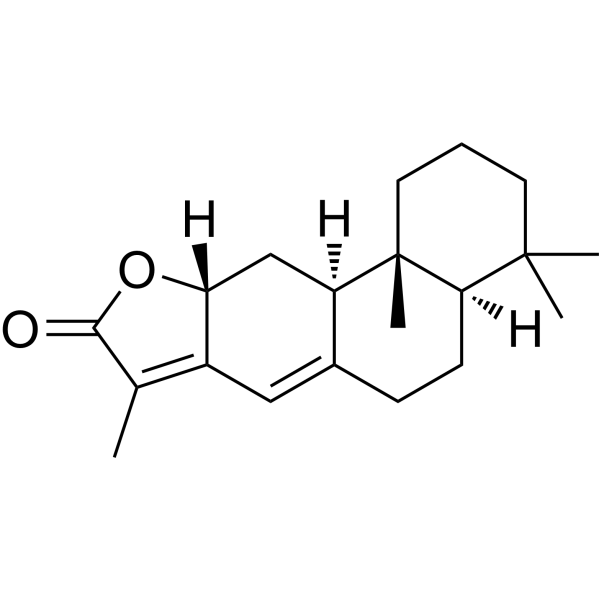
-
- HY-148453
-
|
|
Others
|
Cancer
|
|
Antiproliferative agent-16 is an indolyl hydrazide-hydrazone compound with anticancer activity. Antiproliferative agent-16 exhibits specificity toward breast cancer cells (IC50 of 6.94 μM for MCF-7 cells) .
|
-
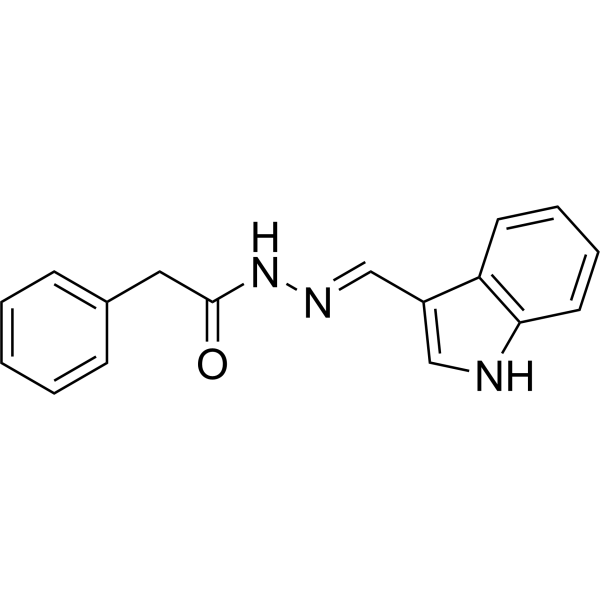
-
- HY-N6990
-
|
|
Others
|
Cancer
|
|
Anhydrosecoisolariciresinol is from the flower of Wedelia biflora, has anti-tumor activities .
Anhydrosecoisolariciresinol decreases the growth of human breast cancer MCF-7 and MDA-MB-231 cell lines .
|
-
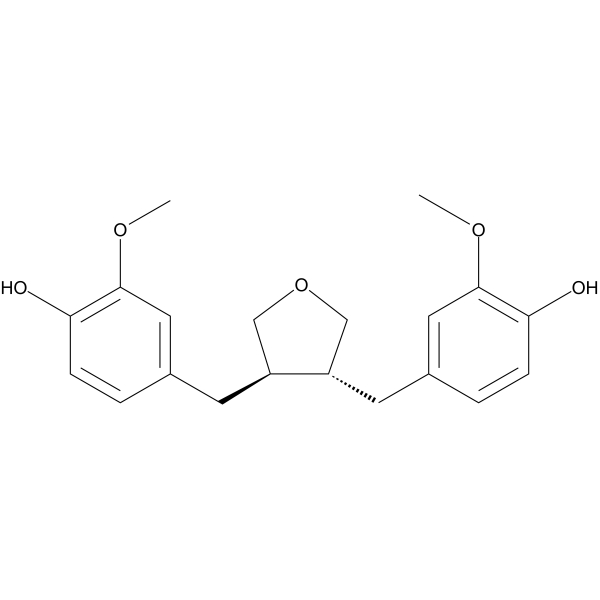
-
- HY-147887
-
|
|
Microtubule/Tubulin
|
Cancer
|
|
Tubulin inhibitor 28 (compound 2g) is a potent tubulin inhibitor with an IC50 value of 1.2 µM. Tubulin inhibitor 28 shows anti-proliferative activity for MCF-7 cells .
|
-
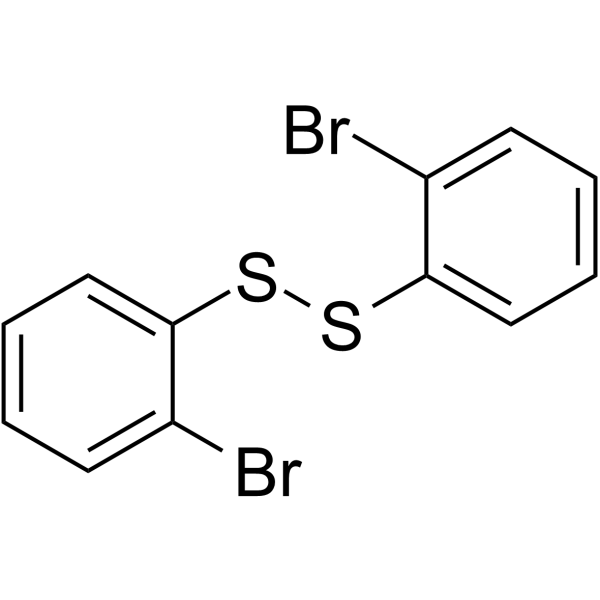
-
- HY-162035
-
-
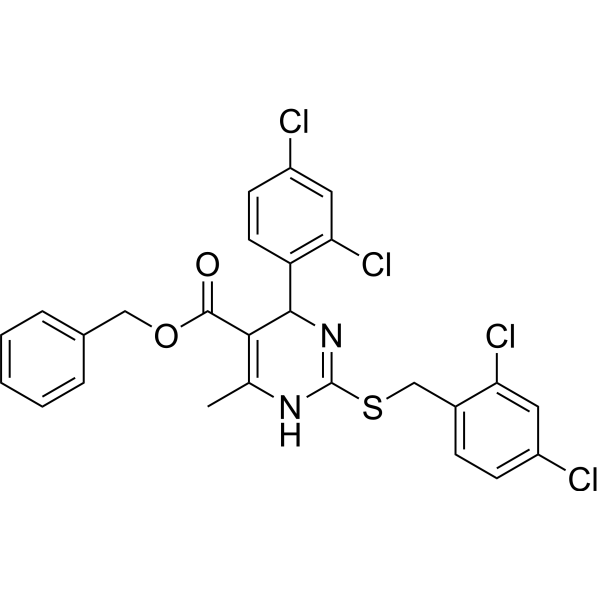
-
- HY-149376
-
|
|
Microtubule/Tubulin
|
Cancer
|
|
Tubulin inhibitor 38 (compound 14) is a tetrazole-based Tubulin inhibitor with antiproliferative potencies. Tubulin inhibitor 38 (100 nM,24 h) mediates mitotic arrest,blocks cell cycle at G2/M phase and induces apoptosis. Tubulin inhibitor 38 exhibits high cytotoxicity with high selectivity index among HeLa,MCF7,and U87 MG cells .
|
-
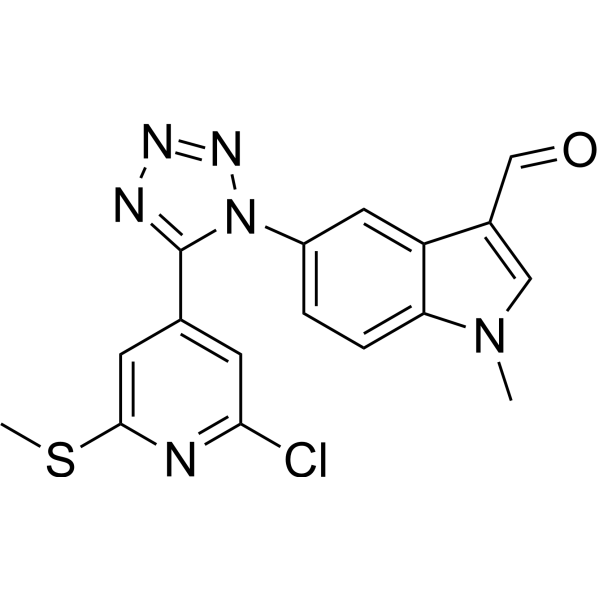
-
- HY-N9391
-
|
|
Apoptosis
|
Cancer
|
|
7,3′,5′-Trihydroxyflavanone, a flavanoid derivative, induces the apoptotic cell death of MCF-7 cells by increasing Bax expression level. 7,3′,5′-Trihydroxyflavanone also exhibits antioxidant activity .
|
-
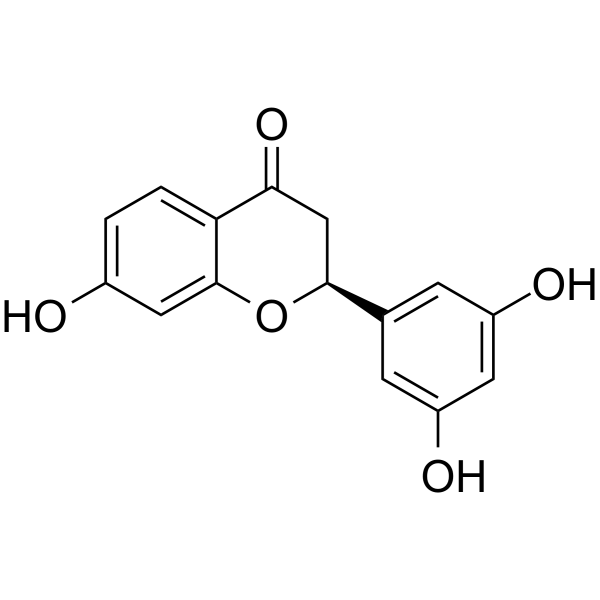
-
- HY-155167
-
|
|
Antibiotic
Fungal
|
Cancer
|
|
Anticancer agent 151 (compound 6C) is an anticancer agent. Anticancer agent 151 exhibits excellent in vitro cytotoxic activity against MCF-7 cells with an IC50 value of 6.3 μM .
|
-
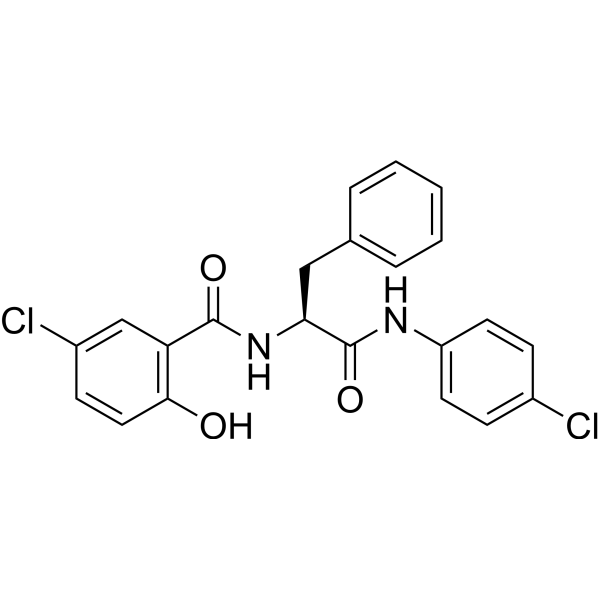
-
- HY-147504
-
|
|
Apoptosis
Caspase
Bcl-2 Family
|
Cancer
|
|
Anticancer agent 63 (compound 3h) shows active in reducing the viability of different cancer cell lines, including SW480, HeLa, A549 and MCF-7, with IC50 values at 24 h of 4.9, 11.5, 9.4, and 3.4 μM, respectively. Anticancer agent 63 induce apoptosis in MCF-7 cells via down-regulating the expression of Bcl-2 and up-regulating the expression of IL-2 and Caspase-3. Anticancer agent 63 also shows antioxidant activity .
|
-
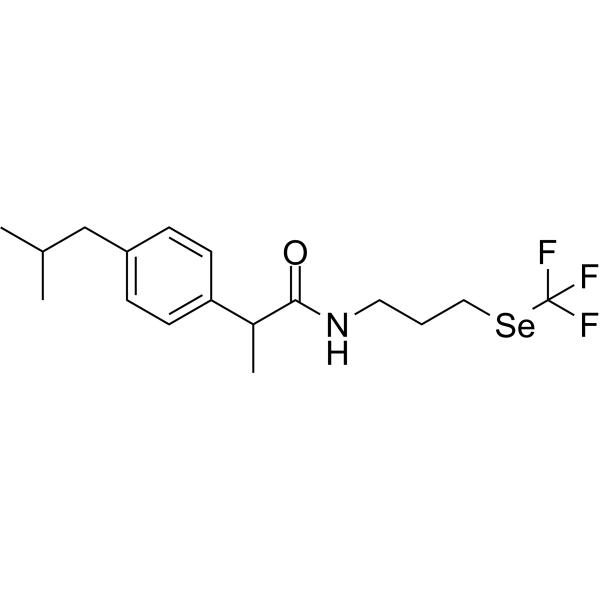
-
- HY-147781
-
|
|
Apoptosis
|
Cancer
|
|
Anticancer agent 66 (Compound 13e) is an anti-cancer agent. Anticancer agent 66 induces apoptosis and increases sub-G1 cell population in MCF-7 cells. Anticancer agent 66 is a ciprofloxacin analog .
|
-
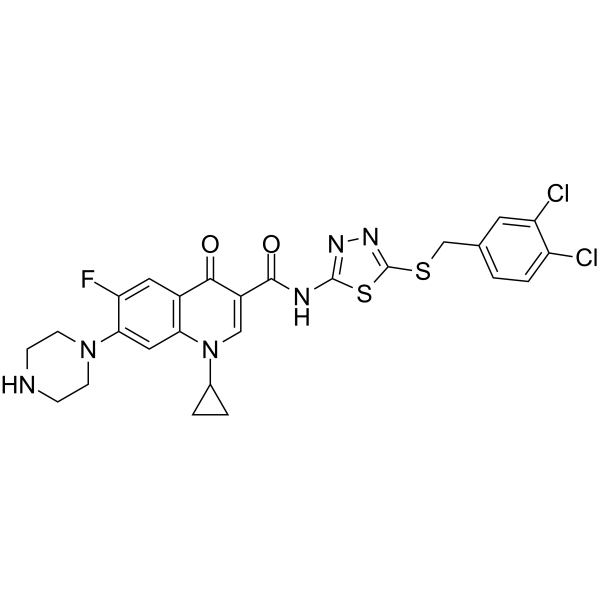
-
- HY-147782
-
|
|
Apoptosis
|
Cancer
|
|
Anticancer agent 67 (Compound 13g) is an anti-cancer agent. Anticancer agent 67 induces apoptosis and increases sub-G1 cell population in MCF-7 cells. Anticancer agent 67 is a ciprofloxacin analog .
|
-
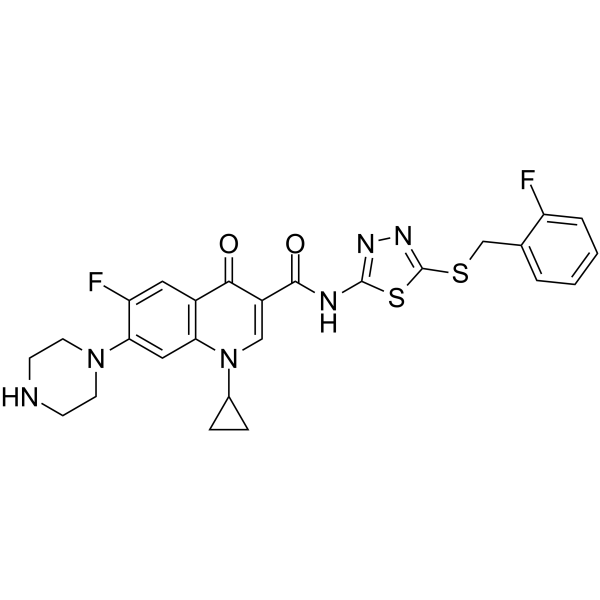
-
- HY-162239
-
|
|
Others
|
Cancer
|
|
Anticancer agent 187 (Compound 4) is an anticancer agent that can target sarcoma cells in tumor-bearing mouse models. Anticancer agent 187 exhibits cytotoxic activity against HepG2, Caco2, and MCF-7 cells .
|
-
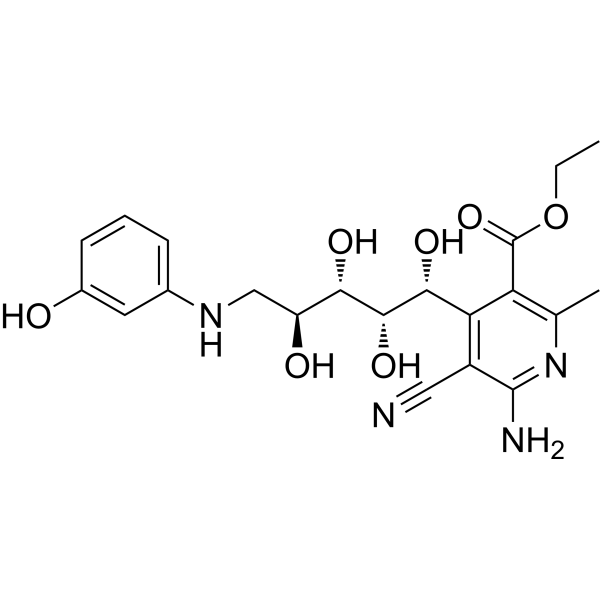
-
- HY-22024
-
|
|
Others
|
Cancer
|
|
5-Hydroxyflavone, a flavonoid ligand, shows no cytotoxic activity against MCF-7, FaDU, MDA-MB-435S, U87, RPE-1, and HEK293 cells .
|
-
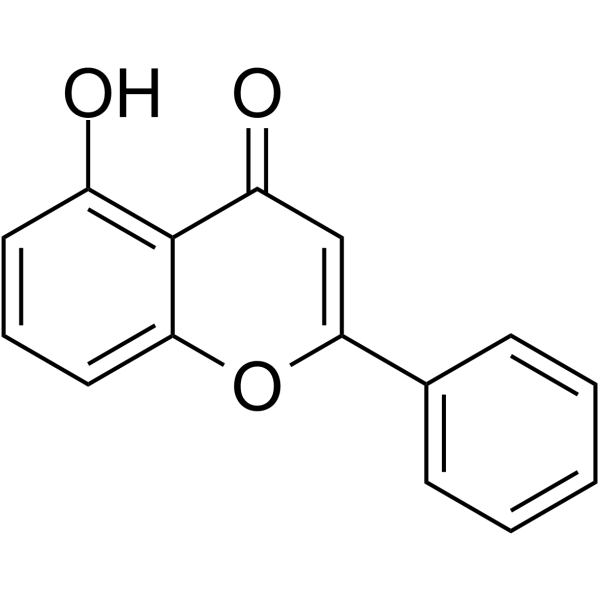
- HY-N8859
-
|
16-Hydroxyiridal
|
Others
|
Others
|
|
Isoiridogermanal can be isolated from the extract of rhizomes of Iris tectorum Maxim. Isoiridogermanal is cytotoxic with IC50 values of 11 μM and 23 μM against MCF-7 and C32 cell lines.
|
-
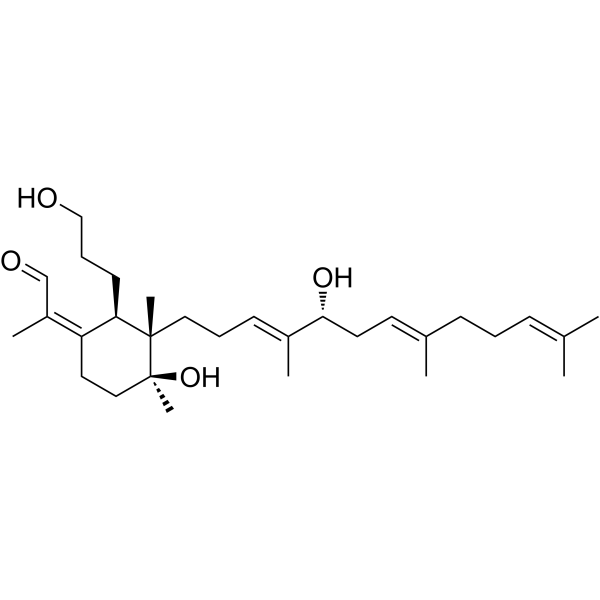
- HY-P5956
-
|
|
Caspase
|
Cancer
|
|
Ac-AAVALLPAVLLALLAP-LEHD-CHO is an inhibitor of caspases 4, 5 and 9. Ac-AAVALLPAVLLALLAP-LEHD-CHO shows protective effects upon Neocarzinostatin (HY-111183)-treated MCF-7 cells .
|
-
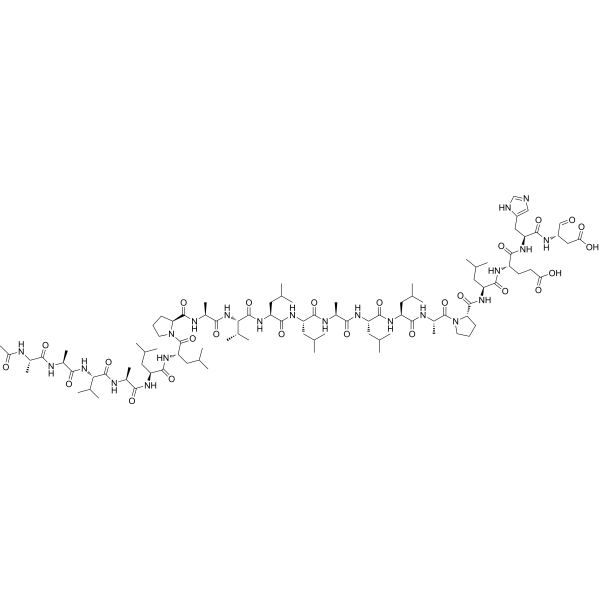
- HY-N3443
-
|
|
Others
|
Cancer
|
|
Jolkinol A is a natural product that can be found in Euphorbia pubescens. Jolkinol A inhibits cell growth with GI50s of 95.3, 57.3, >100 µM for MCF-7, NCI-460, SF-268 cells, respectively .
|
-
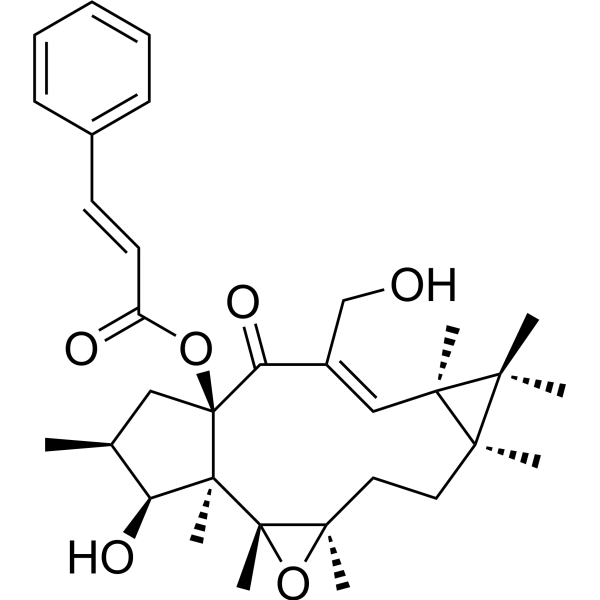
- HY-100219
-
|
|
|
|
|
CB1151 is a 20-epi analogue of 1,25 dihydroxyvitamin D3 (VD) with potent anti-tumor effects. CB1151 inhibits MCF-7 cell growth with an IC50 value of 0.82 nM .
|
-
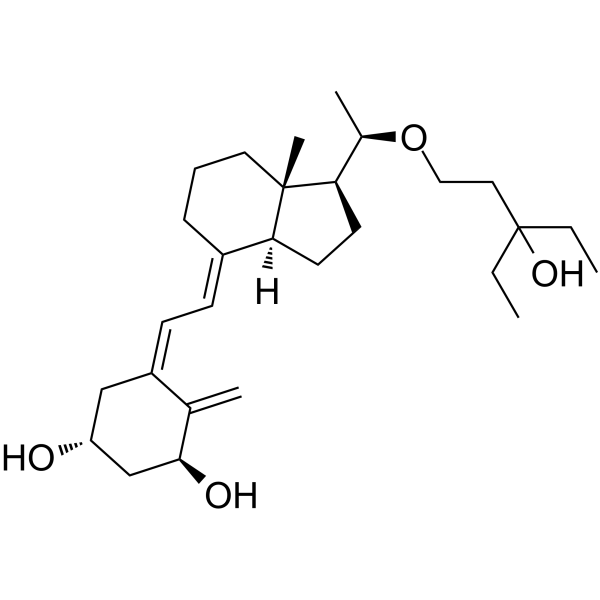
- HY-115948
-
|
|
Others
|
Cancer
|
|
Antitumor agent-46 (Compound 2h) is an anti-tumor agent. Antitumor agent-46 demonstrates markedly higher antiproliferative activity on MCF-7 cells with an IC50 value of 2.08 µM .
|
-
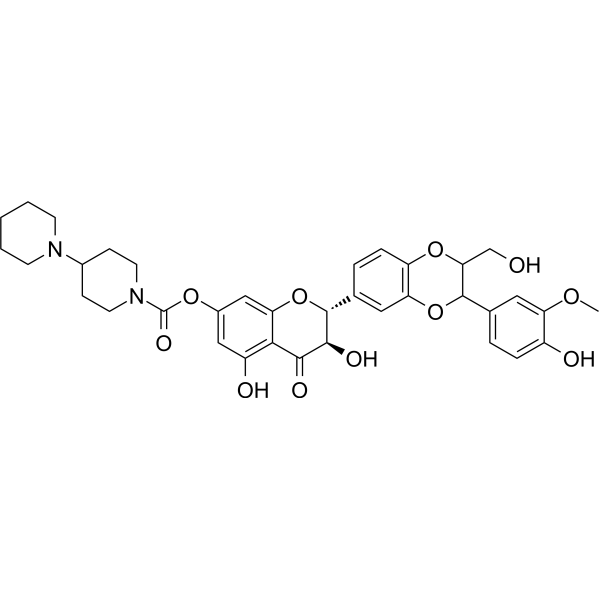
- HY-111524
-
|
|
HSP
Apoptosis
|
Cancer
|
|
CPUY201112 is a potent heat shock protein Hsp90 inhibitor with Kd of 27 nM. CPUY201112 induces p53-mediated apoptosis in MCF-7 cells, resulting in cell cycle arrest, which can be used in cancer research .
|
-
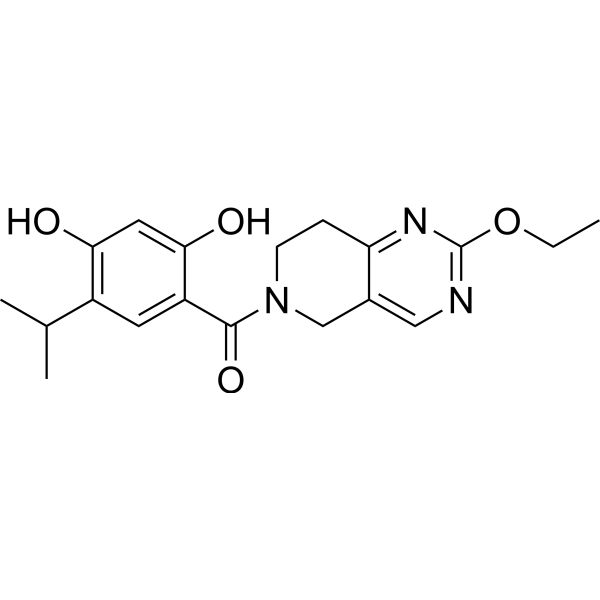
- HY-135584
-
|
|
Estrogen Receptor/ERR
|
|
|
Raloxifene 6-Monomethyl Ether (Compound 7) is a Raloxifene derivative that inhibits estrogen receptor α. Raloxifene 4-Monomethyl Ether inhibits MCF-7 cells with an IC50 of 250 nM and a pIC50 of 6.6 .
|
-
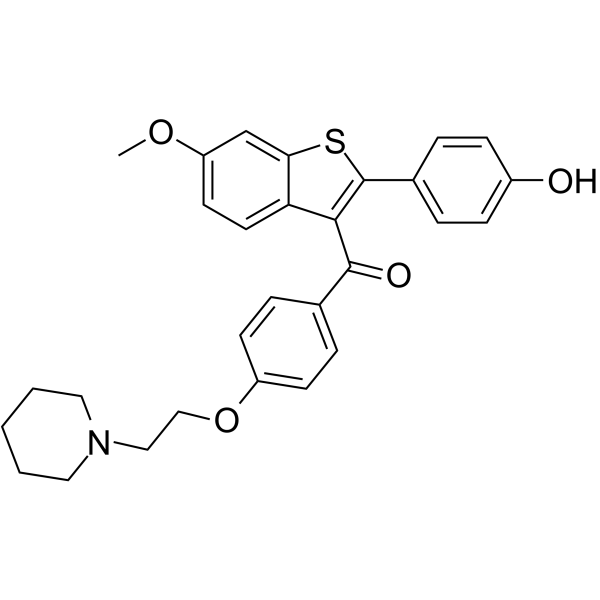
- HY-135590
-
|
|
Estrogen Receptor/ERR
|
|
|
Raloxifene 4-Monomethyl Ether (Compound 37) is a Raloxifene derivative that inhibits estrogen receptor α. Raloxifene 4-Monomethyl Ether inhibits MCF-7 cells with an IC50 of 1 μM and a pIC50 of 6 .
|
-
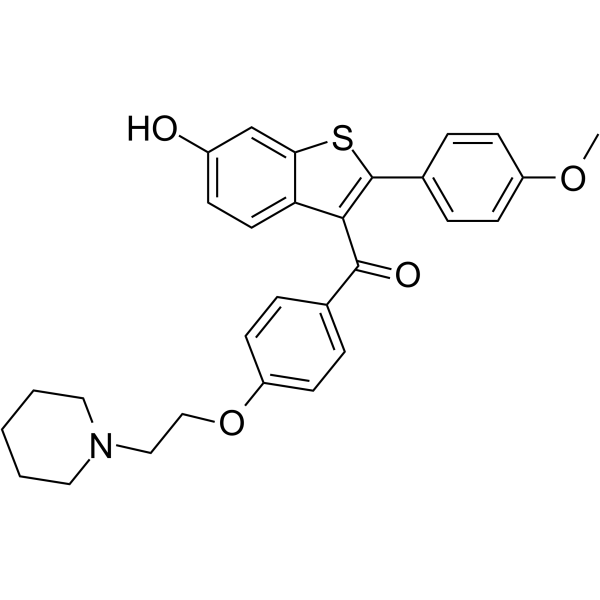
- HY-107550
-
|
|
HDAC
|
Cancer
|
|
TCS HDAC6 20b is a HDAC6-selective inhibitor. TCS HDAC6 20b blocks the growth of estrogen receptor α-positive breast cancer MCF-7 cells .
|
-
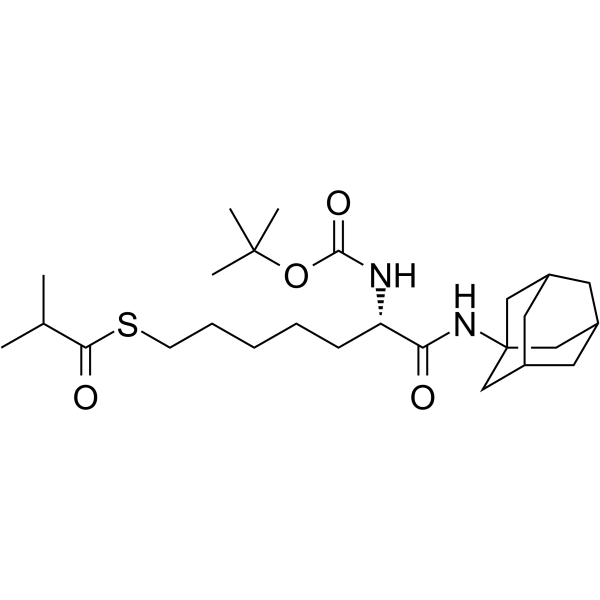
- HY-N10846
-
|
|
Others
|
Others
|
|
Neotriptonoterpene, a compound isolated from T. regelii, shows weak cytotoxic activity against A2780, HepG2 and MCF-7 cells with IC50 values of 65.80, 35.45 and 64.80 µM respectively .
|
-
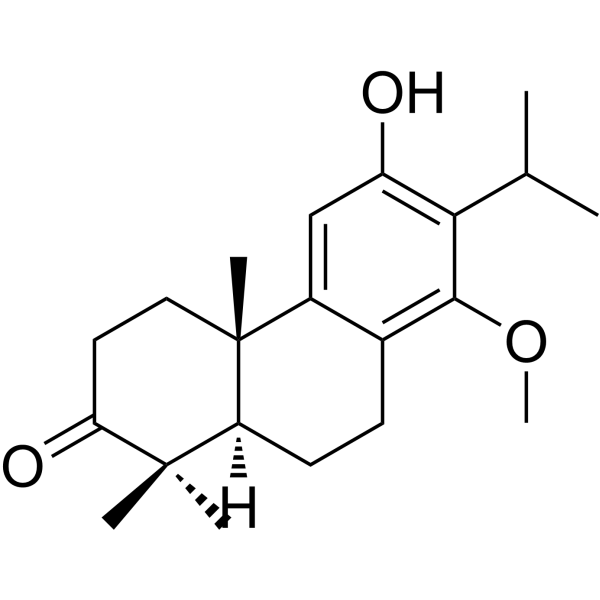
- HY-N7654
-
|
|
Apoptosis
|
Cancer
|
|
(-)-Epipodophyllotoxin (2) is an antiproliferative agent against cancer cells isolated from American mayapple Podophyllum peltatum, with GI50s of 0.36 and 0.24 μM in HeLa cells and MCF-7 cells, respectively. (-)-Epipodophyllotoxin can inhibit mitotic spindle assembly in vitro .
|
-
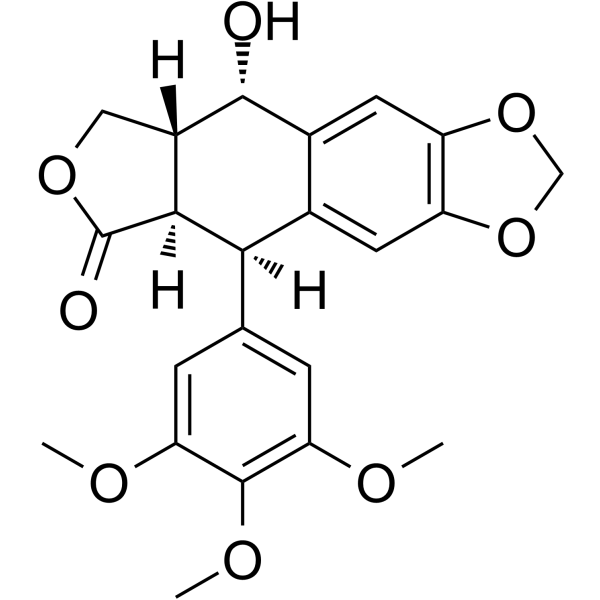
- HY-112721
-
FDI-6
1 Publications Verification
|
Others
|
Cancer
|
|
FDI-6 is an inhibitor of FOXM1. FDI-6 binds directly to FOXM1 protein, to displace FOXM1 from genomic targets in MCF-7 breast cancer cells, and induce concomitant transcriptional down-regulation.
|
-
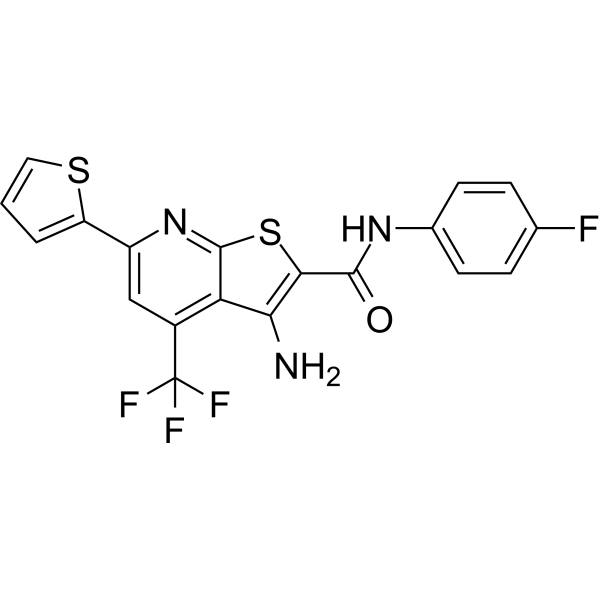
- HY-147882
-
|
|
Bacterial
|
Infection
|
|
Anti-MRSA agent 6 (compound 3q6) is a potent anti-methicillin-resistant Staphylococcus aureus (anti-MRSA) agent. Anti-MRSA agent 6 shows low cytoxicity for MCF-7, A549 cells .
|
-
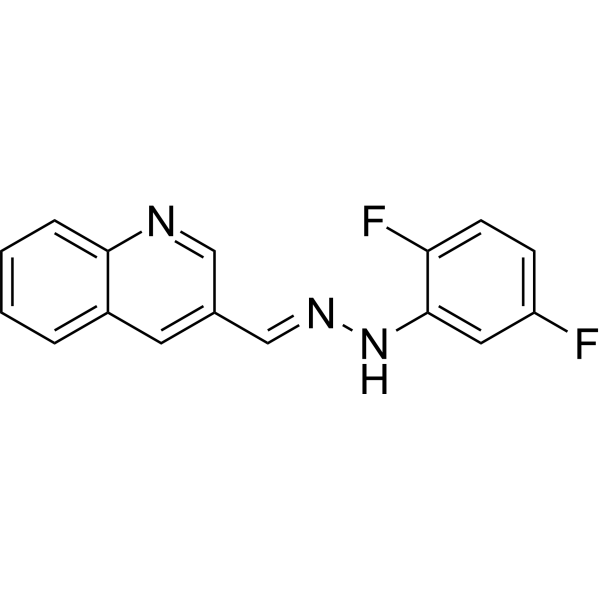
- HY-N11438
-
|
|
Estrogen Receptor/ERR
|
Cancer
|
|
3'-Hydroxymirificin (compound 3) is a naural compound that can be isolated from Pueraria lobata roots. 3'-Hydroxymirificin (compound 3) possesses estrogenic activity and anti-proliferation of MCF-7 human breast carcinoma cells .
|
-
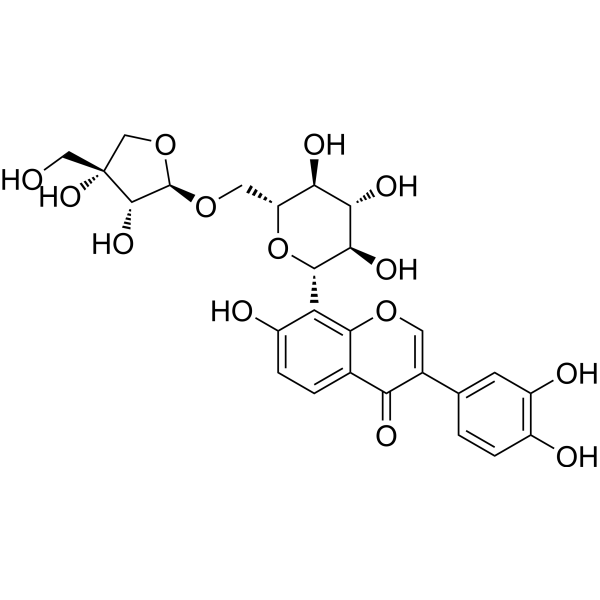
- HY-N3316
-
|
|
Others
|
|
|
Martynoside protects ex vivo bone marrow cells from 5-fluorouracil (5-FU)-induced cell death and inflammation response by down-regulating the TNF signaling pathway .Martynoside is a potent antiestrogen in MCF-7 cells, increasing IGFBP3 levels
|
-
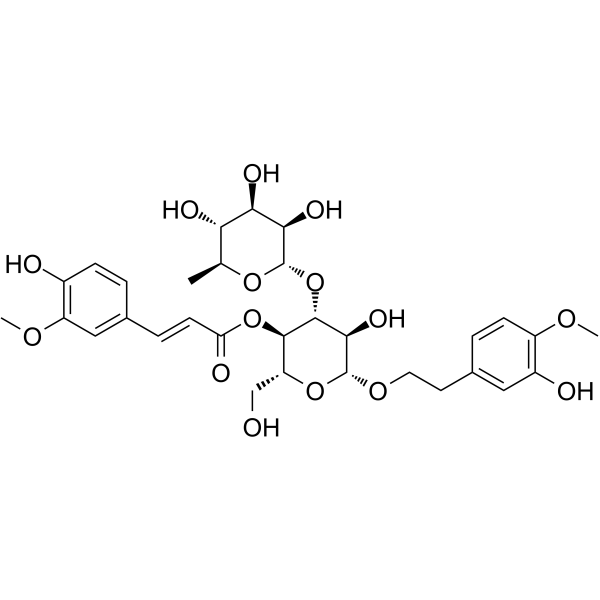
- HY-144792
-
|
|
Bcl-2 Family
MDM-2/p53
Caspase
Apoptosis
|
Cancer
|
|
Bcl-2-IN-7 (compound 6) is a potent Bcl-2 (B-cell lymphoma-2) inhibitor. Bcl-2-IN-7 down-regulates the expression of Bcl-2, and increases the expression of p53, Bax, and caspase-7 mRNA. Bcl-2-IN-7 induces cell cycle arrest and apoptosis in breast cancer MCF-7 cells. Bcl-2-IN-7 shows good anticancer activity, with IC50 values of 20.17, 22.64, 45.57, and 51.50 μM against MCF-7, LoVo, HepG2, and A549 cell lines, respectively .
|
-
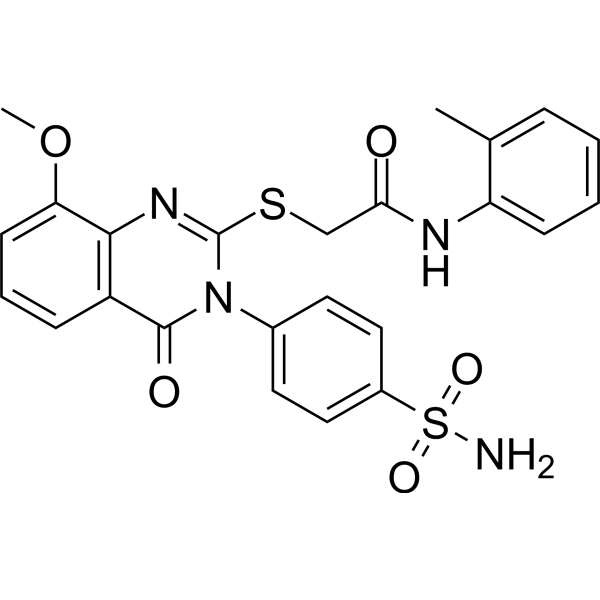
- HY-144791
-
|
|
Bcl-2 Family
MDM-2/p53
Caspase
Apoptosis
|
Cancer
|
|
Bcl-2-IN-6 (compound 10) is a potent Bcl-2 (B-cell lymphoma-2) inhibitor. Bcl-2-IN-7 down-regulates the expression of Bcl-2, and increases the expression of p53, Bax, and caspase-7 mRNA. Bcl-2-IN-7 induces cell cycle arrest and apoptosis in breast cancer MCF-7 cells. Bcl-2-IN-7 shows good anticancer activity, with IC50 values of 20.91, 22.30, 42.29, and 48.00 μM against MCF-7, LoVo, HepG2, and A549 cell lines, respectively .
|
-
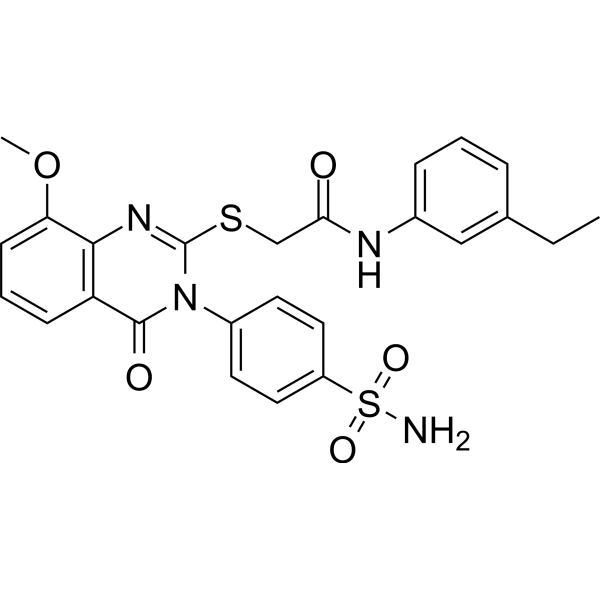
- HY-13734
-
|
IV-2
|
Others
|
Cancer
|
|
PX-12(IV-2) is an irreversible inhibitor of Thioredoxin-1 (Trx-1); inhibits the growth of MCF-7 and HT-29 cells with IC50 values of 1.9 and 2.9 μM, respectively.
|
-
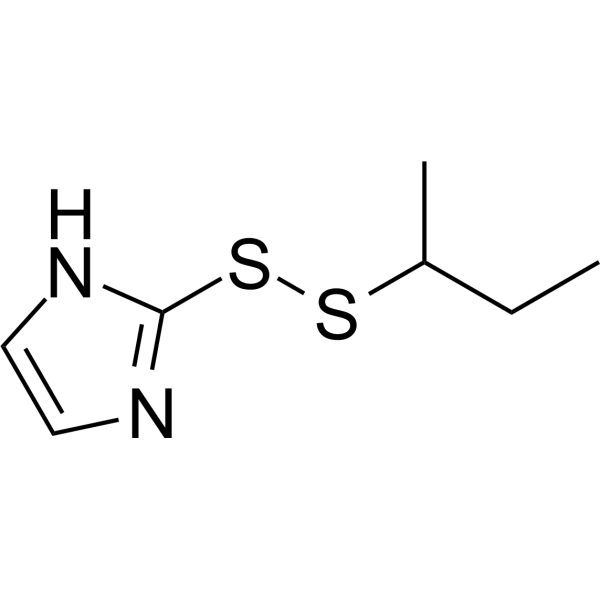
- HY-N3261
-
|
|
AP-1
ERK
STAT
|
Inflammation/Immunology
Cancer
|
|
Methyllinderone is an inhibitor of AP-1/STAT/ERK. Methyllinderone has anti-inflammatory effect. Methyllinderone reduce the invasion and migration rate of TPA-stimulated MCF-7 cells. Methyllinderone can be used in study breast cancer metastasis .
|
-
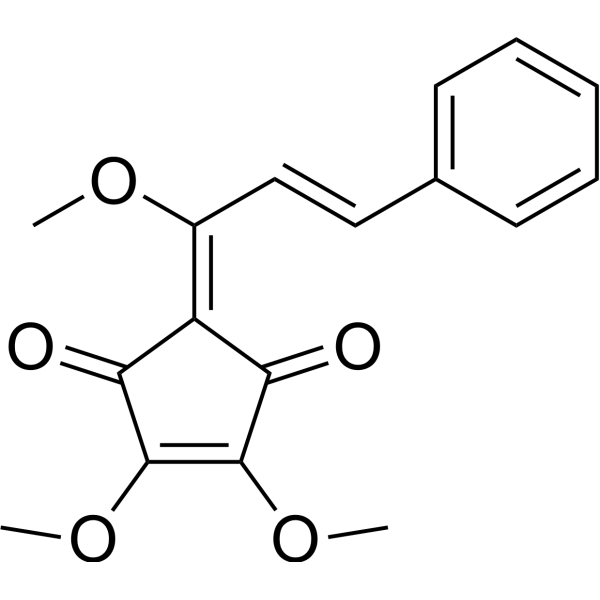
- HY-N11919
-
|
|
Others
|
Cancer
|
|
Anticancer agent 149 (compound 3) is an anticancer agent isolated from the rhizome of Dioscorea dioscorea (DM). Anticancer agent 149 exhibits selective cytotoxic activity against MCF-7 cells (IC50=31.41 μM) .
|
-
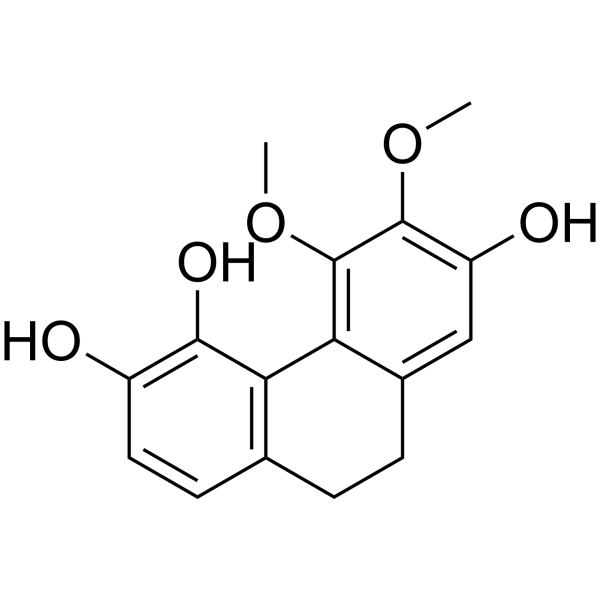
- HY-N7302
-
|
|
Others
|
Cancer
|
|
Anthracophyllone is an aristolane sesquiterpene that can be isolated from the mushroom Anthracophyllum. Anthracophyllone has cytotoxicity against MCF-7, KB, NCI-H187, Vero cells (IC50: 32.97, 18.02, 15.17, 18.06 μM) .
|
-
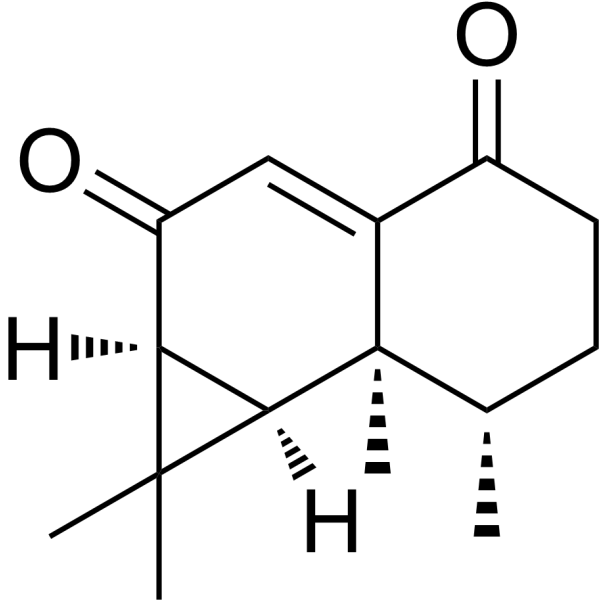
- HY-153697
-
|
|
FAK
|
Cancer
|
|
FAK-IN-10 is an inhibitor of FAK with an IC50 of 76.3 μM. FAK-IN-10 exhibits antitumor activity against MCF-7 and A431 cell lines with IC50s of 4.23 and 0.78 μM,respectively .
|
-
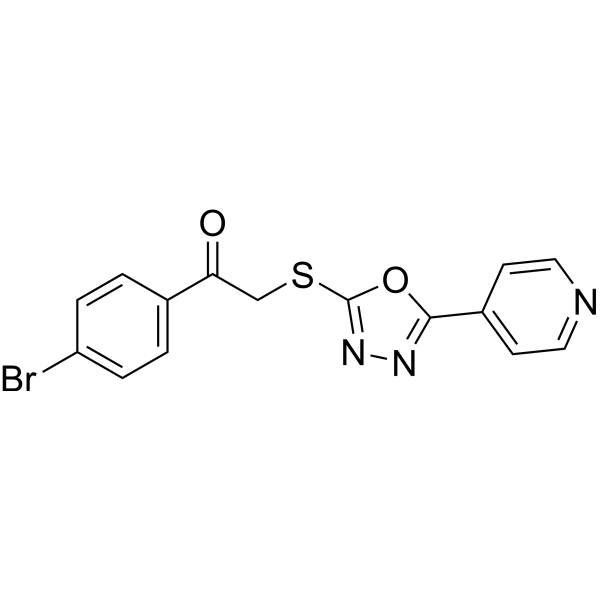
- HY-121149
-
|
3-Hydroxytamoxifen
|
Estrogen Receptor/ERR
Apoptosis
|
Cancer
|
|
Droloxifene, a Tamoxifen derivative, is an orally active and selective estrogen receptor modulator. Droloxifene shows antiestrogenic and anti-implantation effects. Droloxifene induces p53 expression and apoptosis in MCF-7 cells. Droloxifene prevents bone loss in ovariectomized rats .
|
-
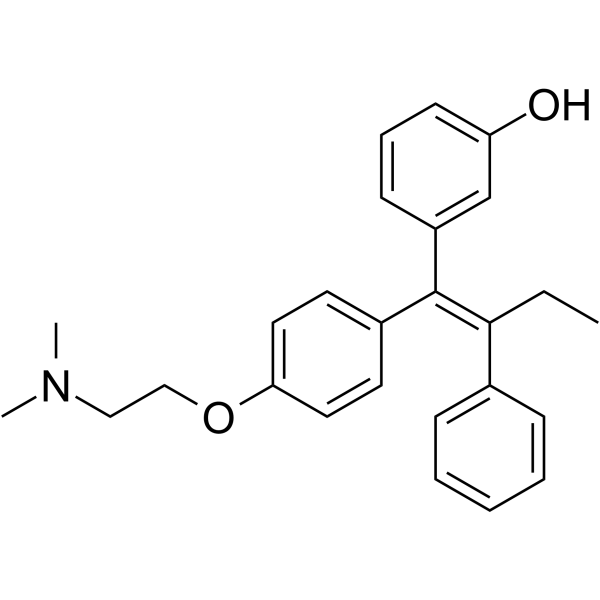
- HY-N3000
-
|
|
Others
|
Cancer
|
|
6-Methoxydihydrosanguinarine is an lkaloid isolated from the fruits of M.cordata. 6-Methoxydihydrosanguinarine shows strong cytotoxicity against MCF-7 and SF-268 cell lines with IC50 values of 0.61 μM and 0.54 μM, respectively .
|
-
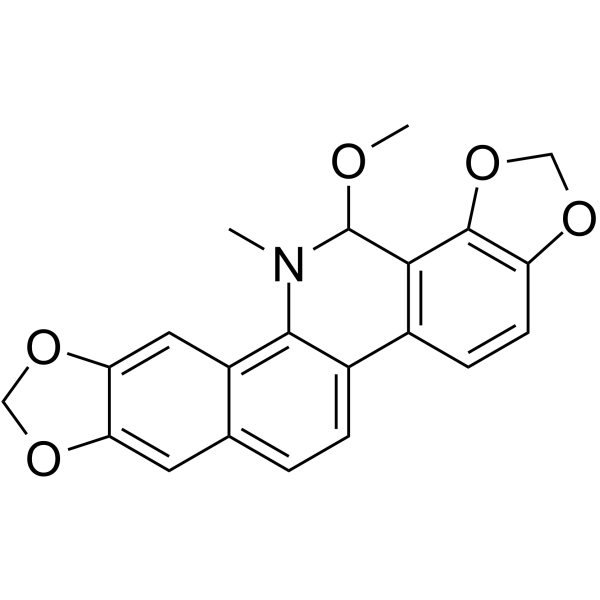
- HY-N10959
-
|
|
Others
|
Cancer
|
|
4,15-Isoatriplicolide methylacrylate is a germacrane-type sesquiterpene lactone. 4,15-Isoatriplicolide methylacrylate also is a cytotoxic agent. 4,15-Isoatriplicolide methylacrylate has cytotoxic activity for MCF-7 human breast cancer cell line .
|
-
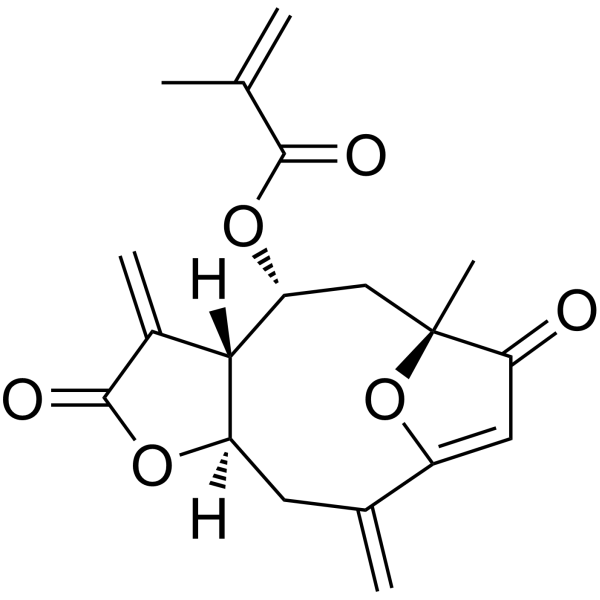
- HY-N10351
-
|
|
Apoptosis
|
Cancer
|
|
27-O-(tert-Butyldimethylsilyl)withaferin A (compound 9a), a natural withanolide, is an apoptosis inducer. 27-O-(tert-Butyldimethylsilyl)withaferin A shows antiproliferative activity against HeLa, A-549 and MCF-7 human cancer cell lines, and against normal Vero cells .
|
-
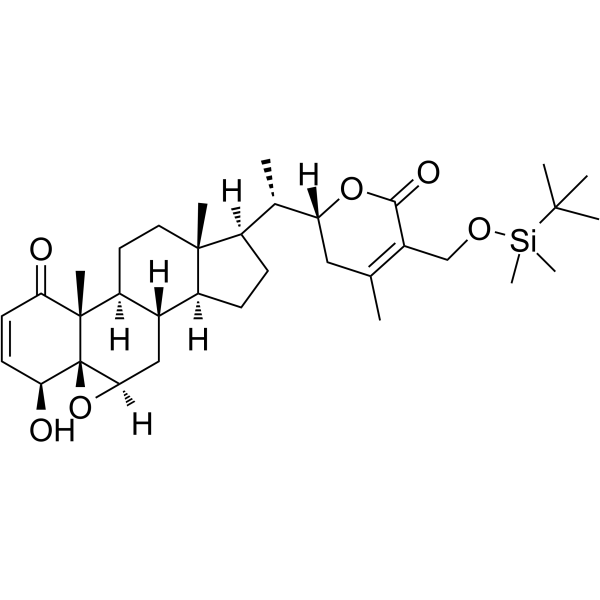
- HY-144733
-
|
|
Estrogen Receptor/ERR
Apoptosis
|
Cancer
|
|
ERα antagonist 1 (Compound 19d) is a potent, selective, covalent estrogen receptor α (ERα) antagonist. ERα antagonist 1 induces apoptosis and cell cycle G0/G1 phase arrest in MCF-7 cells .
|
-
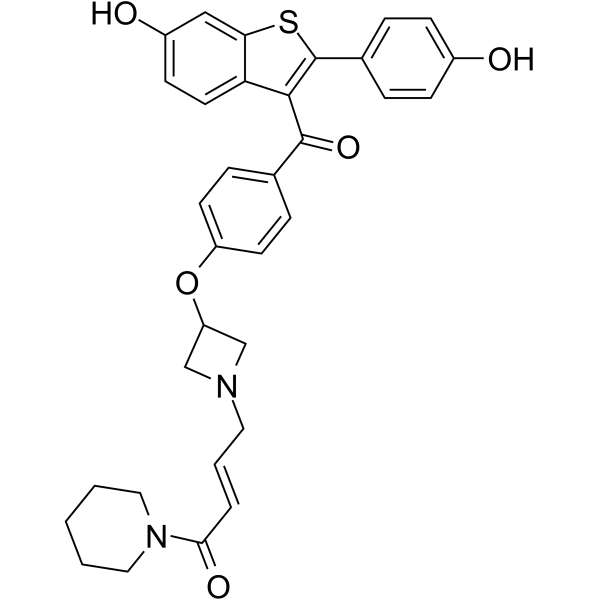
- HY-135309
-
|
|
PROTACs
Estrogen Receptor/ERR
|
Cancer
|
|
PROTAC ER Degrader-4 is a von Hippel-Lindau-based PROATC estrogen receptor (ER) degrader, binding to ER with an IC50 of 0.8 nM. PROTAC ER Degrader-4 induces ER degradation in MCF-7 cells with an IC50 of 0.3 nM .
|
-
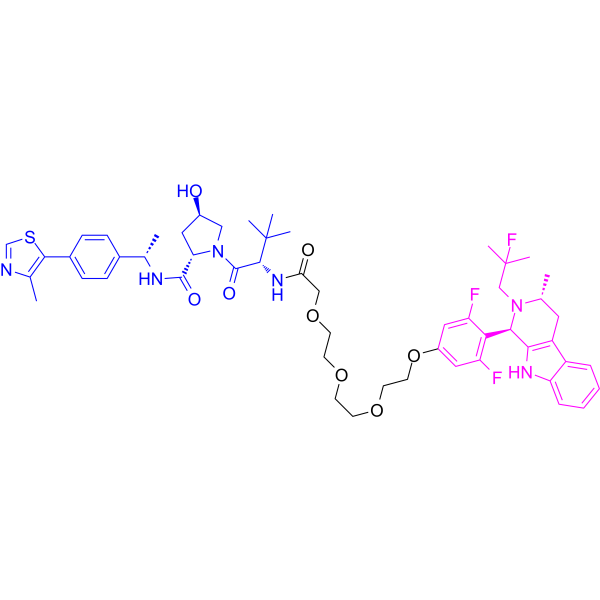
- HY-144337
-
|
|
DNA Alkylator/Crosslinker
|
Cancer
|
|
DNA crosslinker 4 (dihydrochloride) is a potent DNA minor groove binder. DNA crosslinker 4 (dihydrochloride) has certain inhibitory activity against cancer cells NCI-H460, A2780 and MCF-7. DNA crosslinker 4 (dihydrochloride) can be used for researching anticancer .
|
-
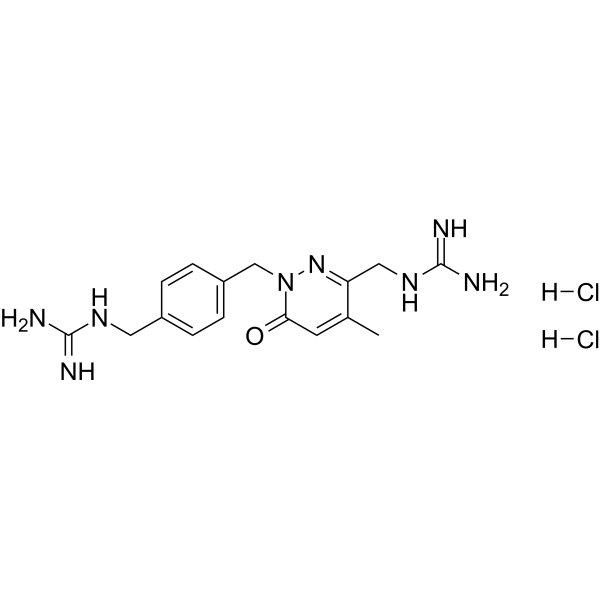
- HY-13847
-
|
|
mTOR
|
Cancer
|
|
GNE-555 is a selective, metabolically stable mTOR inhibitor (Ki=1.5 nM) that also has good oral bioavailability. GNE-555 exhibits antiproliferative activity on PC3 and MCF-7 cells and can be used in cancer research .
|
-
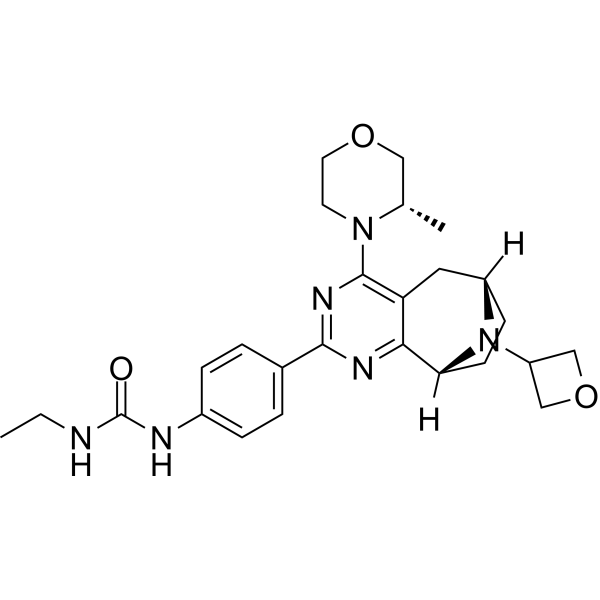
- HY-N1252
-
|
|
|
|
|
Scillascillin (compound 10) is a homoisoflavanone. Scillascillin can be isolated from S. scilloides. Scillascillin shows anticancer activity towards MCF-7 (breast cancer) and DU-145 (prostate cancer) cells with the IC50 of 9.59 and 11.32 ug/ml, respectively .
|
-
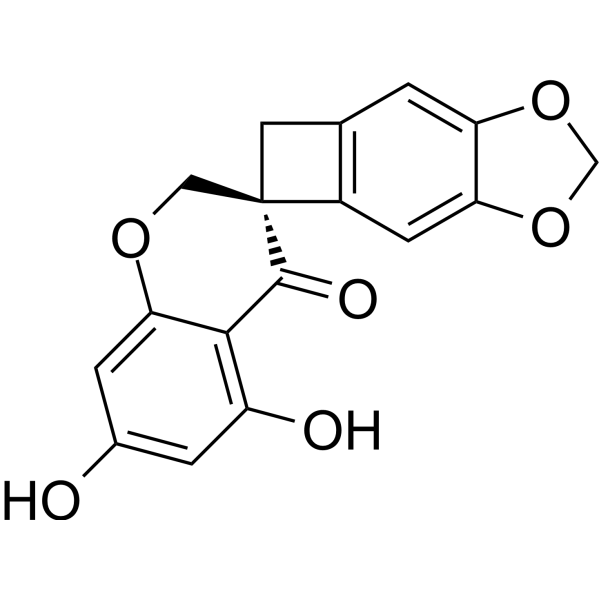
- HY-144314
-
|
|
Estrogen Receptor/ERR
|
Cancer
|
|
PSDalpha is an ERα degrader conjugating photosensitizer (PS), triphenylamine benzothiadiazole (TB) and 17β-estradiol via an acetylene bond. PSDalpha shows excellent anti-proliferation performance on MCF-7 cells. The maximum absorption wavelength of PSDalpha in the visible region is located at 465 nm .
|
-
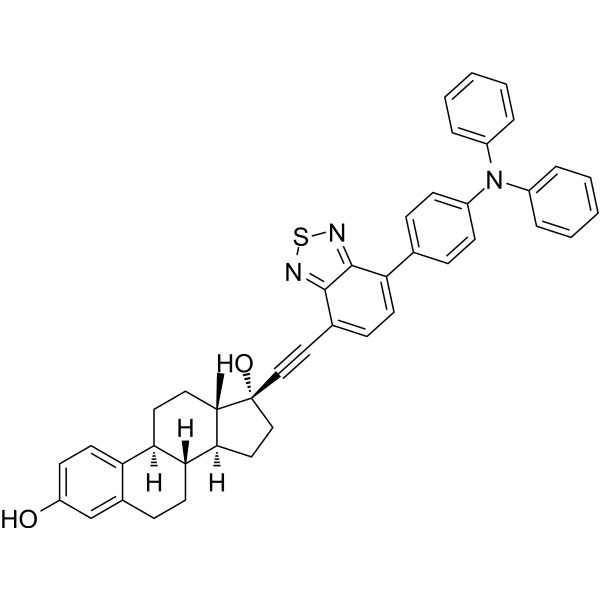
- HY-161146
-
|
|
EGFR
Apoptosis
|
Cancer
|
|
EGFR-IN-100 (compound 3f) is a EGFR inhibitor with IC50 range of 0.137-0.507 μM. EGFR-IN-100 has antiproliferative activity and induces the apoptosis pathway. EGFR-IN-100 arrests the MCF-7 cell cycle at the S phase .
|
-
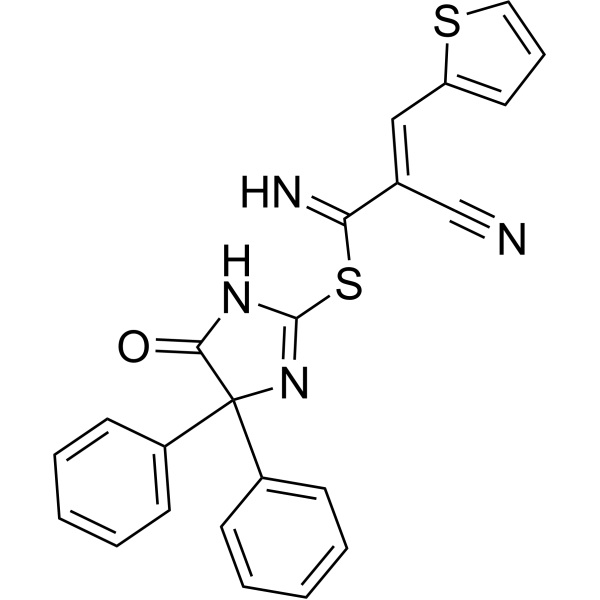
- HY-114310
-
|
|
VD/VDR
Apoptosis
|
Cancer
|
|
VDR agonist 1 (compound 28) is a nonsteroidal Vitamin D receptor (VDR) agonist, with an IC50 of 690 nM in MCF-7 cells. VDR agonist 1 arrests the cell cycle through the up-regulation of p21 and p27, promotes apoptosis by increasing the expression of BAX and decrease the expression of Bcl-2 .
|
-
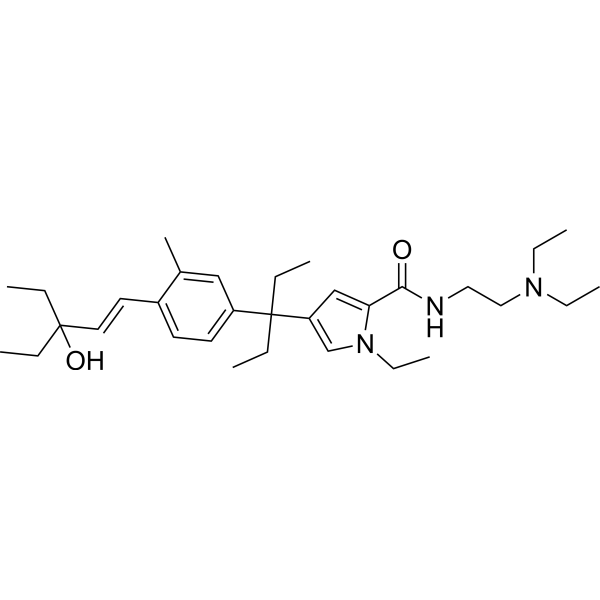
- HY-N2298
-
|
|
|
|
|
Camellianin A, the main flavonoid in A. nitida leaves, displays anticancer activity and angiotensin converting enzyme (ACE)-inhibitory activity. Camellianin A inhibits the proliferation of the human Hep G2 and MCF-7 cell lines and induces the significant increase of the G0/G1 cell population .
|
-
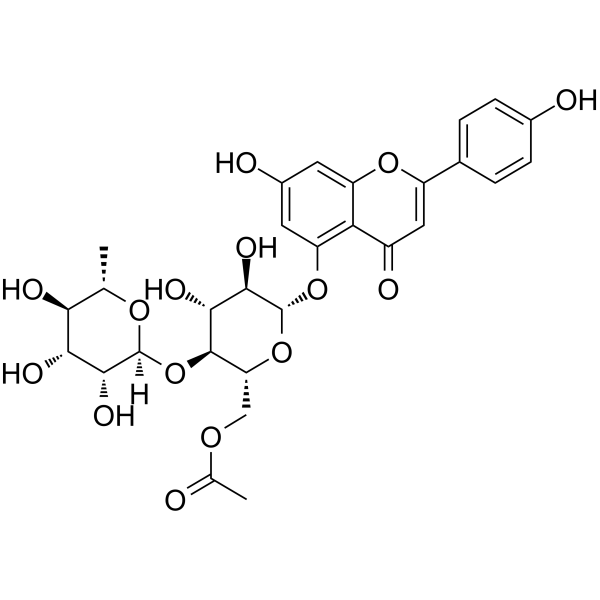
- HY-155969
-
|
|
EGFR
Apoptosis
|
Cancer
|
|
EGFR-IN-83 (Compound 9) is an EGFR inhibitor (IC50: 2.53 nM). EGFR-IN-83 has antiproliferative activity against MCF-7 and MDA-MB-231 cells, with IC50 of 2.50 μM and 1.96 μM. EGFR-IN-83 can induce cell apoptosis .
|
-
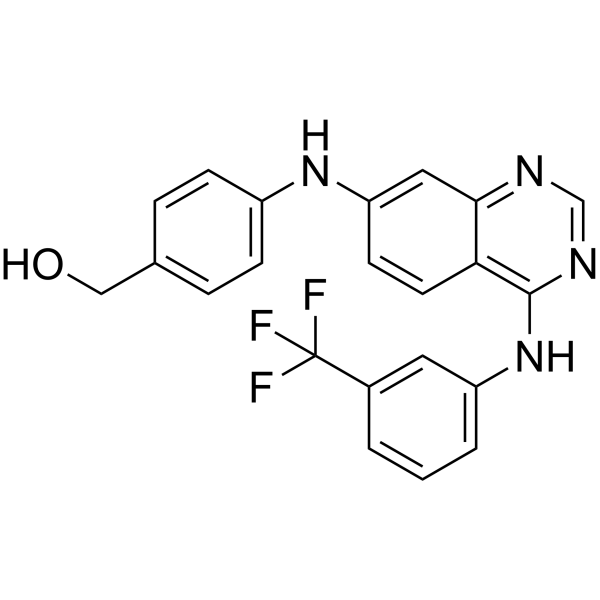
- HY-155348
-
|
|
PARP
|
Cancer
|
|
Ru3 is a poly(ADP-ribose) polymerase 1 inhibitor. Ru3 induces apoptosisin MCF-7 cells by multiple modes, inclusive of inducing DNA damage, suppressing DNA damage repair, disturbing cell cycle distribution, decreasing the mitochondrial membrane potential, and increasing the intracellular reactive oxygen species levels .
|
-
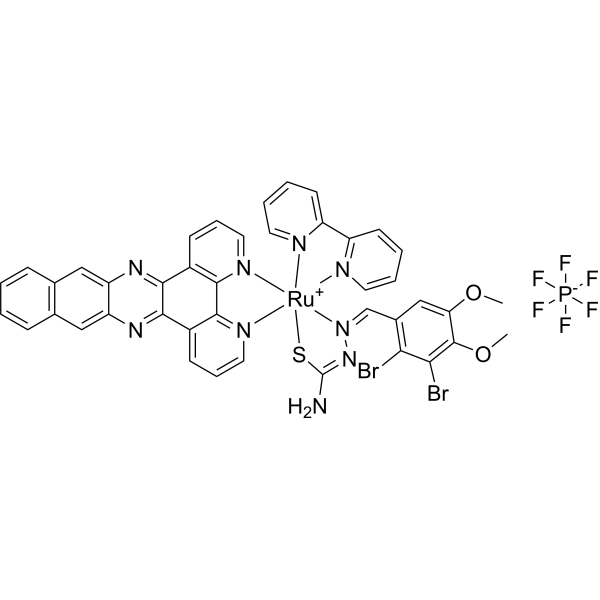
- HY-N6885
-
|
|
Others
|
Cancer
|
|
Puerarin-4'-O-β-D-glucopyranoside (compound 8) is a isoflavone from Pueraria lobata root (PLR). Puerarin-4'-O-β-D-glucopyranoside has estrogenic activity and anti-proliferation of MCF-7 human breast carcinoma cells .
|
-
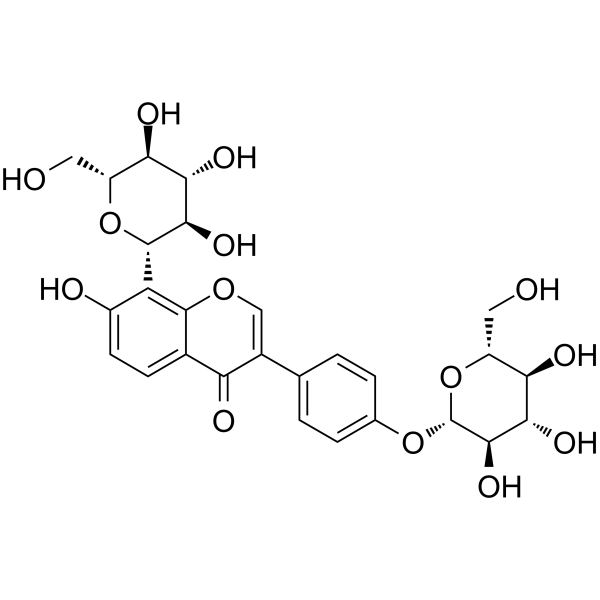
- HY-146988
-
|
|
Carbonic Anhydrase
Apoptosis
|
Cancer
|
|
hCAIX/XII-IN-1 is a potent CAIX/XII inhibitor with the KI values of 0.48 µM and 0.83 µM for CAIX and CAXII, respectively. hCAIX/XII-IN-1 shows antiproliferative activity in vitro. hCAIX/XII-IN-1 induces apoptosis in MCF-7 cells .
|
-
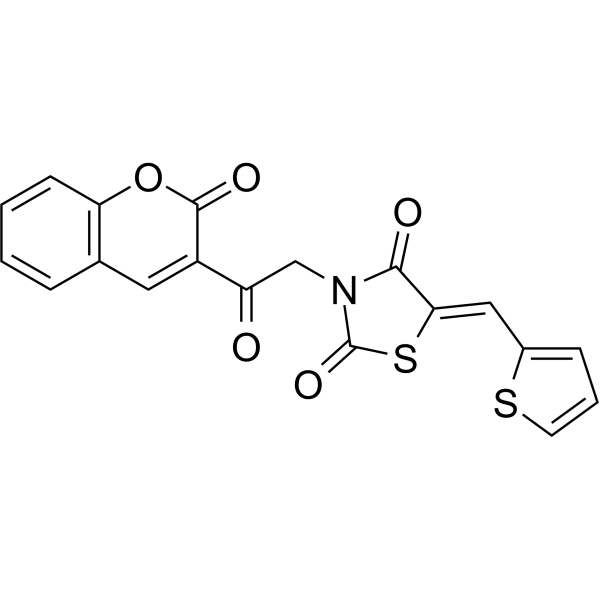
- HY-N3615
-
|
|
Others
|
Cancer
|
|
Confluentin can be isolated from Rhododendron dauricum. Confluentin shows weak cytotoxicity against human tumor cells (IC50: 15.05, 17.08, 18.48, and 23.01 μM for HL-60, SMMC-7712, A-549, and MCF-7) .
|
-
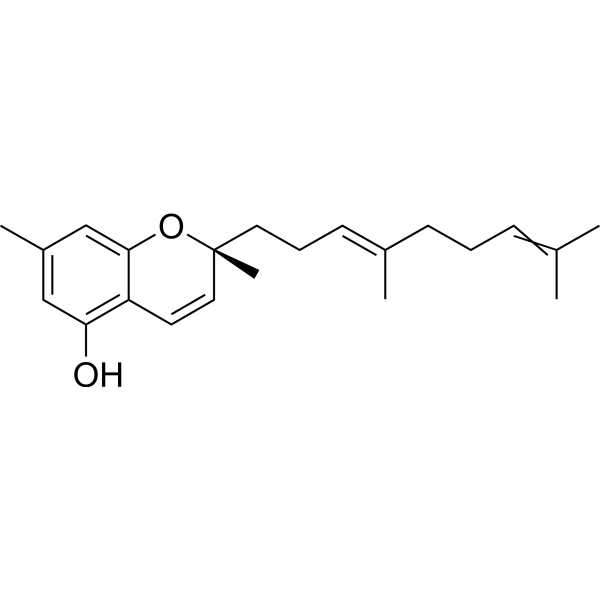
- HY-156378
-
|
|
Aurora Kinase
|
Cancer
|
|
Aurora A inhibitor 3 (Compound 5h) inhibits Aurora-A kinase with an IC50 value of 0.78 μM. Aurora A inhibitor 3 is cytotoxic, with GI50 values of 0.12 μM and 0.63 μM for MCF-7 and MDA-MB-231 cells, respectively .
|
-
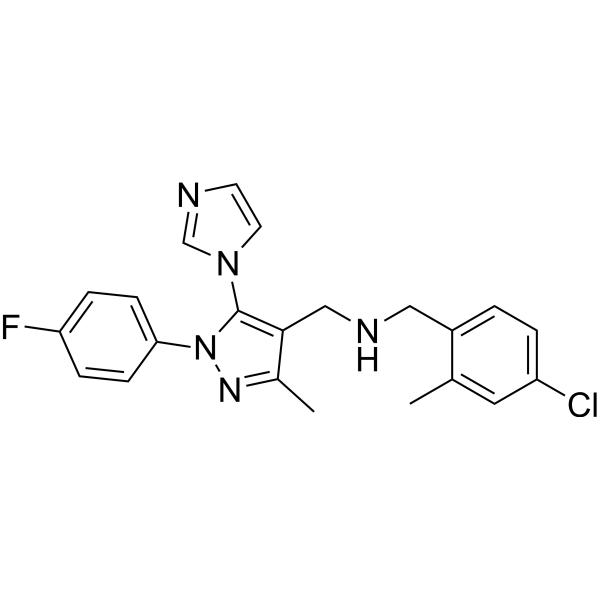
- HY-W179181
-
|
|
GLUT
|
Metabolic Disease
|
|
MSNBA is a specific inhibitor of GLUT5 fructose transport in proteoliposomes. MSNBA competitively inhibits GLUT5 fructose uptake with a KI of 3.2±0.4?μM in MCF7 cells .
|
-
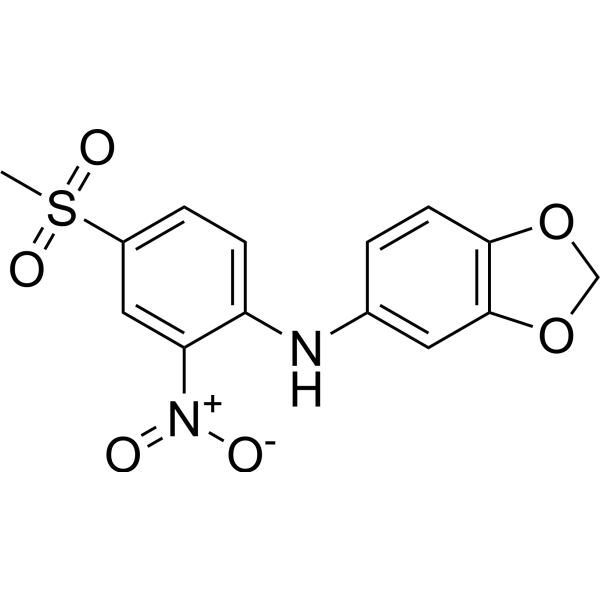
- HY-152774
-
|
|
Akt
PI3K
|
Cancer
|
|
Antitumor agent-86 (compound 5a) inhibits MCF-7 breast cancer cells with an IC50 value of 2.62 µM. Antitumor agent-86 induces cell apoptosis and cell cycle arrest, and shows antineoplastic activity by targeting RAS/PI3K/Akt/JNK signaling cascades .
|
-
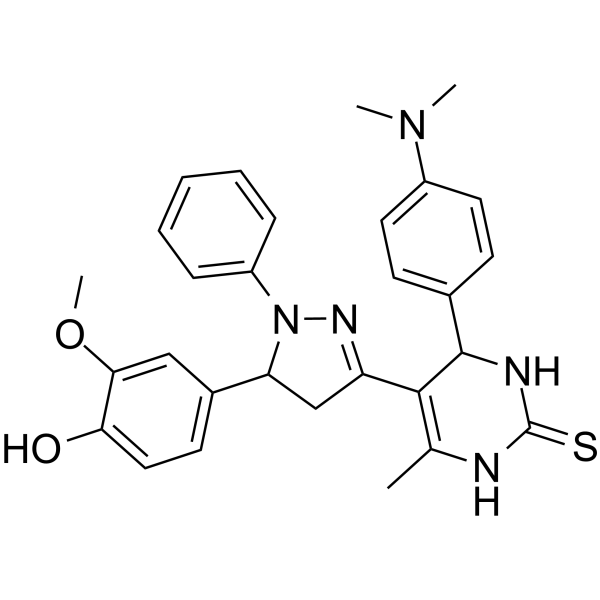
- HY-18351
-
|
LMP-400; NSC-724998
|
Topoisomerase
|
Infection
Cancer
|
|
Indotecan (LMP-400), an indenoisoquinoline derivative, is a potent Topoisomerase I inhibitor, with IC50s of 300, 1200, 560 nM for P388, HCT116, MCF-7 cell lines, respectively. Indotecan prevents the relaxation of supercoiled DNA and can be used for the research of visceral leishmaniasis .
|
-
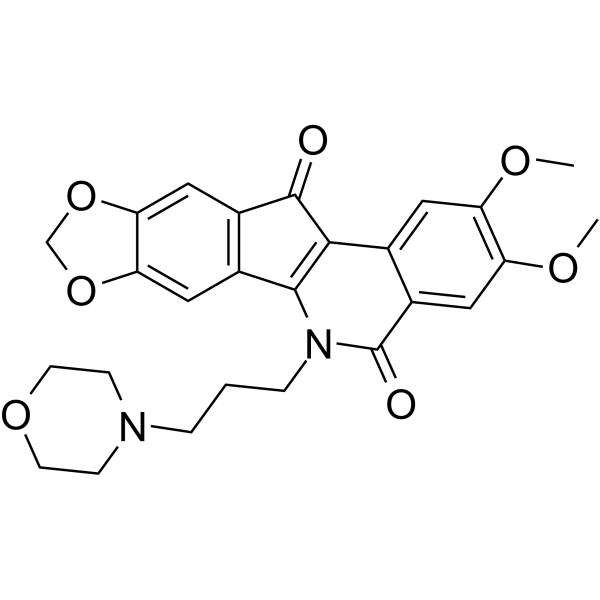
- HY-147788
-
|
|
Dihydroorotate Dehydrogenase
|
Cancer
|
|
hDHODH-IN-9 (Compound 3k) is a potent inhibitor of hDHODH with an IC50 of 0.34 μM. hDHODH-IN-9 demonstrates high cytotoxic activity against MCF-7 and A375 cells and good selectivity. hDHODH-IN-9 has the potential for the research of cancer diseases .
|
-
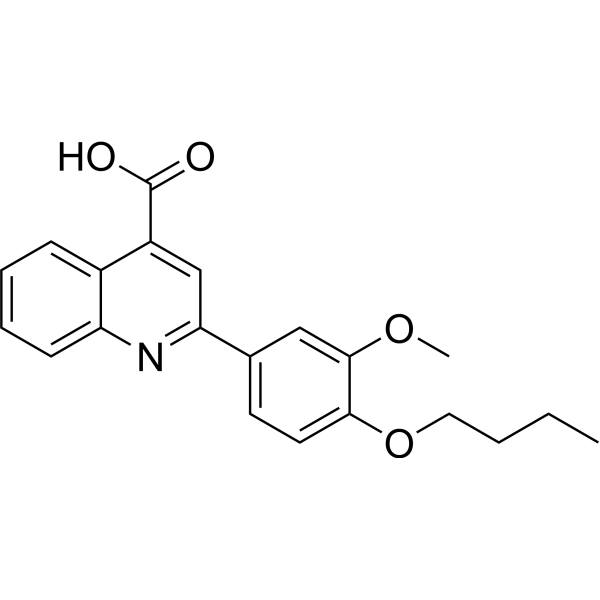
- HY-N11651
-
|
|
Others
|
Others
|
|
Peganumine A is a natural product that can be found in Peganum harmala. Peganumine A shows cytotoxicity with IC50s of5.8, 38.5, 40.2, 55.4 µM for HL-60, MCF-7, PC-3, and HepG2 cells ,respectively .
|
-
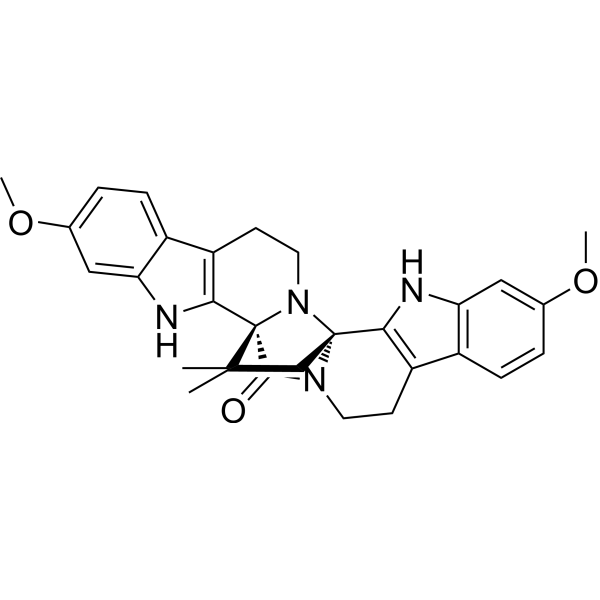
- HY-155239
-
|
|
VEGFR
|
Cancer
|
|
VEGFR-2-IN-35 (compound 7) is a potent VEGFR-2 inhibitor with IC50=37 nM. VEGFR-2-IN-35 inhibits MCF-7 and HCT 116 cancer cells with IC50 values of 10.56 and 7.07 μM, respectively .
|
-
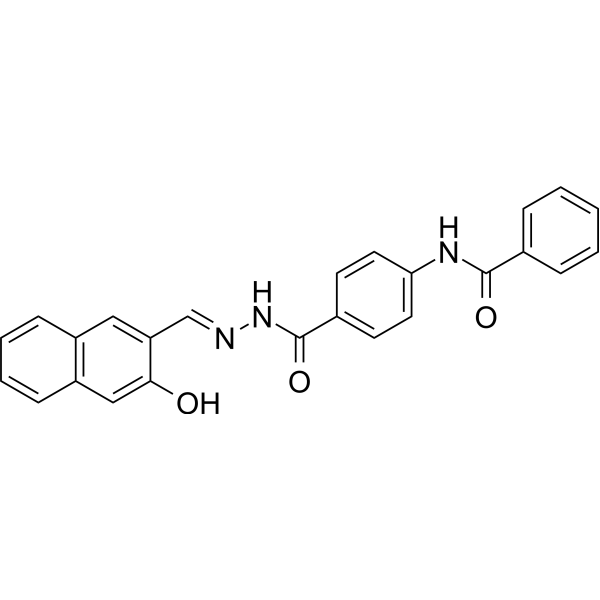
- HY-N12299
-
|
Quercetin 3-O-β-D-glucuronide butyl ester
|
Others
|
Cancer
|
|
Parthenosin (Quercetin 3-O-β-D-glucuronide butyl ester) is a flavonoid, that can be isolated from the aerial parts of Calligoum polygonoides. Parthenosin shows cytotoxic activity against HepG2 and MCF-7 cell lines with IC50 values of 60.46 and 61.4 μg/mL, respectively .
|
-
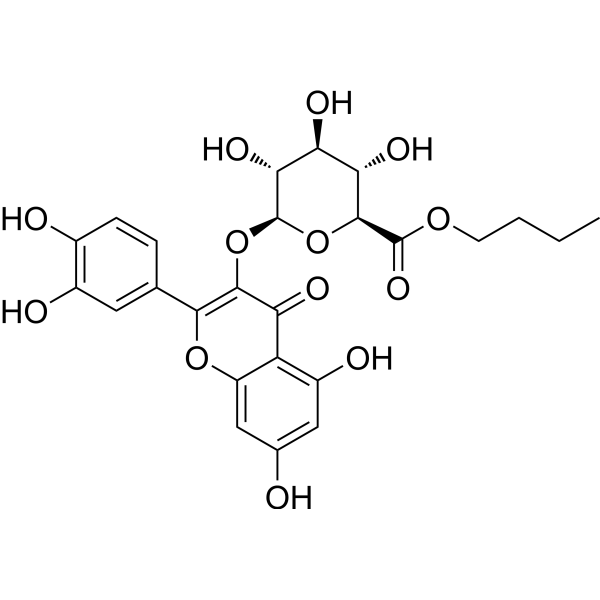
- HY-157402
-
|
|
Topoisomerase
EGFR
|
Cancer
|
|
Topoisomerase II/EGFR-IN-1 is topoisomerase II/EGFR dual inhibitor. Topoisomerase II/EGFR-IN-1 has superior cytotoxic activity to MCF-7, A549 and HCT-116 cell lines, displays strong apoptotic activity and can be used for the research of cancer .
|
-
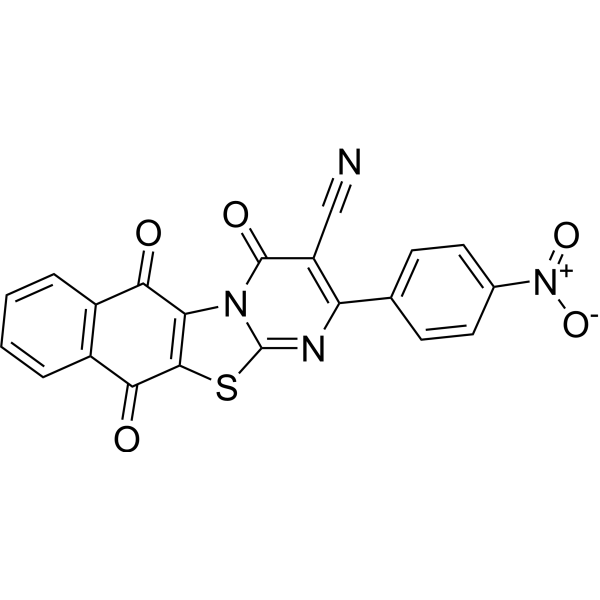
- HY-N12607
-
|
|
Others
|
Cancer
|
|
Garcilatelic acid (Compound 5) is a compound that can be isolated from Garcinia lateriflora. Garcilatelic acid has antiproliferative activity against tumor cell lines (A549, MDA-MB-231, MCF-7, KB and KB-VIN), with IC50 values of 0.5-1.3 μM .
|
-
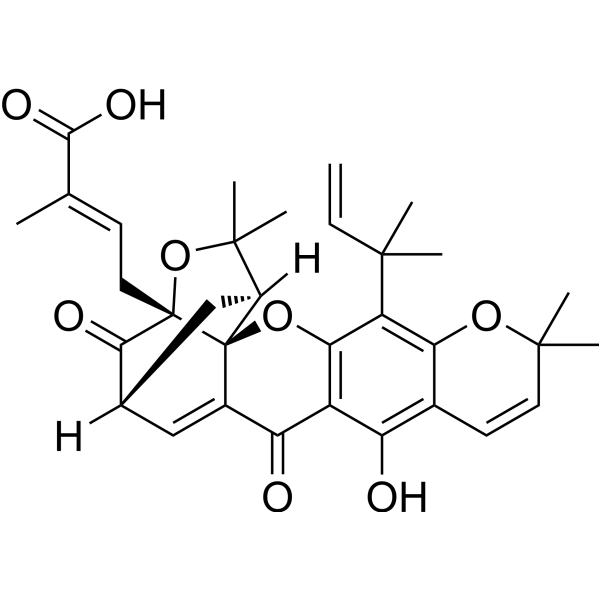
- HY-151624
-
|
|
PARP
Apoptosis
|
Cancer
|
|
PARP-2-IN-2 (compound 27) is a PARP‑2 inhibitor with an IC50 value of 0.057 µM. PARP-2-IN-2 induces cell cycle arrest and apoptosis of MCF-7 breast cancer cells. PARP-2-IN-2 can be used for the research of cancer .
|
-
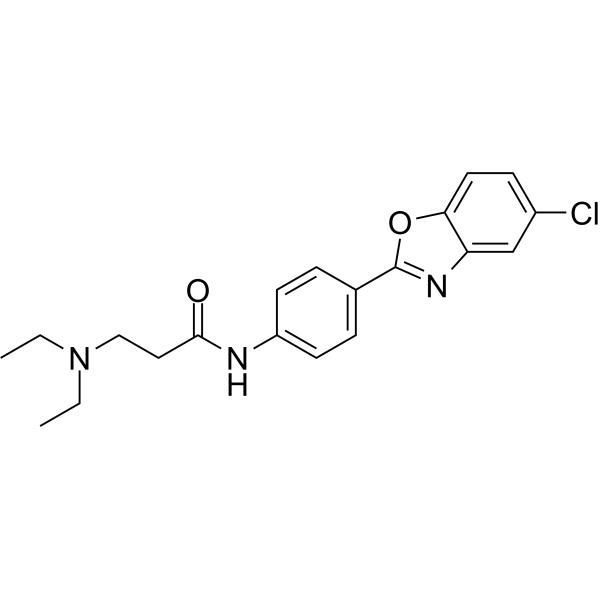
- HY-151564
-
|
|
Others
|
Cancer
|
|
Anticancer agent 85 (compound 6j) is an anticancer agent that shows good cytotoxicity against MCF7 cells. Anticancer agent 85 can be used in breast cancer and other cancer studies .
|
-
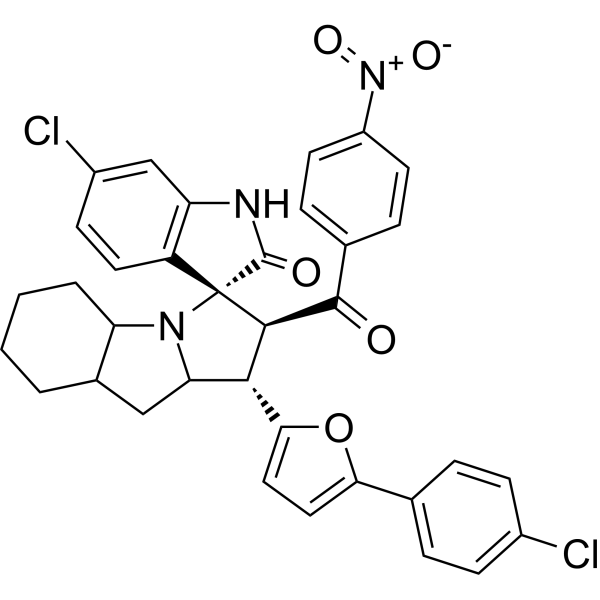
- HY-13636
-
Fulvestrant
Maximum Cited Publications
72 Publications Verification
ICI 182780; ZD 9238; ZM 182780
|
Estrogen Receptor/ERR
Autophagy
Apoptosis
|
Cancer
|
|
Fulvestrant (ICI 182780) is a pure antiestrogen and a potent estrogen receptor (ER) antagonist with an IC50 of 9.4 nM. Fulvestrant is also a GPR30 agonist. Fulvestrant effectively inhibits the growth of ER-positive MCF-7 cells with an IC50 of 0.29 nM. Fulvestrant also induces autophagy and has antitumor efficacy .
|
-
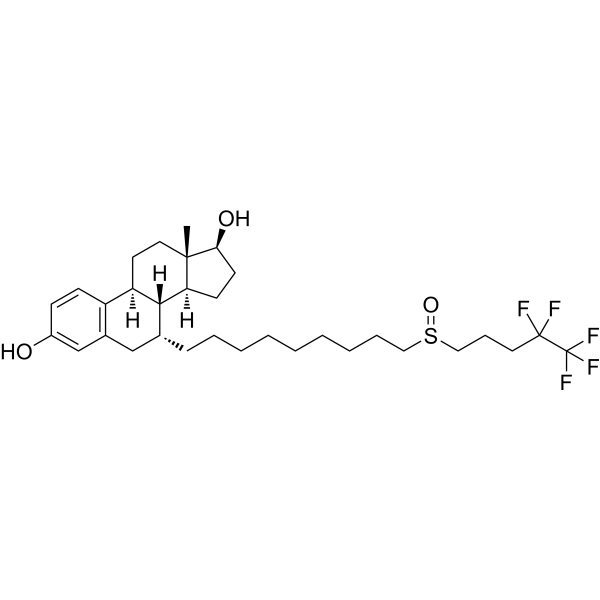
- HY-115994
-
|
|
Carbonic Anhydrase
|
Cancer
|
|
Carbonic anhydrase inhibitor 10 is a potent hCA IX inhibitor with a Ki value of 6.2 nM. Carbonic anhydrase inhibitor 10 exhibits anti-proliferative activity against MCF-7 cancer cell line with an IC50 of 11.9 μM. Carbonic anhydrase inhibitor 10 can be used for cancer research .
|
-
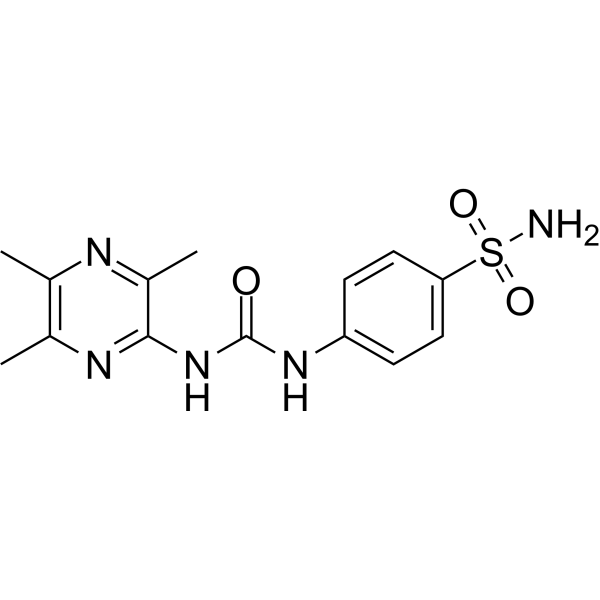
- HY-147888
-
|
|
Microtubule/Tubulin
|
Cancer
|
|
Tubulin inhibitor 29 (compound 3c) is a potent tubulin inhibitor with an IC50 value of 1.2 µM. Tubulin inhibitor 29 shows antiproliferative effects with an IC50 value of 7.5 µM for MCF-7 cells. Tubulin inhibitor 29 inhibits tubulin assembly and bounds in the colchicine site .
|
-
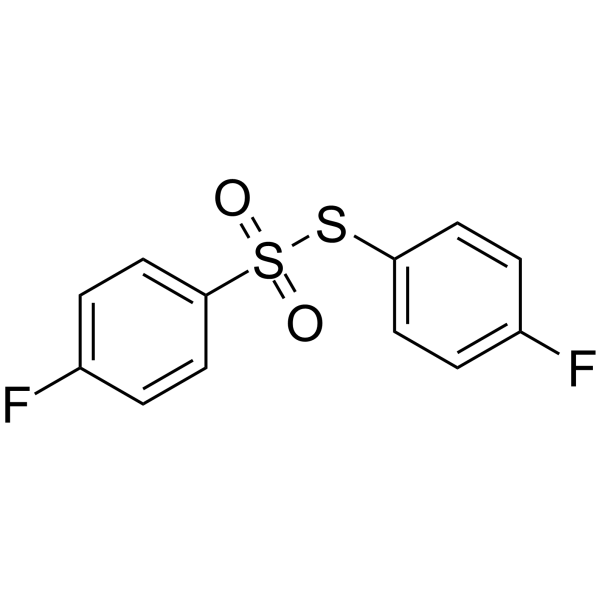
- HY-N10777
-
|
|
Others
|
Cancer
|
|
1-Ketoaethiopinone is an abietane-diterpenoid. 1-Ketoaethiopinone has an α, β-unsaturated carbonyl function. 1-Ketoaethiopinone shows cytotoxic activity against human cancer cell lines MOLT-4 (human lymphoblastic leukemia) and MCF-7 (human breast adenocarcinoma) .
|
-
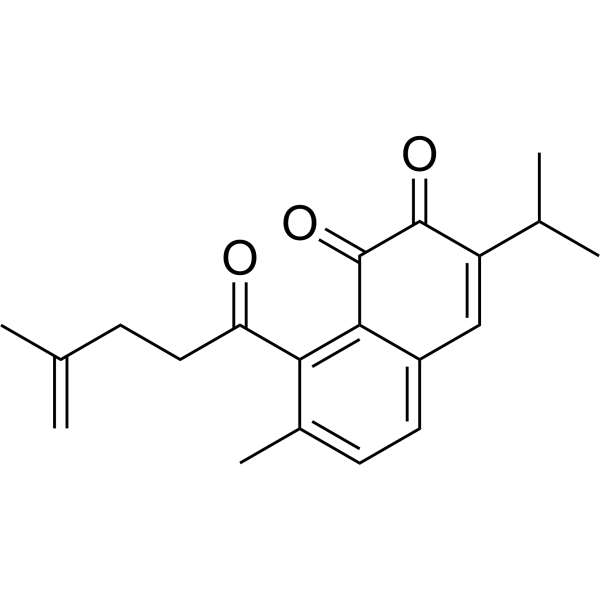
- HY-N11928
-
|
|
Others
|
Cancer
|
|
Changnanic acid (schisandrin) is a triterpene compound with potential anti-tumor effects. Changnanic acid exhibits moderate cytotoxic activity against human tumor cell lines Bel-7402, MCF-7 and HL-60, with IC50s of 100 μM, 100 μM and 50.51 μM respectively .
|
-
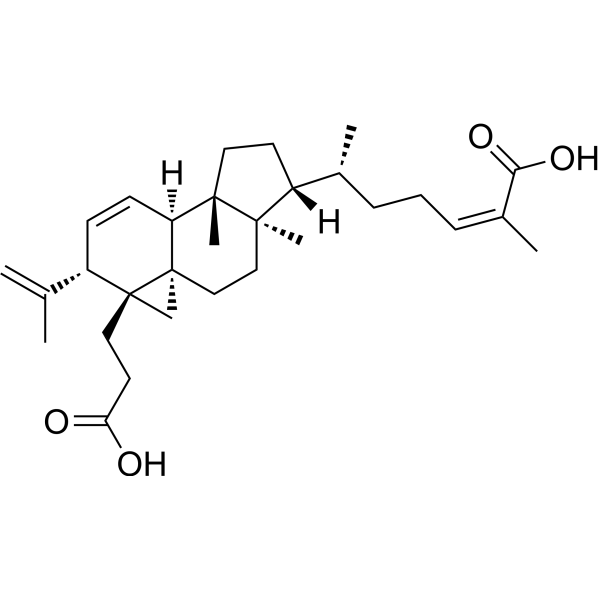
- HY-157487
-
|
|
Others
|
Cancer
|
|
Anticancer agent 185 (compound 9d) is a glycohybrid derivative of pyrazolopyrimidine [1,5-a]. Anticancer agent 185 has good anti-breast cancer activity. Anticancer agent 185 shows good cytotoxic activity against MCF-7 cells with IC50 value of 15.3 μM .
|
-
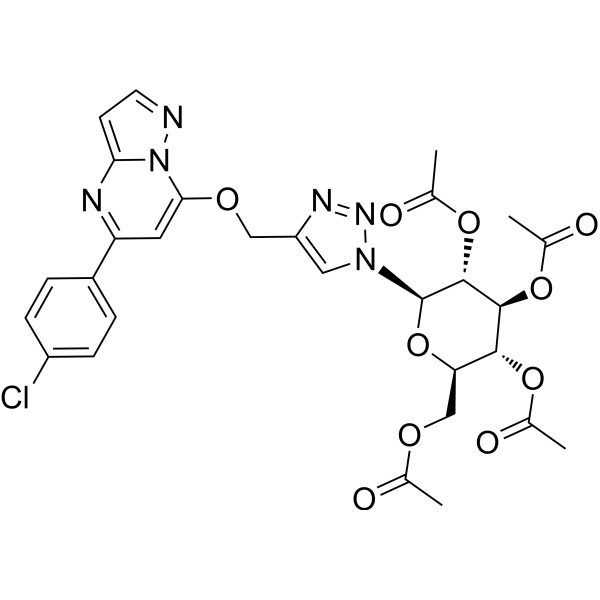
- HY-147913
-
|
|
PI3K
Akt
mTOR
Apoptosis
|
Cancer
|
|
PI3K/Akt/mTOR-IN-3 (compound 3d) is a potent PI3K/AKT/mTOR inhibitor. PI3K/Akt/mTOR-IN-3 displays the inhibitory activity in MCF-7, HeLa and HepG2 cells, with IC50 values of 0.77, 1.23, and 4.57μM, respectively. PI3K/Akt/mTOR-IN-3 inhibits the migration of MCF-7 and HeLa cells at the concentration of 4 μM. PI3K/Akt/mTOR-IN-3 induces cell apoptosis and S phase arrest .
|
-
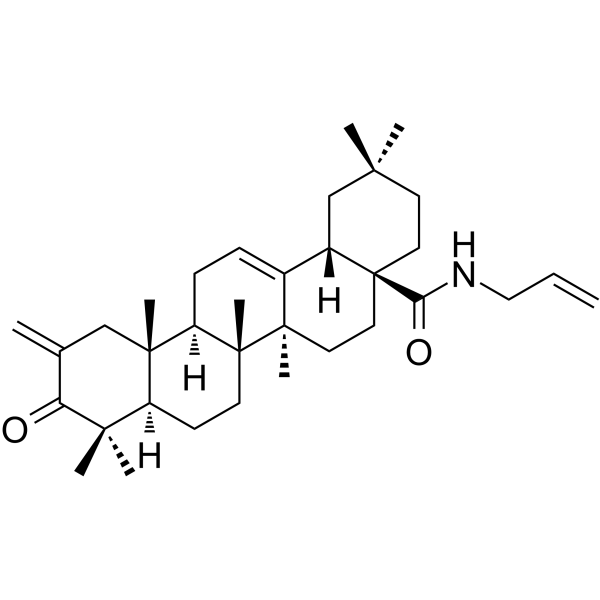
- HY-W317408
-
|
|
Others
|
Others
|
|
(+)-Menthyl acetate is a compound isolated from natural Cunila angustifolia Benth essential oil. The selectivity of (+)-Menthyl acetate is higher than that of MCF-7 cell line, IC50=34.0 μg?mL -1, and lower than that of SK-Mel-28 cell line, IC50=279.9 μg?mL -1, on A549 cell without fatal .
|
-
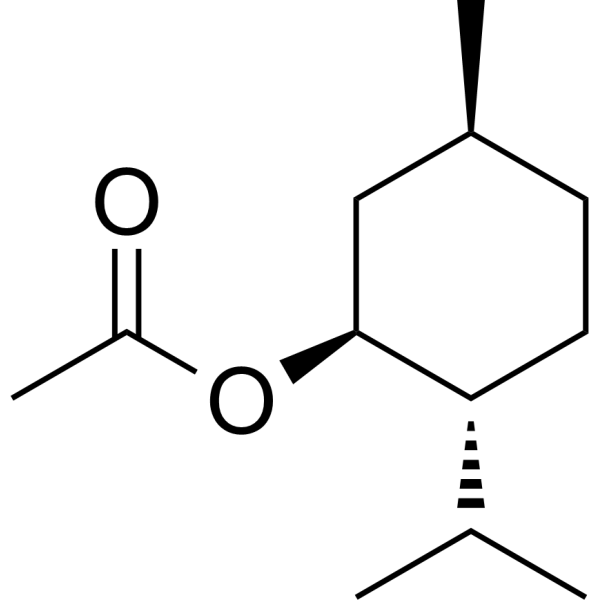
- HY-162227
-
|
|
Microtubule/Tubulin
Apoptosis
|
Cancer
|
|
Antitumor agent-138 (compound 5b) is an inhibitor against tubulin polymerization at tubulin colchicine-binding sites, with IC50 of 1.87 μM. Antitumor agent-138 arrests the cell cycle at G2/M phase and induces an apoptosis in MCF-7 cells. Antitumor agent-138 inhibits cells migration and angiogenesis .
|
-
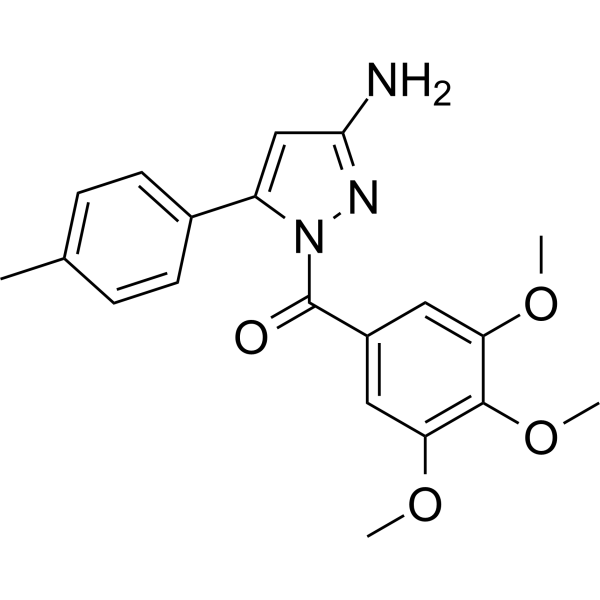
- HY-112811
-
|
|
PROTACs
CDK
|
Cancer
|
|
PROTAC CDK9 degrader-2 (compound 11c) is a potent and selective CDK9 degrader based on PROTAC, with an IC50 of 17 μM in MCF-7 cell lines. Natural product Wogonin (CDK ligand) binds ubiquitin E3 ligase Cereblon (CRBN) via a linker to form PROTAC .
|
-
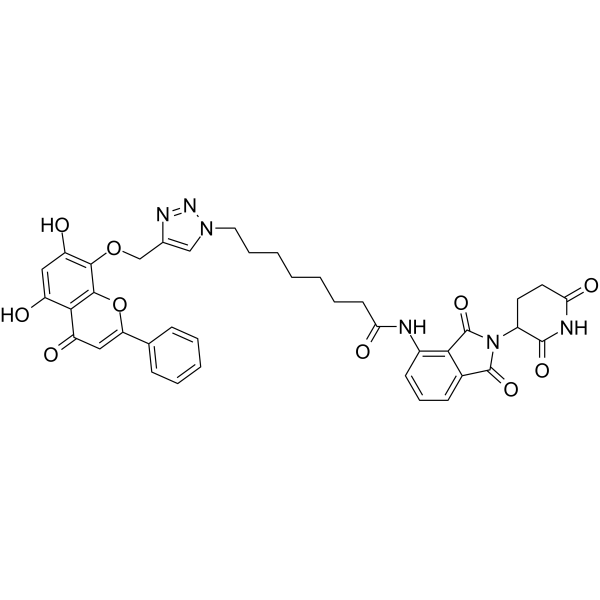
- HY-N1833
-
|
|
|
|
|
3'-Geranyl-3-prenyl-2',4',5,7-tetrahydroxyflavone displays cytotoxicity of 1.32, 3.92 and 5.22 μm against the human cervical carcinoma HeLa, human breast carcinoma MCF-7, and human hepatocarcinoma Hep3B cells .
|
-
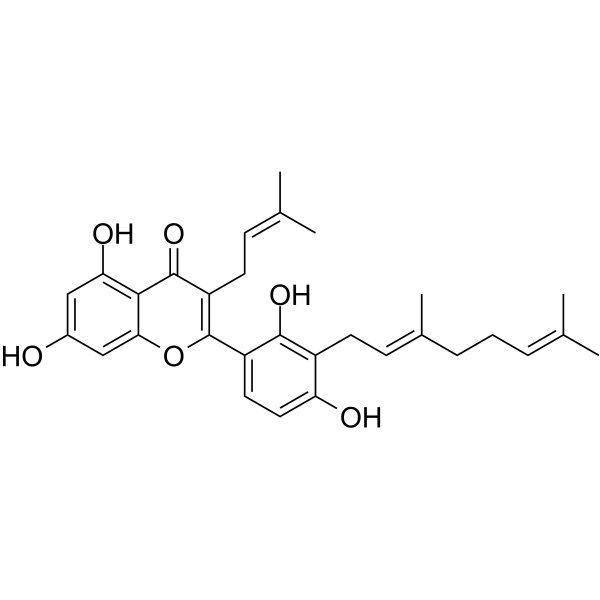
- HY-145379
-
|
|
Parasite
Endogenous Metabolite
|
Infection
|
|
Miaosporone A, an angucyclic quinone, exhibits antimalarial activity against Plasmodium falciparum K1 and antibacterial activity against Mycobacterium tuberculosis with respective IC50 values of 2.5 and 2.4 μM and displays cytotoxic activities against both cancerous (MCF-7 and NCI-H187) and nonmalignant (Vero) cells .
|
-
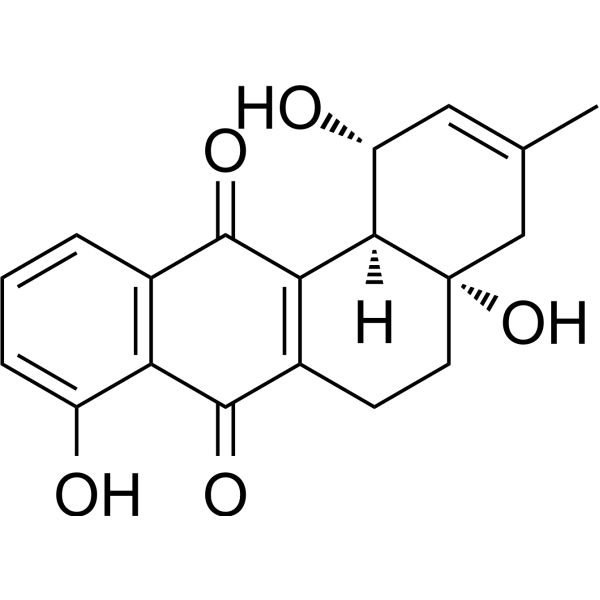
- HY-151519
-
|
|
Sirtuin
|
Cancer
|
|
SIRT2-IN-9 (compound 12) is a selective inhibitor of SRIT2 with an IC50 value of 1.3 μM. SIRT2-IN-9 inhibits proliferative activity of MCF-7 breast cancer cells. SIRT2-IN-9 can be used for the research of cancer .
|
-
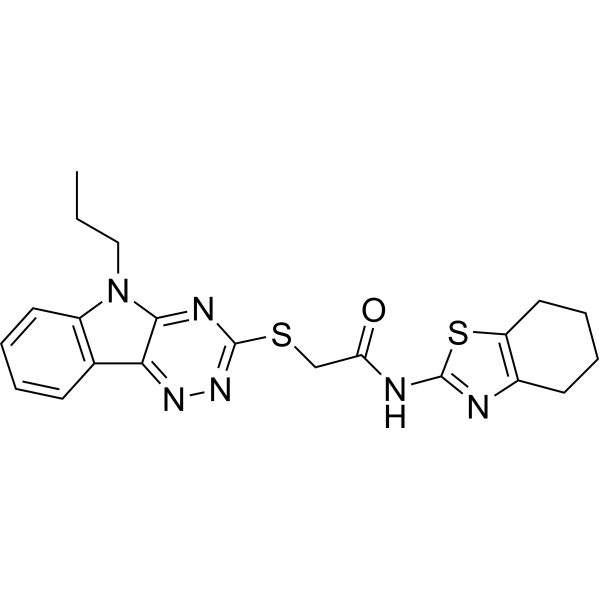
- HY-N10023
-
|
|
NO Synthase
|
Inflammation/Immunology
|
|
Physalin O is a physalin that can be isolated from Physalis angulata. Physalin O shows cytotoxicity to Hep G2 and MCF-7 cancer cells with IC50 values of 31.1 and 11.4 µM, respectively. Physalin O inhibits the production of nitric oxide (NO) and shows anti-inflammatory activities .
|
-
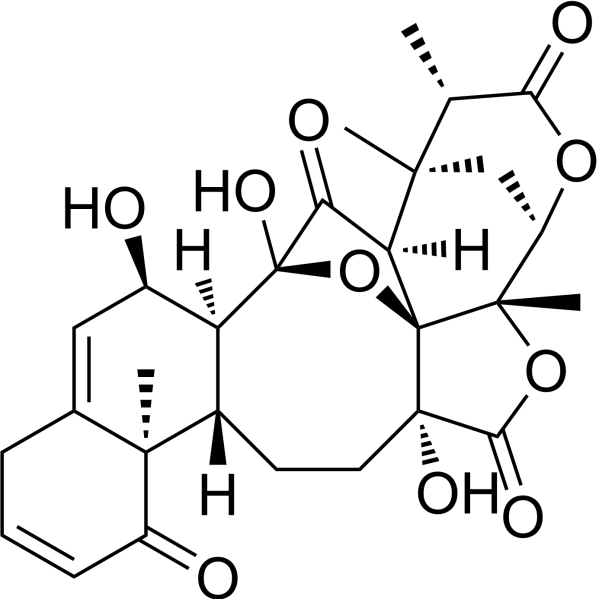
- HY-113319
-
|
|
Endogenous Metabolite
|
Cancer
|
|
β-D-Fructose is a β-fruit sugar that can be produced by the hydrolysis of sucrose. β-D-Fructose can be used as a sweetness potentiator. β-D-Fructose can be designed as a units of antiproliferative agents against breast (MCF-7) and colon (MDST8) cancer cell lines .
|
-
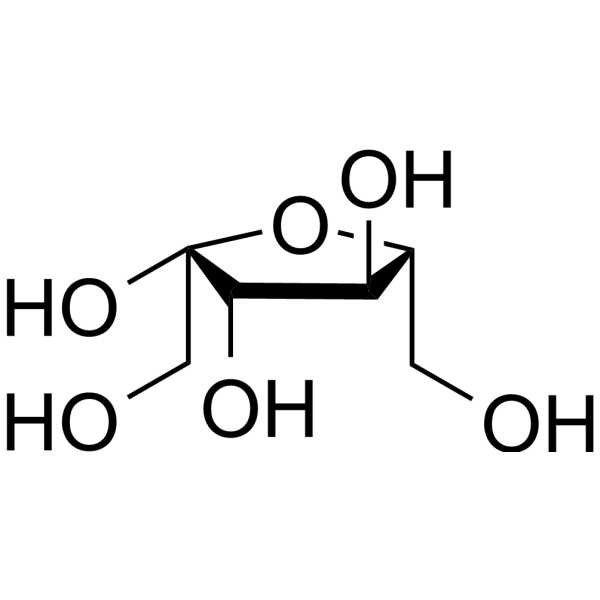
- HY-N9505
-
|
Kadsulactone acid
|
Others
|
Cancer
|
|
Schisanlactone E is a triterpenoids that can be isolated from Kadsura heteroclita. Schisanlactone E exhibits moderate cytotoxic activity against Bel-7402, BGC-823, MCF-7 and HL-60 cell line with IC50s of 68.33, 100, >100, 73.37 μM,respectively .
|
-
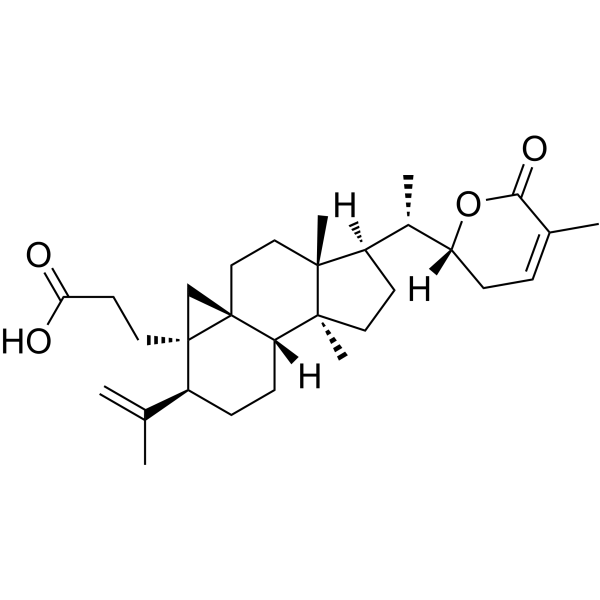
- HY-115947
-
|
|
Others
|
Cancer
|
|
Anticancer agent 33 (compound 3), a Squamocin and Bullatacin derivative, is a potent anticancer agent. Anticancer agent 33 shows high potency to inhibit 4T1 breast cancer cell line (A549, HeLa, HepG2 and MCF-7 cells) growth with IC50s of 1.9-5.4 µM .
|
-
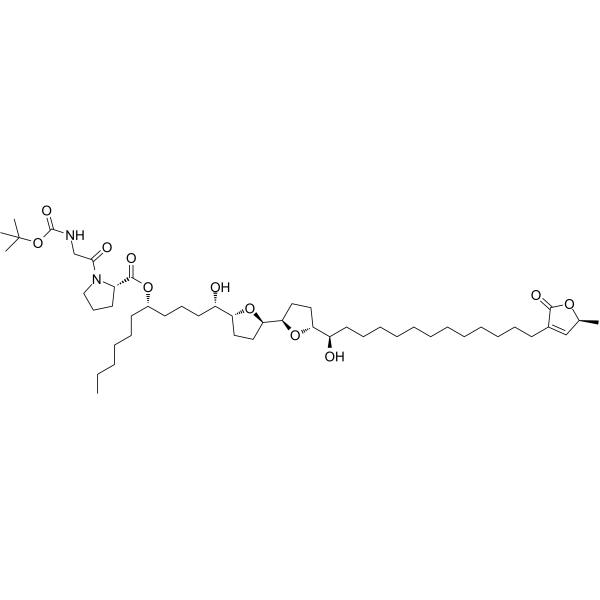
- HY-155441
-
|
|
CDK
|
Cancer
|
CDK2-IN-20 (compound 3b) is an inhibitor of CDK2. CDK2-IN-20 has cytotoxicity on tumor cells presenting an IC50 range of 5.52-17.09 µM. CDK2-IN-20 arrests the MCF-7 cell cycle at the S phase and induces apoptosis .
|
-
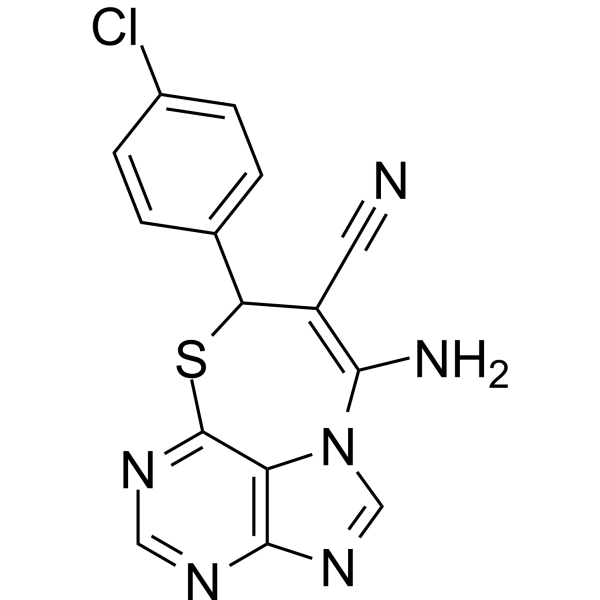
- HY-101989
-
|
|
Microtubule/Tubulin
Apoptosis
|
Cancer
|
|
Tubulin polymerization-IN-24 (compound HMBA) is a potent tubulin polymerization inhibitor. Tubulin polymerization-IN-24 inhibits MCF-7 cells proliferation. Tubulin polymerization-IN-24 induces apoptosis and cell cycle arrest at G2/M phase. Tubulin polymerization-IN-24 increase the GTP hydrolysis rate and inhibits microtubule assembly .
|
-
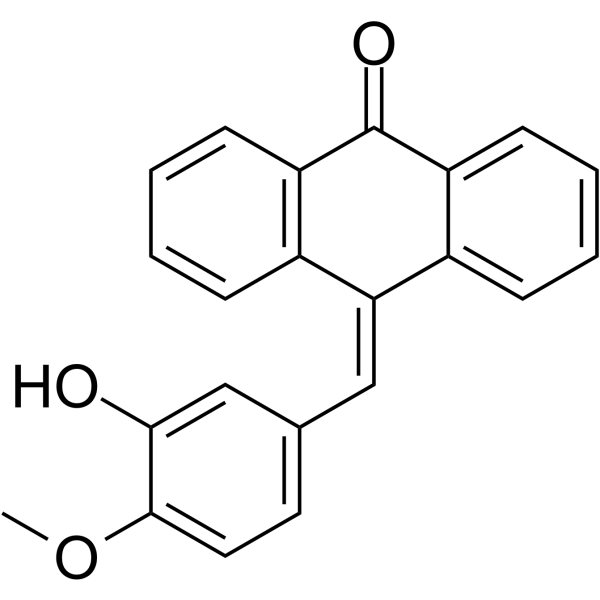
- HY-N10354
-
|
|
Apoptosis
|
Cancer
|
|
27-Methyl withaferin A (comppund 26) is an apoptosis inducer with anticancer effects. 27-Methyl withaferin A shows antiproliferative effects against HeLa, A-549 and MCF-7 human tumor cell lines with IC50 values of 3.2 μM, 4.2 μM and 1.4 μM, respectively .
|
-
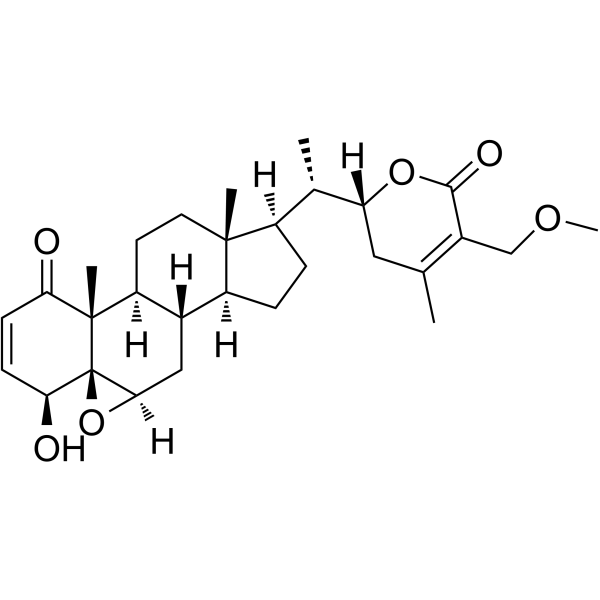
- HY-144070
-
|
|
Others
|
Cancer
|
|
ErSO-DFP is an anticipatory unfolded protein response (a-UPR) activator. ErSO-DFP has enhanced selectivity for estrogen receptor alpha-positive (ERα+) cancer cells with a wider selectivity window than ErSO.ErSO-DFP displays antitumor activity and leads to profound regression of MCF-7 tumors in mice model .
|
-
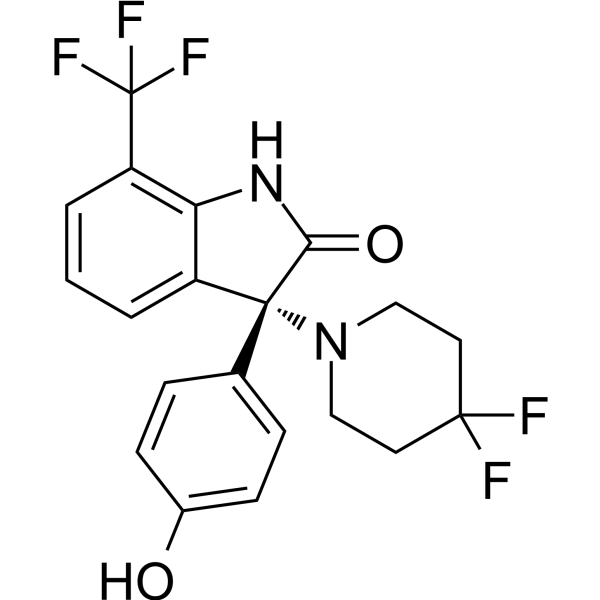
- HY-144335
-
|
|
DNA Alkylator/Crosslinker
|
Cancer
|
|
DNA crosslinker 2 (dihydrochloride) is a potent DNA minor groove binder with DNA binding affinity (ΔTm) of 1.2 °C. DNA crosslinker 2 (dihydrochloride) has certain inhibitory activity against cancer cells NCI-H460, A2780 and MCF-7. DNA crosslinker 2 (dihydrochloride) can be used for researching anticancer .
|
-
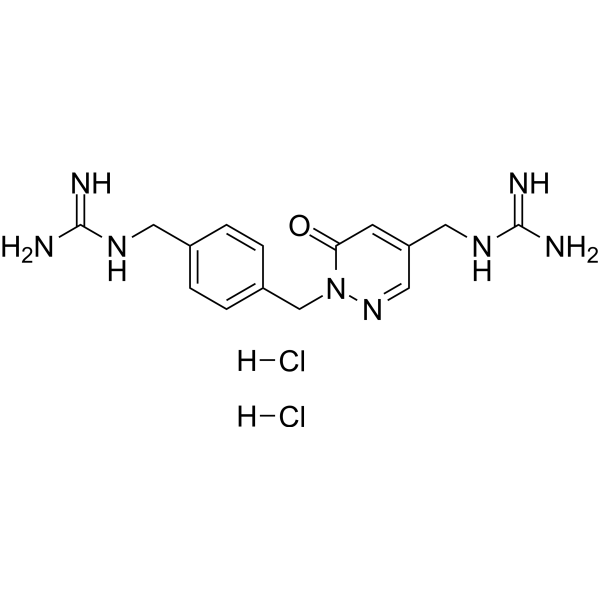
- HY-147921
-
|
|
Pim
|
Cancer
|
|
PIM1-IN-7 (compound 6c) is a potent PIM-1 inhibitor, with an IC50 of 0.67 μM. PIM1-IN-7 shows the high cytotoxicity activity against HCT-116 and MCF-7 cells, with IC50 values of 42.9 and 7.68 μM, respectively .
|
-
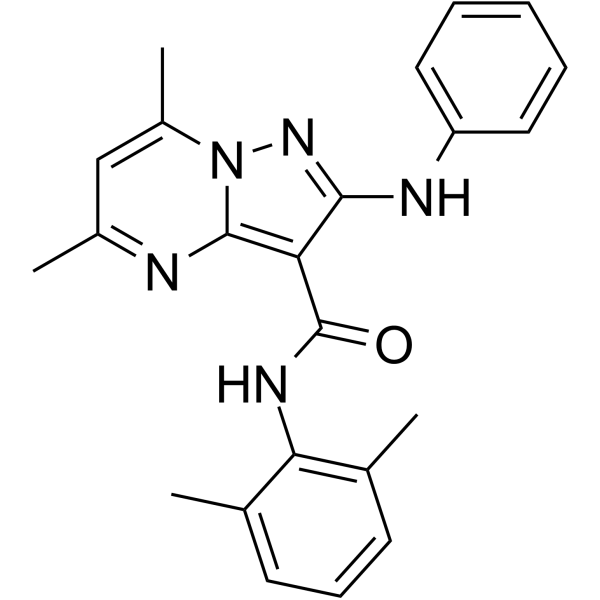
- HY-147920
-
|
|
Pim
|
Cancer
|
|
PIM1-IN-6 (compound 5h) is a potent PIM-1 inhibitor, with an IC50 of 0.60 μM. PIM1-IN-6 shows the high cytotoxicity activity against HCT-116 and MCF-7 cells, with IC50 values of 1.51 and 15.2 μM, respectively .
|
-
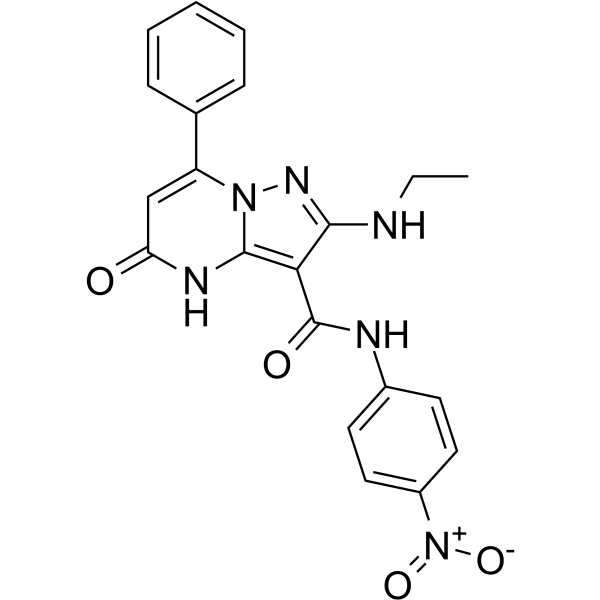
- HY-14585
-
|
Estrone 3-O-sulfamate
|
Steroid Sulfatase
|
Cancer
|
|
Estrone O-sulfamate (Estrone 3-O-sulfamate) is a potent steroid sulfatase (STS) inhibitor. Estrone O-sulfamate has inhibitory activity for STS in a placental microsomes (P.M.) preparation and in MCF-7 cells with IC50 values of 18 nM and 0.83 nM, respectively. Estrone O-sulfamate can be used for the research of cancer .
|
-
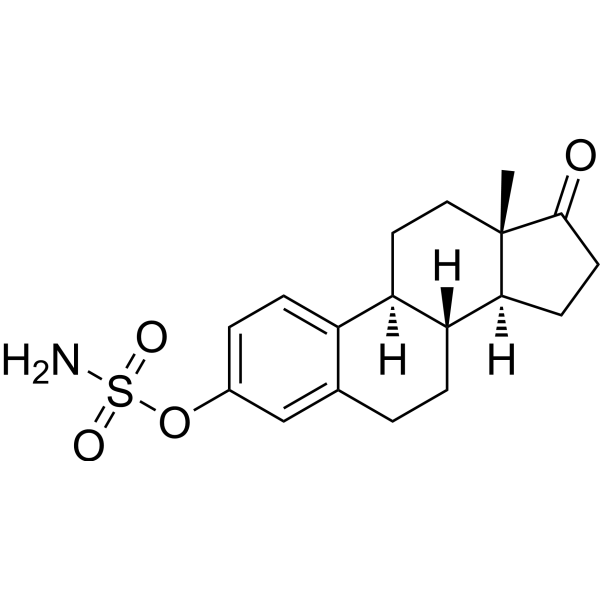
- HY-152945
-
|
|
NF-κB
|
Cancer
|
|
Antiproliferative agent-22 (compound 2) is an anticancer agent. Antiproliferative agent-22 shoes anti-proliferative activities against MCF-7, MDA-MB-231 and MDA-MB-468 cells with IC50 values of 6.2 μM, 3.3 μM and 3.3 μM, respectively .
|
-
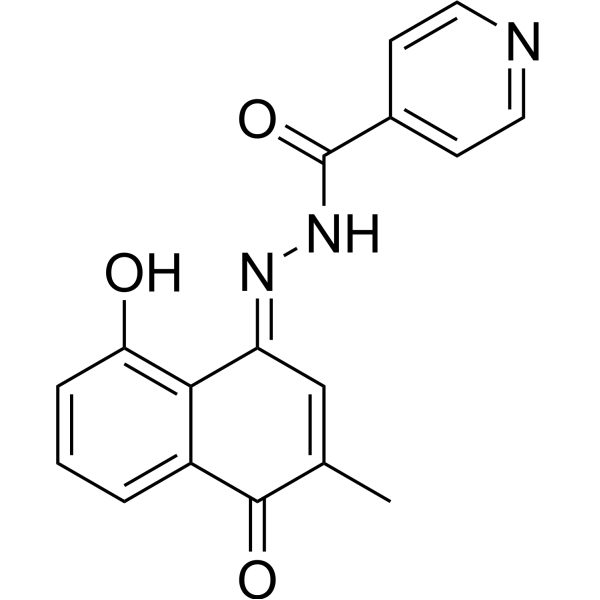
- HY-W080443
-
|
|
Others
|
Others
|
|
O-allylvanillin is O-allylchalcone derivative with anti-cancer effects . O-allylvanillin inhibits THP-1, HL60, Hep-G2, MCF-7 cells growth with IC50 values of 74.76 μM, 63.52 μM, 90.99 μM, and 90.11 μM, respectively .
|
-
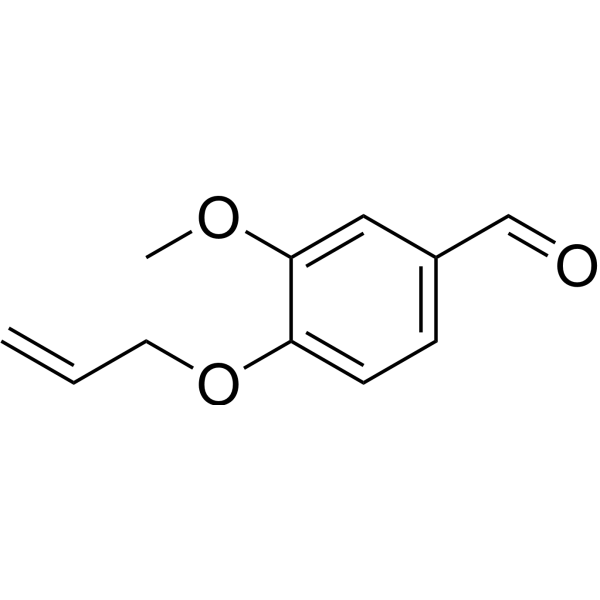
- HY-N1107
-
|
NSC 119993; NSC 277290; Odorigeni
|
Others
|
Cancer
|
|
Uzarigenin (NSC 119993; NSC 277290; Odorigeni) is a carnolide can be isolated from Pergularia tomentosa and exhibits antiproliferative activity. Uzarigenin resists the proliferation of PC3 cells, HeLa cells, Calu-1 cells, MCF-7 cells and U251MG cells, with IC50 values of 0.3 μM, 3.0 μM, 8.0 μM, 6.0 μM and 6.0 μM respectively .
|
-
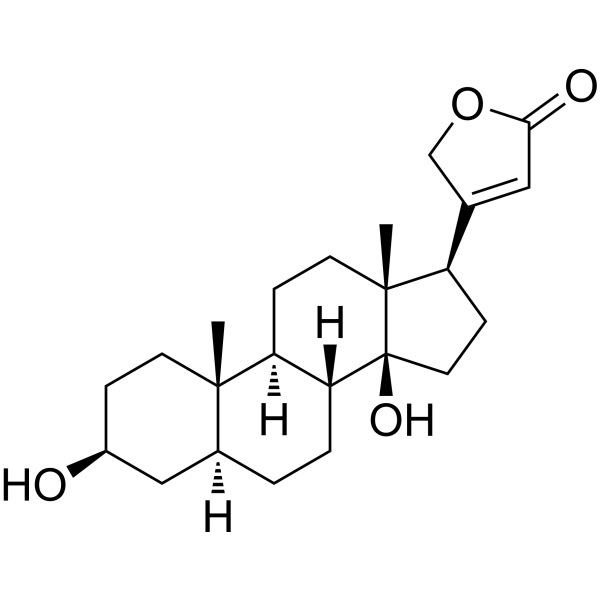
- HY-157960
-
|
|
VEGFR
|
Cancer
|
|
VEGFR-2-IN-42 (compound 8c) is a potent VEGFR-2 inhibitor. VEGFR-2-IN-42 shows anti-proliferative effect against MCF7 cells with the IC50 of 25 µM .
|
-
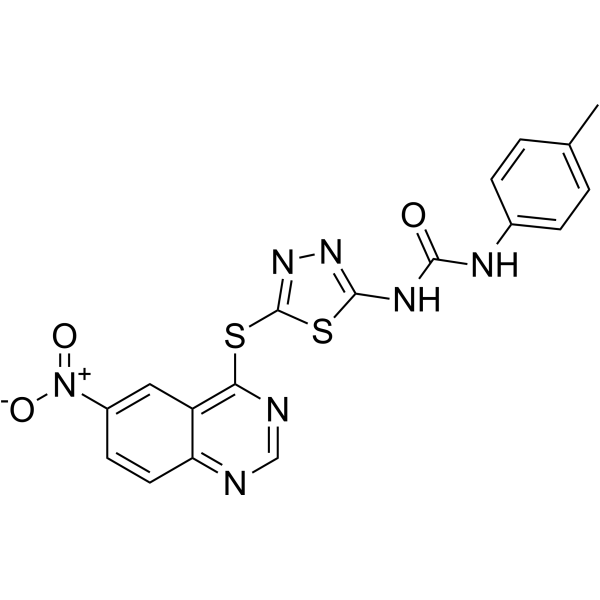
- HY-149995
-
|
|
Pim
|
Cancer
|
|
Pim-1 kinase inhibitor 5 (Compound 4c) is a Pim-1 kinase inhibitor (IC50: 0.61 μM). Pim-1 kinase inhibitor 5 shows cytotoxicity against cancer cells, with IC50s of 6.95-20.19 μM for HepG2, MCF-7, PC3, and HCT-116 cells .
|
-
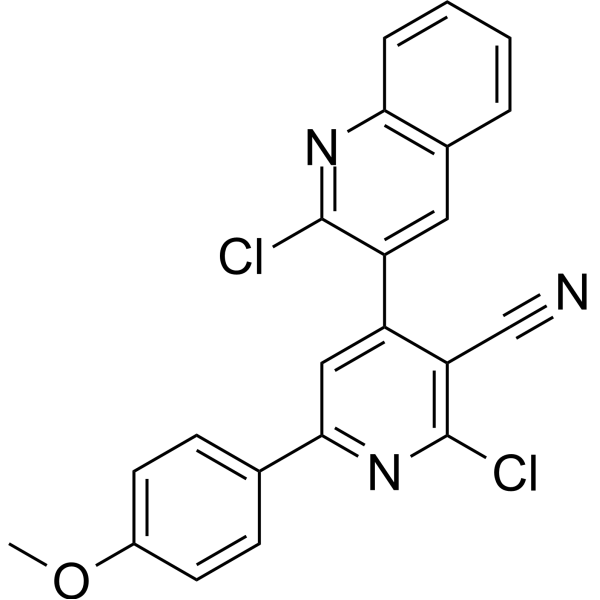
- HY-Y0598
-
|
|
|
|
|
trans-Chalcone, isolated from Aronia melanocarpa skin, is a biphenolic core structure of flavonoids precursor. trans-Chalcone is a potent fatty acid synthase (FAS) and α-amylase inhibitor. trans-Chalcone causes cellcycle arrest and induces apoptosis in the breastcancer cell line MCF-7. trans-Chalcone has antifungal and anticancer activity .
|
-
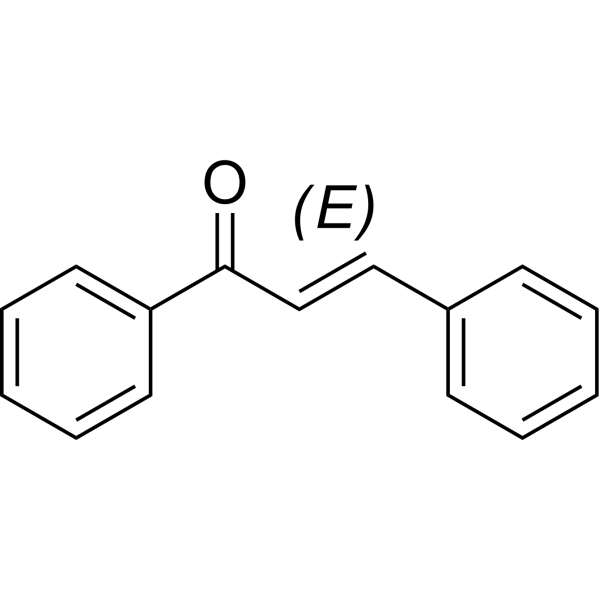
- HY-146467
-
|
|
Others
|
Cancer
|
|
Anticancer agent 62 (compound 4c) is a potent anticancer agent. Anticancer agent 62 shows antiproliferative activity in HepG2, Bel-7402 and MCF-7 cancer cells, with IC50 values of 0.019, 0.060 and 0.016 μM, respectively. Anticancer agent 62 shows effective tumor growth inhibition .
|
-
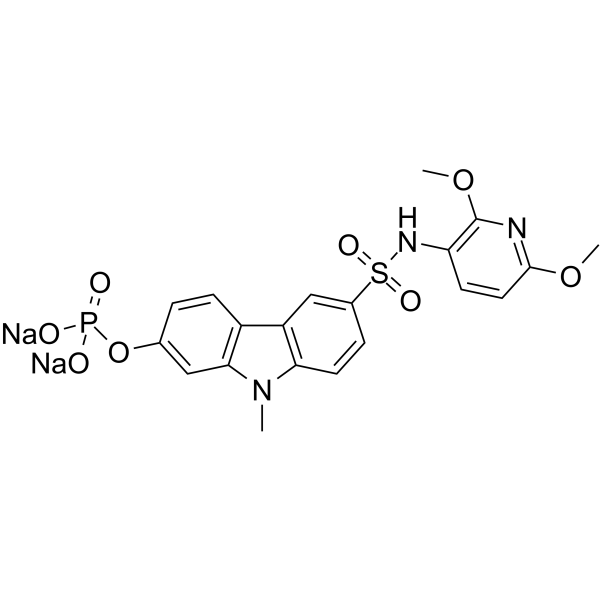
- HY-150692
-
|
|
Estrogen Receptor/ERR
|
Cancer
|
|
Estrogen receptor α antagonist 1 (compound 35) is a highly selective antagonist of estrogen receptor α, with IC50s of 0.02, 6.55 and 7.73 μM for estrogen receptor α, estrogen receptor β and MCF-7 cells, respectively. Estrogen receptor α antagonist 1 can be used for the research of cancer .
|
-
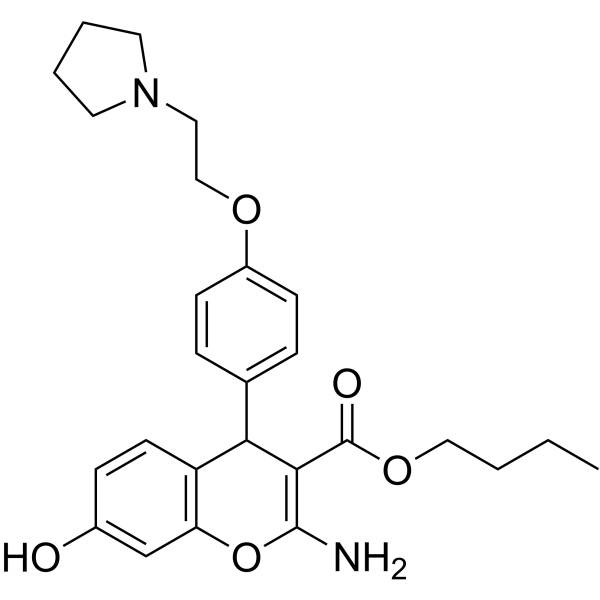
- HY-157138
-
|
|
Others
|
Cancer
|
|
MMP-9-IN-8 (Compound 3) is an MMP-9 inhibitor with inhibitory activities of 42.16% and 58.28% at 10 μM and 50 μM concentrations, respectively. MMP-9-IN-8 has anti-cancer activity and can induce apoptosis in MCF-7 cells with an IC50 value of 23.42 μM .
|
-
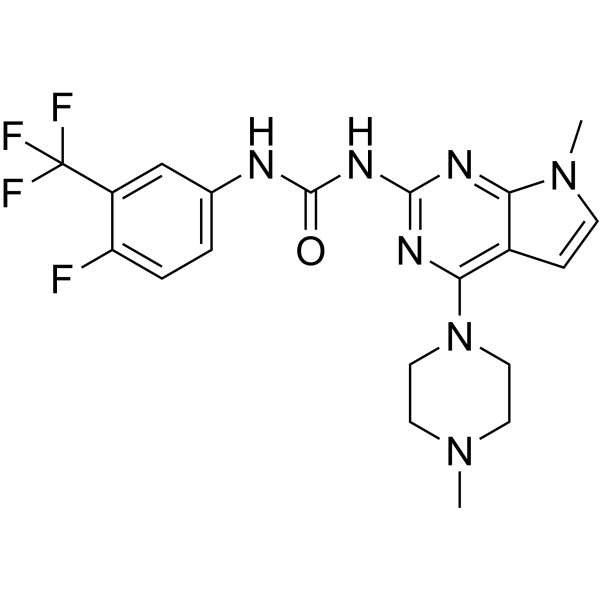
- HY-P4523
-
|
|
Endogenous Metabolite
|
Endocrinology
|
|
FA-Ala-Arg is a dipeptide with furylacryloyl group. FA-Ala-Arg breaks down to produce arginine. While cell-surface Carboxypeptidase-D (CPD) also increases intracellular Arg, which is converted to nitric oxide (NO). FA-Ala-Arg enhances NO production in MCF-7 cells. FA-Ala-Arg also increases the cell survival of prolactin (PRL)-treated cells, PRL regulates CPD mRNA levels in cells .
|
-
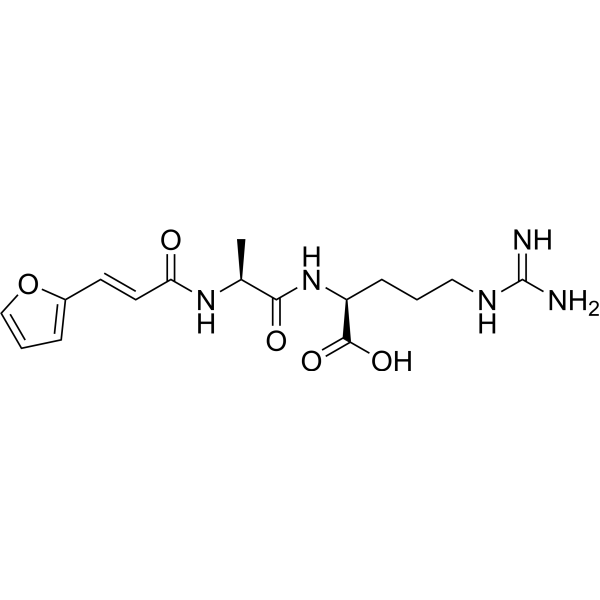
- HY-N7340
-
|
|
Others
|
Cancer
|
|
Withaperuvin C is a withanolide that can be isolated from Physalis Minima. Withaperuvin C has moderate cytotoxicity against cancer cells such as HepG2, SK-LU-1, and MCF7 cells (IC50: 19.5, 14.65, 11.74 μg/mL) .
|
-
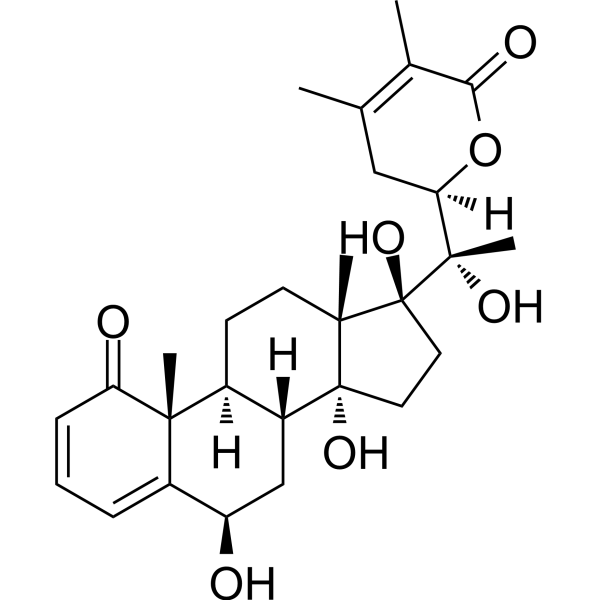
- HY-N12208
-
|
|
Others
|
Cancer
|
|
Neohelmanthicin B is a phenylpropanoid that can be isolated from Thapsia garganica. Neohelmanthicin B exhibits cytotoxicity against EL4, S180 and MCF7 cell lines with IC50s of 10, 5 and12 μM, respectively .
|
-
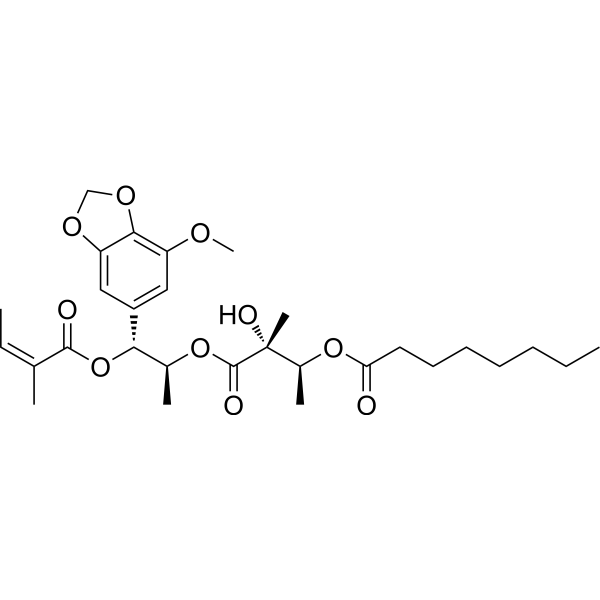
- HY-50936
-
|
Ecteinascidin 743; ET-743
|
Reactive Oxygen Species
Apoptosis
|
Inflammation/Immunology
Cancer
|
|
Trabectedin (Ecteinascidin 743; ET-743) is a tetrahydroisoquinoline alkaloid with potent antitumor activity. Trabectedin binds to the minor groove of DNA, blocks transcription of stress-induced proteins, induces DNA backbone cleavage and cancer cells apoptosis, and increases the generation of ROS in MCF-7 and MDA-MB-453 cells. Trabectedin has the potential for soft tissue sarcoma and ovarian cancer research .
|
-
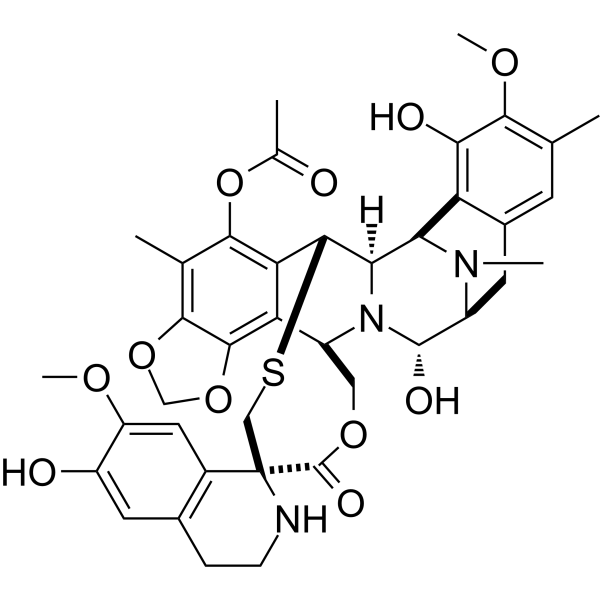
- HY-144774
-
|
|
Topoisomerase
DNA/RNA Synthesis
Apoptosis
|
Cancer
|
|
Topoisomerase I inhibitor 5 is an effective topoisomerase inhibitor with IC50 value of. Topoisomerase I inhibitor 5 can interfere with DNA and significantly inhibit the activity of Topoisomerase I. Topoisomerase I inhibitor 5 can arrest cell cycle at the G1 phase and induce MCF-7 cells apoptosis. Topoisomerase I inhibitor 5 has potency in reversing P-gp-mediated resistance to Adriamycin .
|
-
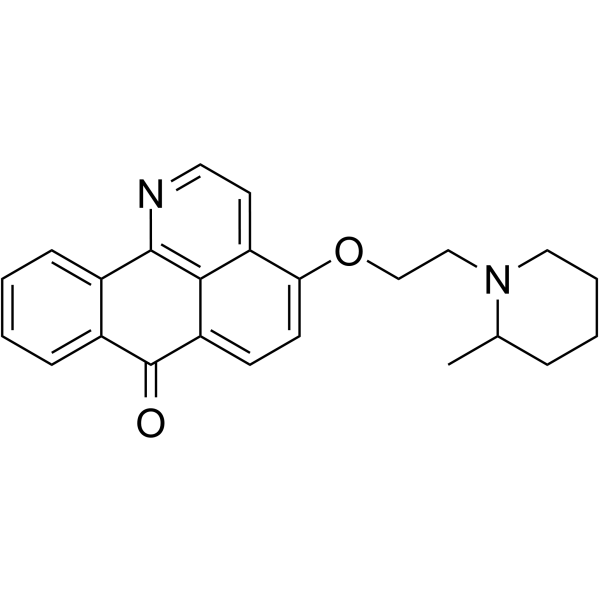
- HY-146454
-
|
|
Others
|
Cancer
|
|
Antiproliferative agent-6 (compound 8a) is a potent antitumor agent. Antiproliferative agent-6 has antiproliferative activity against cancer cell lines HCT116, MCF-7, H460 and non-tumor aneuploid immortal keratinocyte HaCaT cells with GI50s of 0.5 μM, 2 μM, 0.7 μM and 3.5 μM, respectively .
|
-
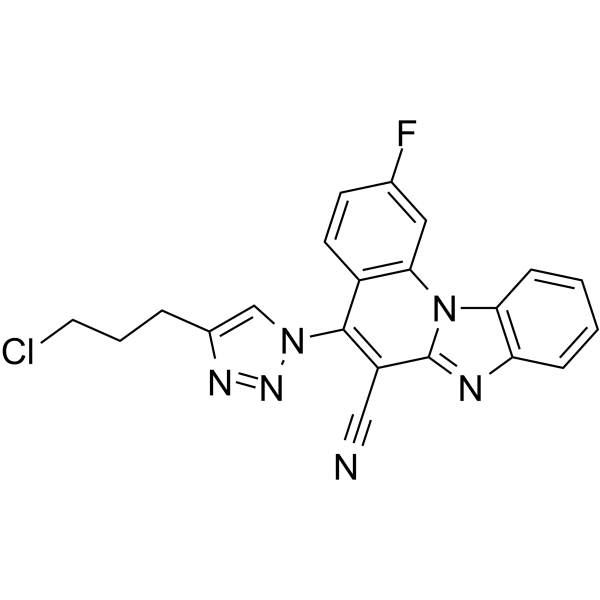
- HY-N3210
-
|
|
Others
|
Cancer
|
|
Nb-Demethylechitamine is an alkaloid isolated from the methanol extract of Alstonia rostrata twigs. Nb-Demethylechitamine has in vitro cytotoxic activity against several human cancer cell lines, including human myeloid leukemia HL-60, liver cancer SMMC-7721, lung cancer A-549, breast cancer MCF-7, and colon cancer SW480 cells .
|
-
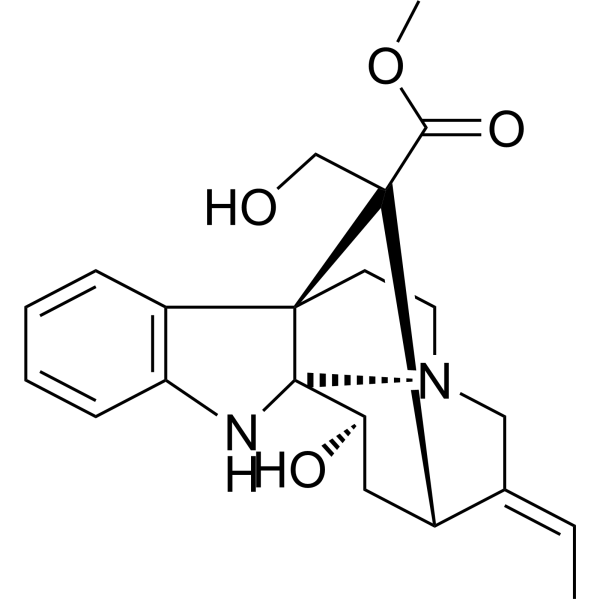
- HY-119358
-
|
|
Reactive Oxygen Species
Apoptosis
|
Inflammation/Immunology
|
|
Traumatic Acid is a wound healing agent and a cytokinin (phytohormone). Traumatic Acid enhances the biosynthesis of collagen in cultured human skin fibroblasts. Traumatic Acid inhibits MCF-7 breast cancer cells viability and enhances apoptosis and oxidative stress. Traumatic Acid can be used in studies of cancer, circulatory disorders (including arterial hypertension), and skin diseases associated with oxidative stress and impaired collagen biosynthesis .
|
-
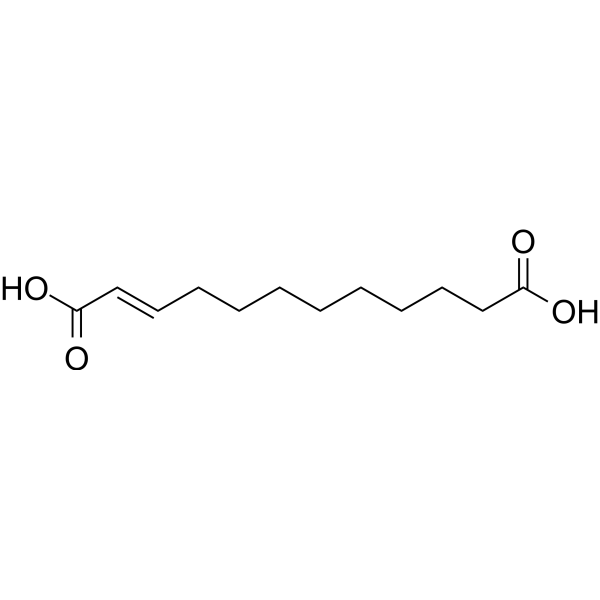
- HY-13636S
-
|
ICI 182780-d3; ZD 9238-d3; ZM 182780-d3
|
Isotope-Labeled Compounds
Estrogen Receptor/ERR
Autophagy
Apoptosis
|
Cancer
|
|
Fulvestrant-d3 is the deuterium labeled Fulvestrant. Fulvestrant (ICI 182780) is a pure antiestrogen and a potent estrogen receptor (ER) antagonist with an IC50 of 9.4 nM. Fulvestrant is also a GPR30 agonist. Fulvestrant effectively inhibits the growth of ER-positive MCF-7 cells with an IC50 of 0.29 nM. Fulvestrant also induces autophagy and has antitumor efficacy[1].
|
-
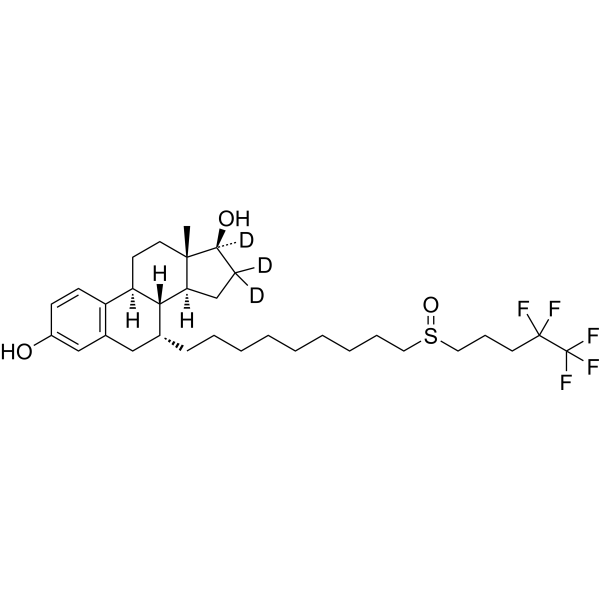
- HY-146466
-
|
|
Others
|
Cancer
|
|
Anticancer agent 61 (compound 3v) is an orally active and potent anticancer agent. Anticancer agent 61 shows antiproliferative activity in HepG2, Bel-7402 and MCF-7 cancer cells, with IC50 values of 1.12, 1.97 and 1.08 μM, respectively. Anticancer agent 61 shows effective tumor growth inhibition .
|
-
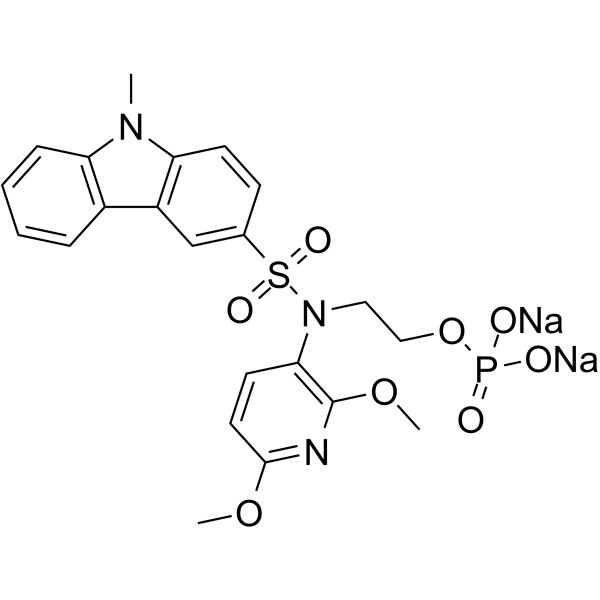
- HY-143301
-
|
|
Topoisomerase
|
Cancer
|
|
Topoisomerase I inhibitor 4 (compound 7a) is a topoisomerase I inhibitor. Topoisomerase I inhibitor 4 inhibits HepG2, A549, MCF-7 and HeLa cancer cells proliferation with IC50s of 1.20, 2.09, 1.56 and 1.92 μM, respectively. Topoisomerase I inhibitor 4 can be used for the research of cancer .
|
-
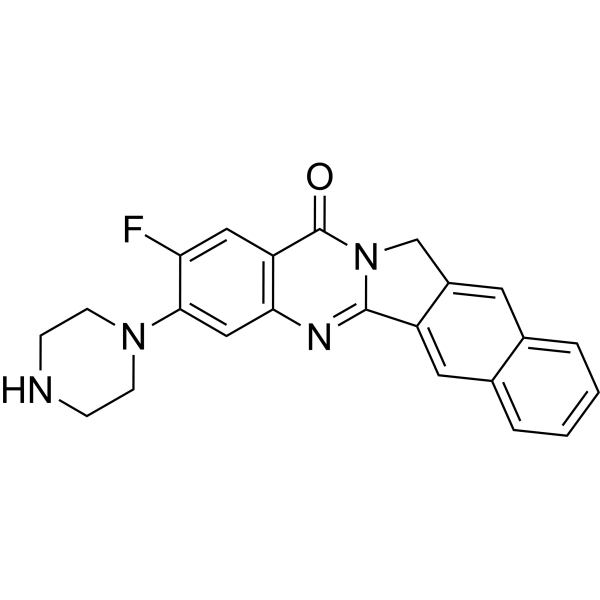
- HY-N2741
-
|
|
Bcl-2 Family
|
Cancer
|
|
Vitexin B-1 is an inhibitor of Bcl-2 and the agonist of Caspase. Vitexin B-1 has cytotoxic effect and induces apoptosis in MCF-7, ZR-75-1, MDA-MB-231, and COC1 cells with IC50s of 3.2, 2.1, 1.8 and 0.39 μM, respectively .
|
-
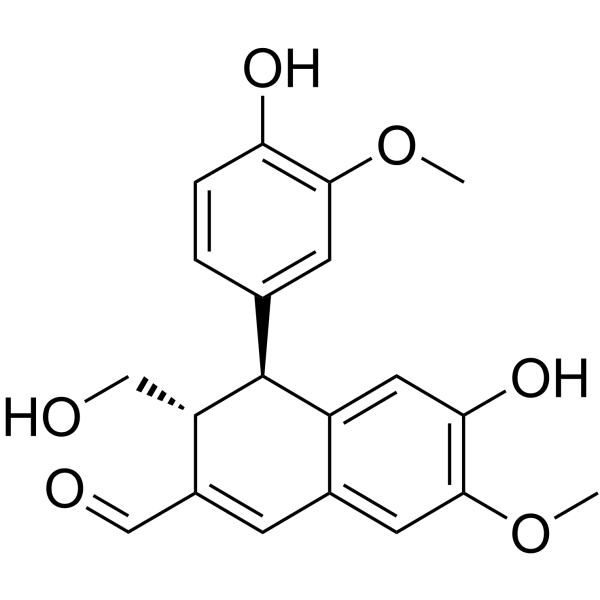
- HY-N12586
-
|
|
Reactive Oxygen Species
|
Endocrinology
|
|
Pheophytin a is a chlorophyll that can be isolated from S. vermiculata extracts. Pheophytin a has antioxidant activity with IC50 values of? 200.5 and 137.7 μg/mL for SOD, and NO respectively. Pheophytin a has reducing power with an IC50 value of 4.2 μg/mL . Pheophytin a has a cytotoxic effect on the MCF-7 cell line(IC50= 35.9 μg/mL)[1].
|
-
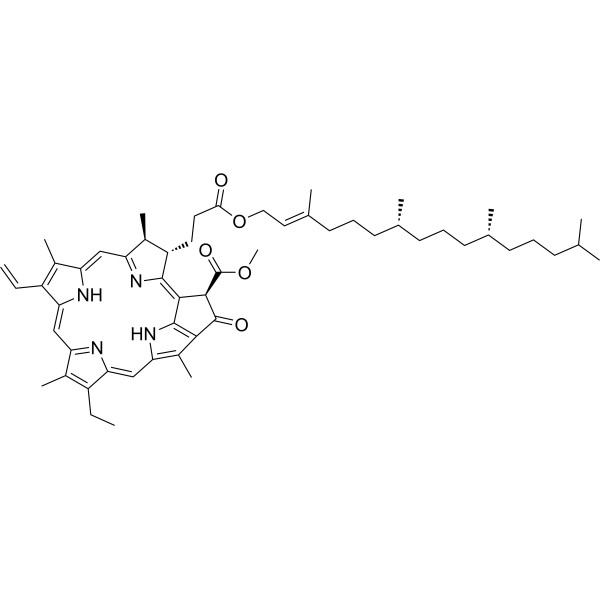
- HY-138210
-
|
|
Fungal
|
Infection
|
|
N,O-Diacetyltyramine is a compound with antibacterial activity and cytotoxicity that can be isolated from the actinomycete Pseudonocardia endophytica VUK-10. N,O-Diacetyltyramine has antibacterial activity against Gram-positive and Gram-negative bacteria and fungi. N,O-Diacetyltyramine is cytotoxic to MDA-MB-231, HeLa, MCF-7 and OAW-42 cells .
|
-
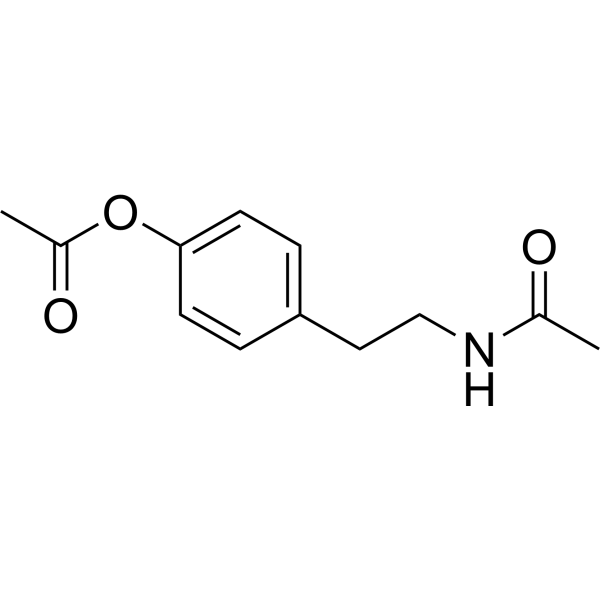
- HY-156919
-
|
|
MDM-2/p53
|
Cancer
|
|
p53 Activator 8 (compound 5) is a p53 activator. p53 Activator 8 has potent anti-proliferative activity against MCF7 breast cancer cell lines with an IC 50 value of 0.5 μM .
|
-
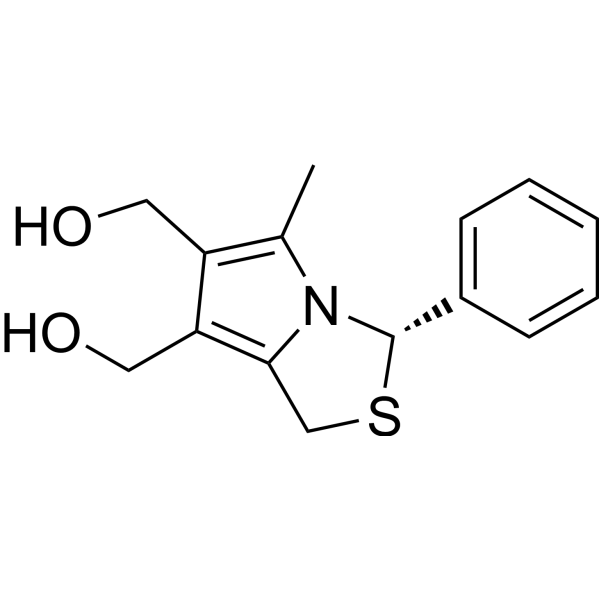
- HY-157151
-
|
|
Histone Methyltransferase
|
Cancer
|
|
iPRMT1 is a potent and selective PRMT1 inhibitor for breast cancer research. iPRMT1 inhibits breast cancer cell growth in vitro and in vivo with EC50 values of 90, 70, and 9 nM in MCF7, T47D, and MDA-MB-231 cells, respectively .
|
-
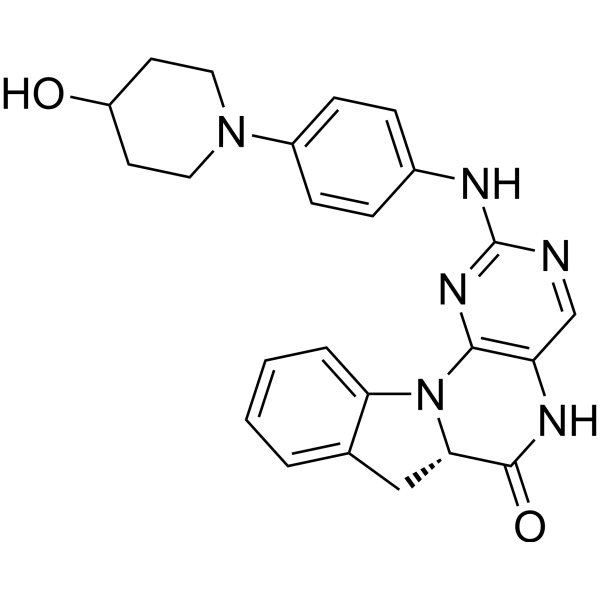
- HY-128600
-
ERD-308
1 Publications Verification
|
PROTACs
Estrogen Receptor/ERR
|
Cancer
|
|
ERD-308 is a highly potent von Hippel-Lindau-based PROTAC degrader of estrogen receptor (ER) for ER positive breast cancer treatment. ERD-308 induces >95% of ER degradation at concentrations as low as 5 nM in both cell lines (DC50 (concentration causing 50% of protein degradation) of 0.17 nM and 0.43 nM in MCF-7 and T47D ER+ cells, respectively) .
|
-
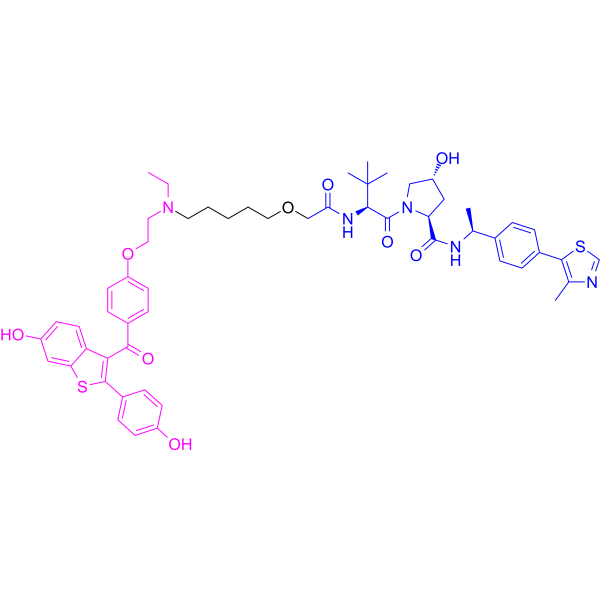
- HY-148368
-
|
|
Bcl-2 Family
Apoptosis
|
Cancer
|
|
CYD-4-61 is a novel Bax activator used for breast cancer research. CYD-4-61 inhibits triple-negative breast cancer MDA-MB-231 and ER-positive breast cancer MCF-7 cell lines proliferation. CYD-4-61 activates Bax protein to induce cytochrome c release and regulate apoptotic biomarkers, leading to cancer cell apoptosis .
|
-
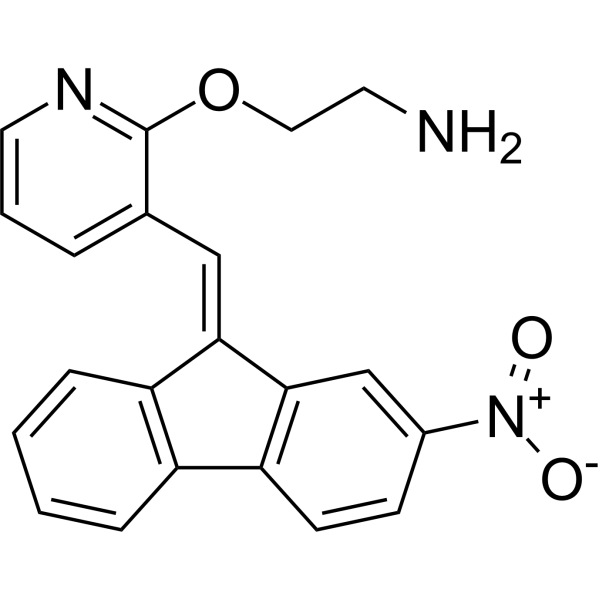
- HY-153789
-
|
|
Others
|
Cancer
|
|
PI5P4Kγ-IN-1 (compound 2) is a selective PI5P4Kγ inhibitor. PI5P4Kγ-IN-1 can be used to signal mTORC1 in MCF-7 breast cancer cells and further characterize PI5P4Kγ in the cells .
|
-
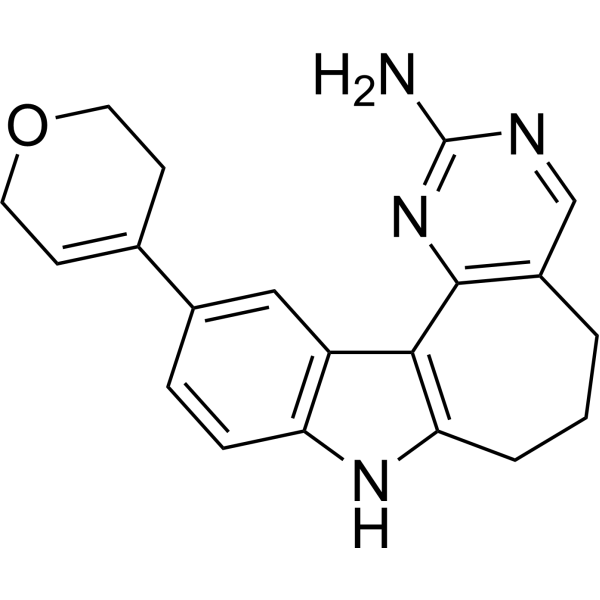
- HY-157419
-
|
7-(4-Ethylphenyl)-FL118
|
Apoptosis
|
Cancer
|
|
FL77-24, a FL118 analog and apoptosis inducer, possesses antitumor activity, with IC50 values of 99.4 nM, 118 nM, <6.4 nM, 28.5 nM and <6.4 nM in HCT116, HepG2, MCF-7, A549 and HeLa cells, respectively. FL77-24 mainly causes cell cycle arrest in S and G2/M phases .
|
-
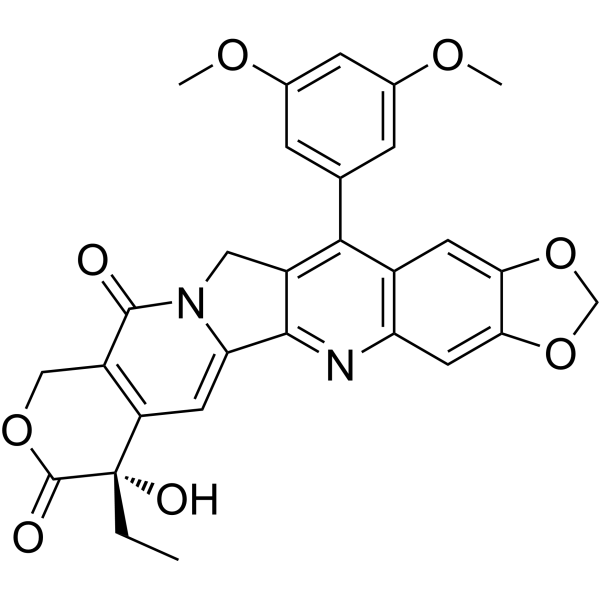
- HY-156470
-
|
|
Trk Receptor
Anaplastic lymphoma kinase (ALK)
c-Kit
EGFR
Pim
Casein Kinase
Checkpoint Kinase (Chk)
CDK
Apoptosis
|
Cancer
|
|
Multi-kinase-IN-6 (compound 10e) is a multikinase inhibitor that shows good enzyme inhibitory activity against TrkA, ALK2, c-KIT, EGFR, PIM1, CK2α, CHK1, and CDK2. Multi-kinase-IN-6 reveals antiproliferative activity against MCF7, HCT116 and EKVX with IC50 values of 3.36 μM, 1.40 μM and 3.49 μM, respectively. Multi-kinase-IN-6 shows cell cycle arrest at the G1/S phase and G1 phase in MCF7 and HCT116 cells with good apoptotic effect .
|
-
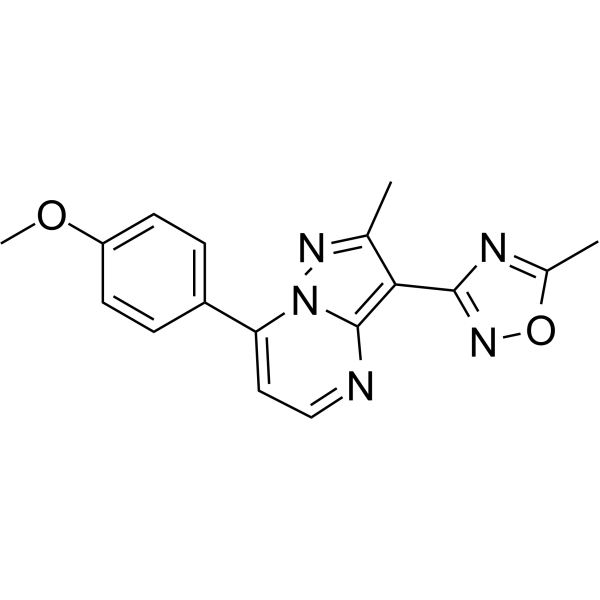
- HY-115950
-
|
|
Others
|
Cancer
|
|
Antitumor agent-48 (Compound 4a) is a 2,3-dehydrosilybin derivative with an antitumor activity. Antitumor agent-48 shows cytotoxic activity against MCF-7, NCI-H1299, HepG2 and HT29 cells with IC50 values of 8.06 µM, 13.1 µM, 16.51 µM and 12.44 µM, respectively .
|
-
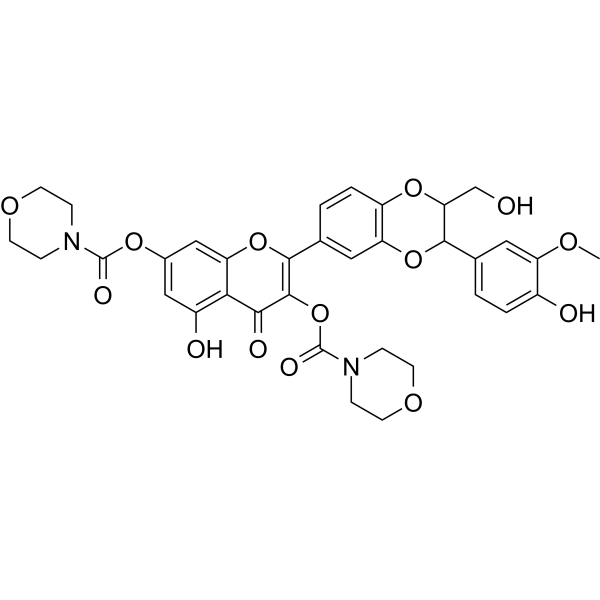
- HY-145865
-
|
|
Apoptosis
|
Cancer
|
|
Antiproliferative against-3 (comp 33) shows a prominent activity against Hela (IC50 = 0.21 µM), A549 (IC50 = 0.39 µM), and MCF-7 (IC50 = 0.33 µM), respectively. Antiproliferative against-3 (comp 33) also dose dependently induces apoptosis by arresting A549 cells at G1 phase .
|
-
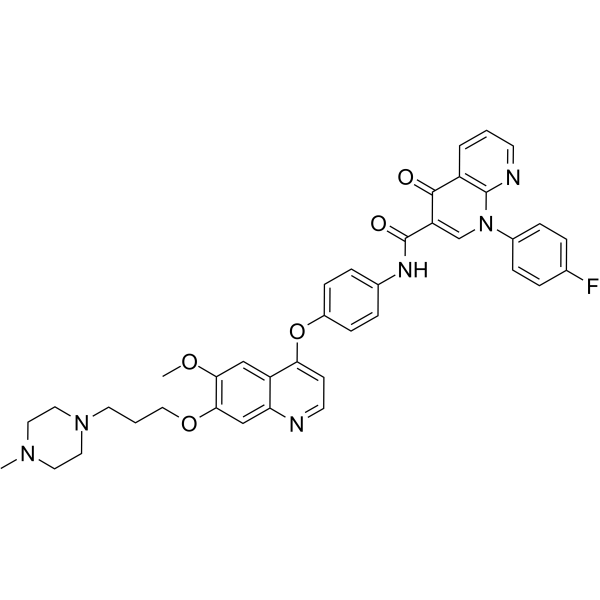
- HY-139434
-
|
|
Histone Demethylase
|
Cancer
|
|
JMJD6-IN-1 (Compound 1-3) is a JMJD6 inhibitor, with an inhibition rate of 82% at 10 μM. JMJD6-IN-1 inhibits MCF-7 and HCC4006 cell proliferation with IC50s of 19.2 μM and 25.2 μM. JMJD6-IN-1 can be used for research of cancers .
|
-
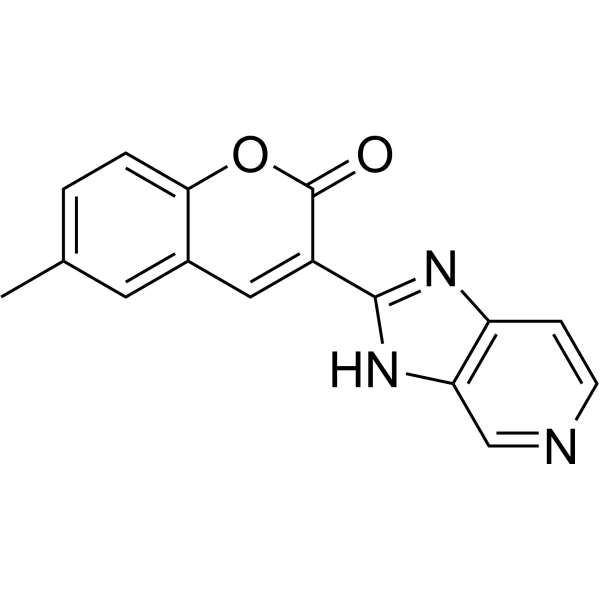
- HY-13636R
-
|
ICI 182780(Standard); ZD 9238(Standard); ZM 182780 (Standard)
|
Estrogen Receptor/ERR
Autophagy
Apoptosis
|
Cancer
|
|
Fulvestrant (Standard) is the analytical standard of Fulvestrant. This product is intended for research and analytical applications. Fulvestrant (ICI 182780) is a pure antiestrogen and a potent estrogen receptor (ER) antagonist with an IC50 of 9.4 nM. Fulvestrant is also a GPR30 agonist. Fulvestrant effectively inhibits the growth of ER-positive MCF-7 cells with an IC50 of 0.29 nM. Fulvestrant also induces autophagy and has antitumor efficacy .
|
-
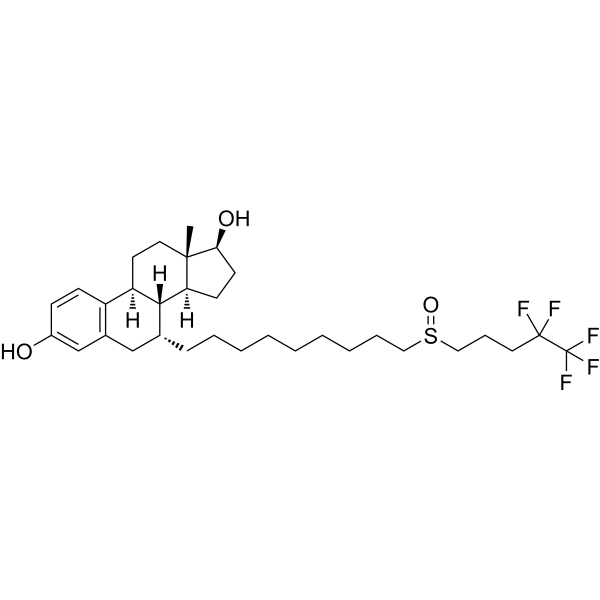
- HY-155105
-
|
|
Glucosidase
|
Metabolic Disease
|
|
α-Glucosidase-IN-30 (compound 8c) is a potent, orally active, competitive inhibitor against α-glucosidase, with Ki of 40.0 µM and IC50 value of 49.0 µM. α-Glucosidase-IN-30 is non-cytotoxic against the cancer and normal cell lines MCF-7 and HDF, and can be used for Type 2 diabetes study .
|
-
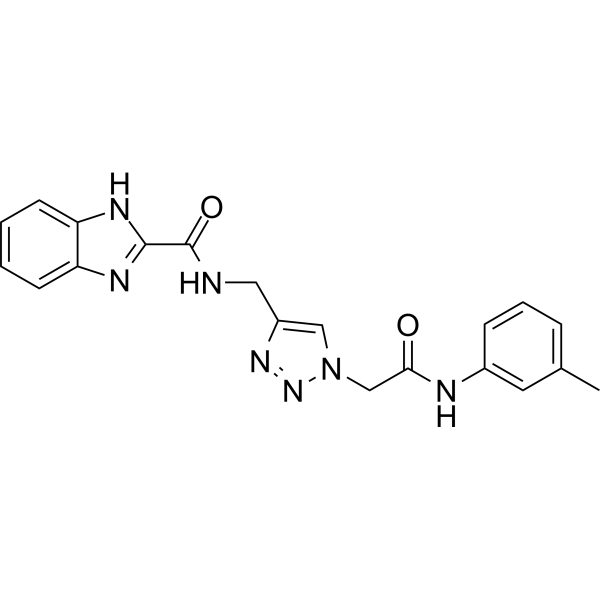
- HY-147839
-
|
|
Topoisomerase
Apoptosis
|
Cancer
|
|
Topoisomerase II inhibitor 10 (compound 32a) is a potent topoisomerase II inhibitor with an IC50 value of 7.45 μM. Topoisomerase II inhibitor 10 causes cell cycle arrest at G2-M phase and induces apoptosis of HepG-2 cells. Topoisomerase II inhibitor 10 has excellent anti-proliferative activities against HepG-2, MCF-7, and HCT-116 cells .
|
-
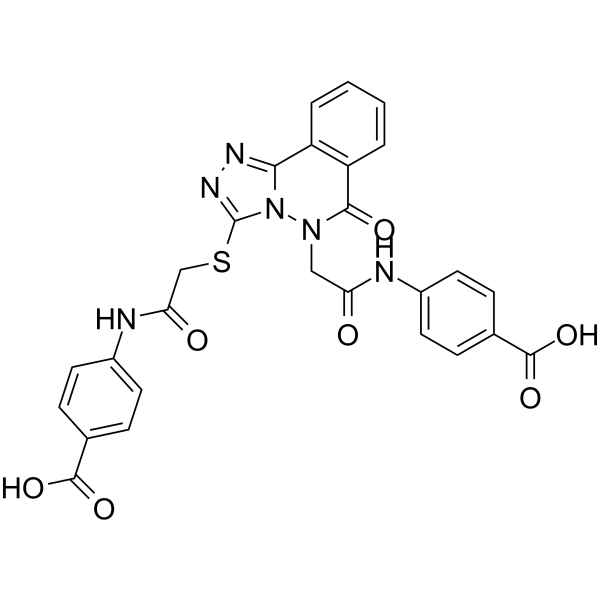
- HY-146819
-
|
|
Carbonic Anhydrase
|
Cancer
|
|
Compound 9 is the most effective against tumor specific Ca ix/ca XII (ki=29.1 and 8.8 nm), so it is possible to evaluate its cytotoxicity and selectivity to HepG-2, HCT-116 and MCF-7 cancer cell lines in vitro, and its IC50 values to tumor cells are 1.78, 1.94 and 3.07, respectively μ M. It showed that it had obvious cytotoxicity.
|
-
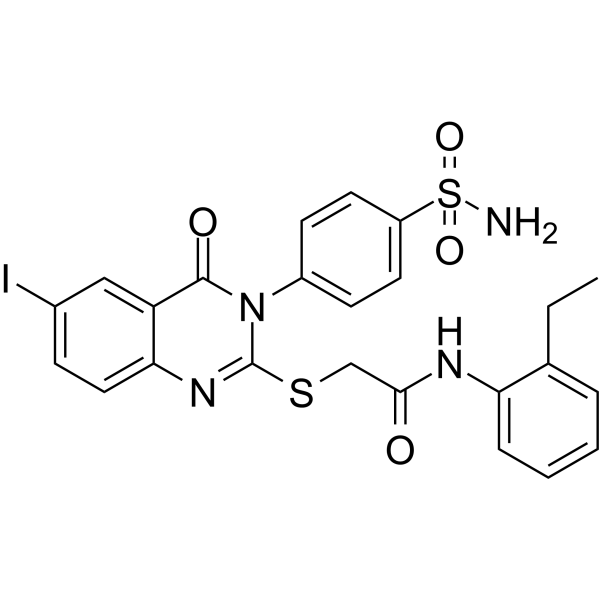
- HY-N10481
-
|
|
Apoptosis
Caspase
PARP
Bcl-2 Family
|
Cancer
|
|
Aviculin, a lignan glycoside, is a potent anticancer agent. Aviculin reduces metabolic activity on MCF-7 cells below 50%, with an IC50 of 75.47 μM. Aviculin induces breast cancer cell apoptosis through the intrinsic apoptosis pathway. Aviculin increases expression of initiator caspase-9, executioner caspase-7, and poly (ADP-ribose) polymerase (PARP). Aviculin shows an increase in the Bax/Bcl-2 ratio .
|
-
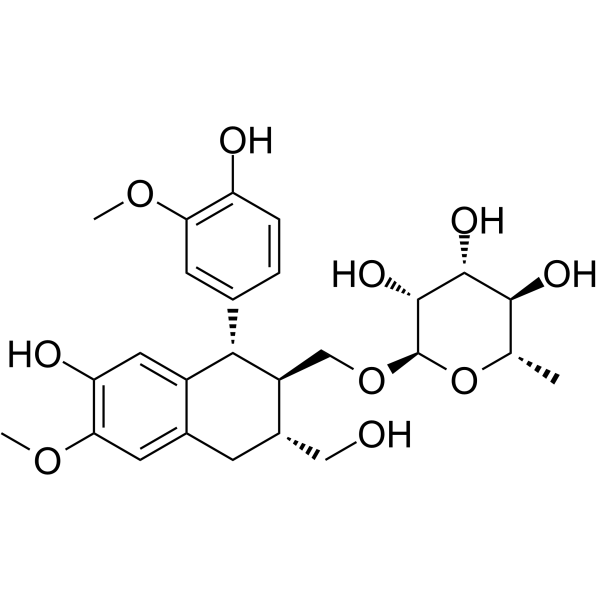
- HY-155337
-
|
|
Others
|
Cancer
|
|
eIF4E-IN-6(compound 4b) is a GMP analogs synthesized to targeteIF4Eand restrain its binding to cap mRNA.eIF4E-IN-6shows cell cytotoxicity against Caco-2, HepG-2,and MCF-7 cells, withIC50values of 31, 27, and 21 μM, respectively .
|
-
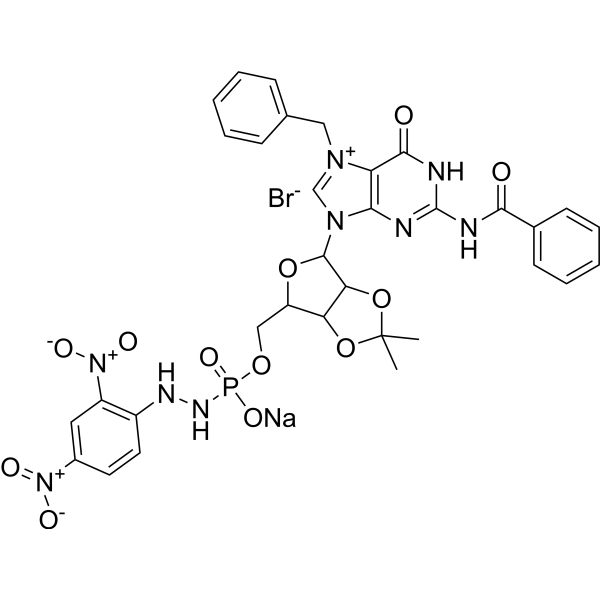
- HY-162312
-
|
|
Deubiquitinase
Apoptosis
|
Cancer
|
|
LLK203 is a potent USP2/USP8 dual-target inhibitor with IC50s of 0.89 μM and 0.52 μM, respectively. LLK203 leads a degradation of ERα and induces apoptosis of breast cancer MCF-7 cells. LLK203 demonstrates antitumor activities against the 4T1 tumor mice model .
|
-
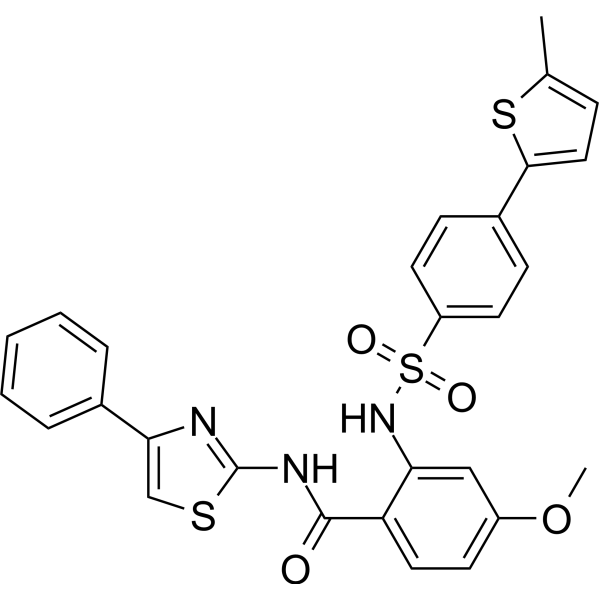
- HY-50936S
-
|
Ecteinascidin 743-d3; ET-743-d3
|
Isotope-Labeled Compounds
Reactive Oxygen Species
Apoptosis
|
Inflammation/Immunology
Cancer
|
|
Trabectedin D3 (Ecteinascidin 743 D3) is deuterium labeled Trabectedin. Trabectedin is a tetrahydroisoquinoline alkaloid with potent antitumor activity. Trabectedin binds to the minor groove of DNA, blocks transcription of stress-induced proteins, induces DNA backbone cleavage and cancer cells apoptosis, and increases the generation of ROS in MCF-7 and MDA-MB-453 cells. Trabectedin has tje potential for soft tissue sarcoma and ovarian cancer treatment .
|
-
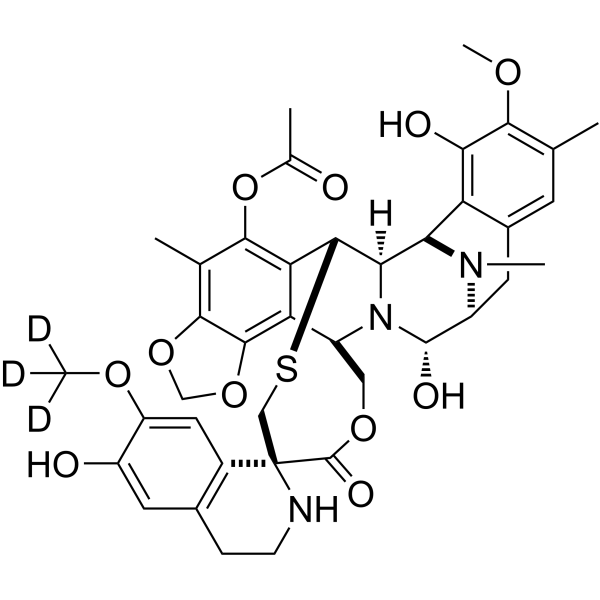
- HY-155956
-
|
|
Microtubule/Tubulin
Apoptosis
|
Cancer
|
|
GM-90257 is a microtubule acetylation inhibitor that binds directly to α-tubulin. GM-90257 prevents the recruitment of α-tubulin acetyltransferase 1 (αTAT1) to the K40 residue in α-tubulin. GM-90257 causes the apoptosis of MDA-MB-231 cells with weaker effects on MCF-10A or MCF-7 cells, which have a relatively low level of microtubule acetylation .
|
-
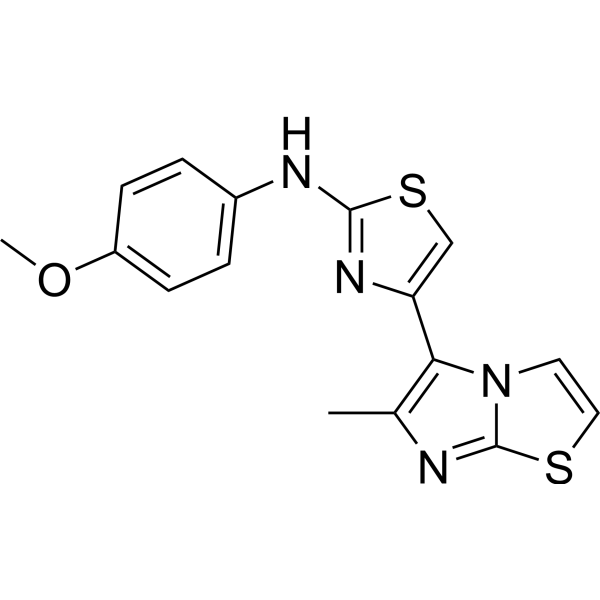
- HY-143232
-
|
|
Fungal
Bacterial
|
Infection
Cancer
|
|
Antibacterial agent 73 (compound 7a) is a potent antimicrobial agent. Antibacterial agent 73 exhibits very good antitubercular activity (MIC=0.65 µg/mL) against Mtb H37Rv. Antibacterial agent 73 shows good activity against fungal and bacterial. Antibacterial agent 73 also shows cytotoxicity in MCF-7 breast cancer cell lines, with IC50 of 8.20 μM .
|
-
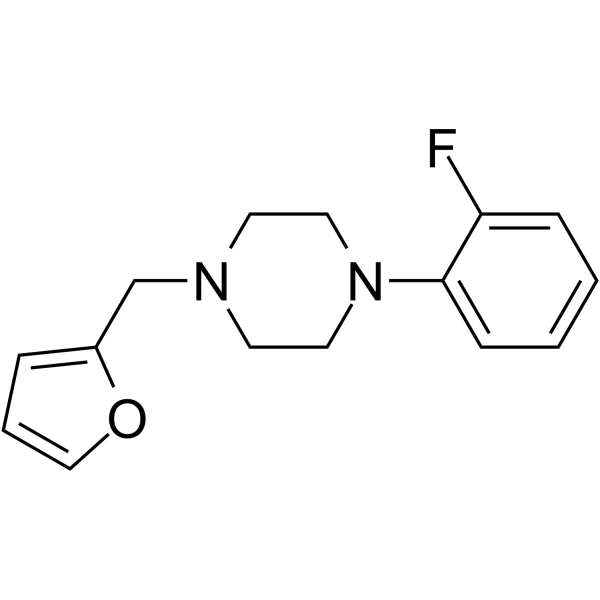
- HY-155118
-
|
|
EGFR
|
Cancer
|
|
EGFR-IN-81 (Compound 10i) is an EGFR inhibitor. EGFR-IN-81 inhibits EGFR WT and L858R/T790M with IC50s 4.38 nM and 5.69 nM. EGFR-IN-81 has cytotoxic activity against MCF-7 and HCT116 cells with of 2.07 μM and 6.72 μM respectively .
|
-
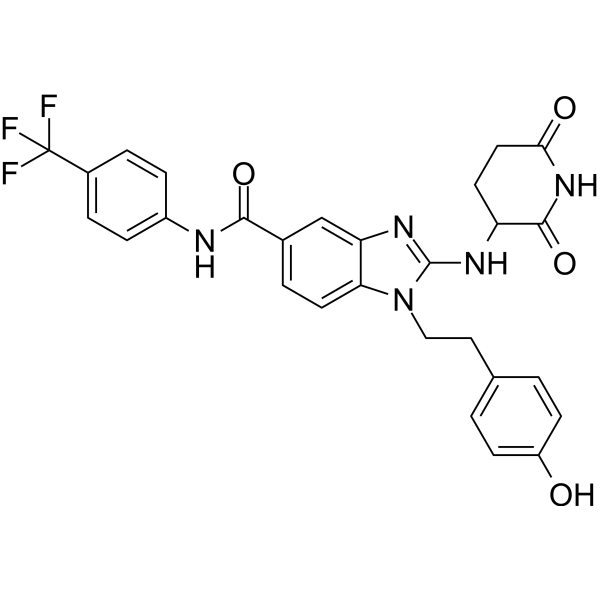
- HY-163125
-
|
|
VEGFR
|
Cancer
|
|
BHEPN is an inhibitor of vascular endothelial growth factor receptor-2 (VEGFR-2). BHEPN has inhibition of VEGFR-2 with an IC50 value of 0.320 μM. BHEPN also exhibits remarkable cytotoxic effects against HepG2 and MCF-7 cancer cell lines, with IC50 values of 0.19 μM and 1.18 μM, respectively. BHEPN can be used for anticancer research .
|
-
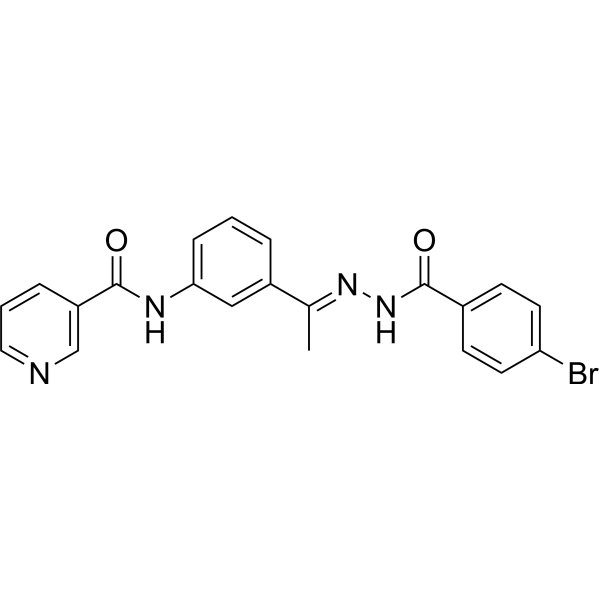
- HY-116377
-
|
|
Steroid Sulfatase
|
Neurological Disease
|
|
DU-14 is a potent steroid sulfatase inhibitor with an IC50 of 55.8 nM. DU-14 inhibits the MCF-7 cell proliferation (IC50 = 38.7 nM). DU-14 has neuroprotective effects against neurotoxic Aβ, suggesting that up-regulation of endogenous DHEAS by DU-14 could be beneficial to the alleviation of Aβ-induced impairments in spatial memory and synaptic plasticity .
|
-
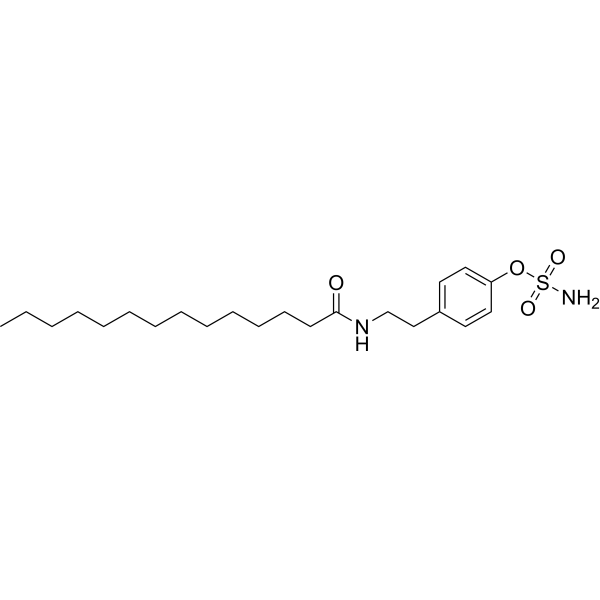
- HY-163434
-
|
|
EGFR
Histone Methyltransferase
|
Cancer
|
|
PRMT5/EGFR-IN-1 (Compound 10p) is an orally active dual PRMT5/EGFR inhibitor, with IC50s of 15.47 and 19.31 μM, respectively. PRMT5/EGFR-IN-1 exhibits antiproliferative activity against A549, MCF7, HeLa, and MDA-MB-231 cell lines. PRMT5/EGFR-IN-1 has favorable in vivo PK and PD properties. PRMT5/EGFR-IN-1 can significantly inhibit the growth of MCF7 orthotopic xenograft tumors .
|
-
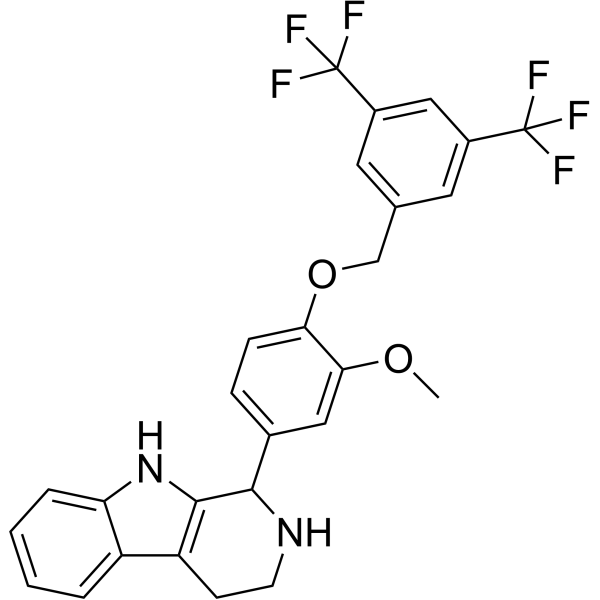
- HY-146452
-
|
|
Apoptosis
|
Cancer
|
|
Anticancer agent 57 (compound 14) potently inhibits MDA-MB-231, MDA-MB-468, and MCF-7 cell lines, with IC50s of 6.43 ~ 8.00 μM. Anticancer agent 57 induces cell cycle arrest and significantly promotes apoptosis. Anticancer agent 57 inhibits tumor growth in nude mice xenografted with MADMB-231 cells. Anticancer agent 57 can be used for researching triple negative breast cancer (TNBC) .
|
-
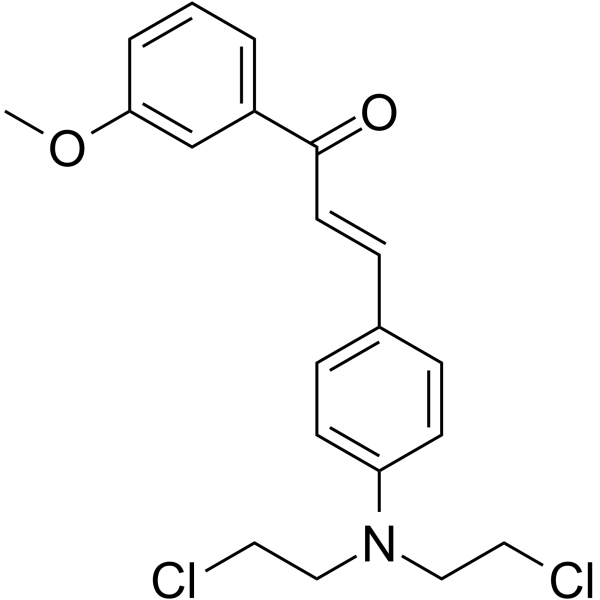
- HY-145864
-
|
|
VEGFR
|
Cancer
|
|
VEGFR-2-IN-12 (compound 6g), a 2-oxoquinoxalinyl-1,2,4-triazole, is a potent VEGFR-2 inhibitor with an IC50 of 0.037 µM. VEGFR-2-IN-12 shows high growth inhibition against MCF-7 cells (GI50=1.6 µM). VEGFR-2-IN-12 has antitumor activity .
|
-
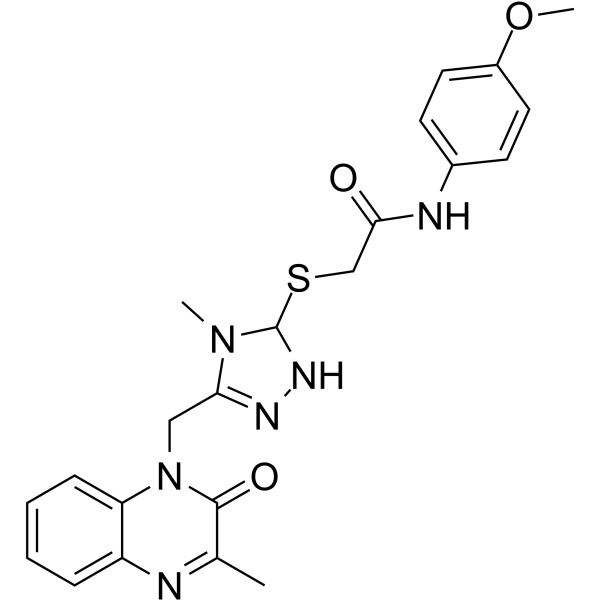
- HY-147853
-
|
|
Raf
|
Cancer
|
|
B-Raf IN 8 (compound 7g) is a potent B-Raf inhibitor, with an IC50 of 70.65 nM. B-Raf IN 8 exhibits antitumor activity against hepatocellular carcinoma (HEPG-2), colon carcinoma (HCT-116), mammary gland (MCF-7) and human prostate cancer (PC-3) cells, with IC50 values of 9.78, 13.78, 18.52 and 29.85 µM .
|
-
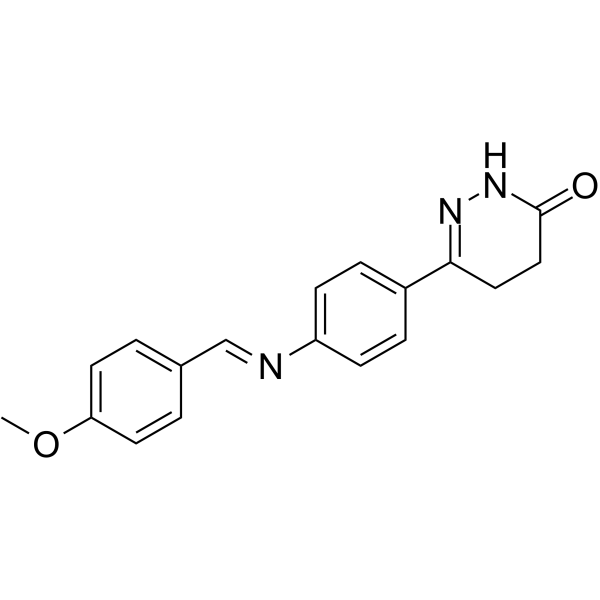
- HY-162006
-
|
|
PKC
Pim
|
Cancer
|
|
Pim-1 kinase inhibitor 8 (compound 12) is a potent inhibitor of Pim-1 kinase with an IC50 of 14.3 nM. Pim-1 kinase inhibitor 8 has potent cytotoxicity against MCF-7 and HepG2 cells with IC50s of 0.5 and 5.27 μM, respectively. Pim-1 kinase inhibitor 8 can used in study breast cancer .
|
-
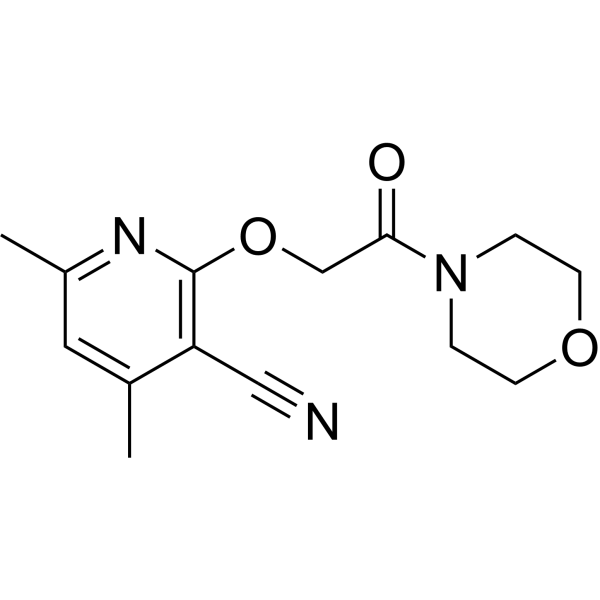
- HY-157516
-
|
|
CDK
|
Cancer
|
|
CDK2-IN-22 (compound 7I) is a potent CDK2 inhibitor with an IC50 of 64.42 nM. CDK2-IN-22 presents a broad antiproliferative efficacy toward diverse cancer cells MV4-11, HT-29, MCF-7, and HeLa with IC50 values of 0.83 μM, 2.12 μM, 3.12 μM, and 8.61 μM, respectively .
|
-
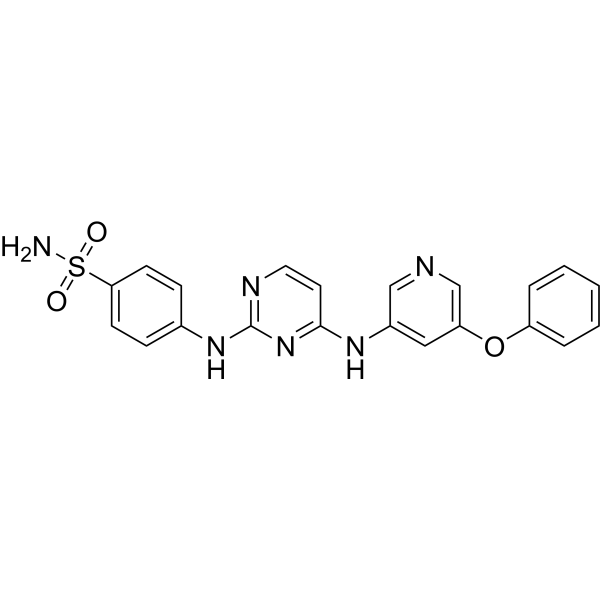
- HY-146228
-
|
|
HSP
Apoptosis
Topoisomerase
EGFR
VEGFR
|
Cancer
|
|
HSP90-IN-13 (compound 5k) is a highly potent HSP90 pan inhibitor with an IC50 value of 25.07 nM. HSP90-IN-13 has multi-target activity against EGFR, VEGFR-2 and Topoisomerase-2. HSP90-IN-13 causes cell cycle arrest at G2/M phase and induces apoptosis of MCF-7 cells through mitochondrial-mediated pathway .
|
-
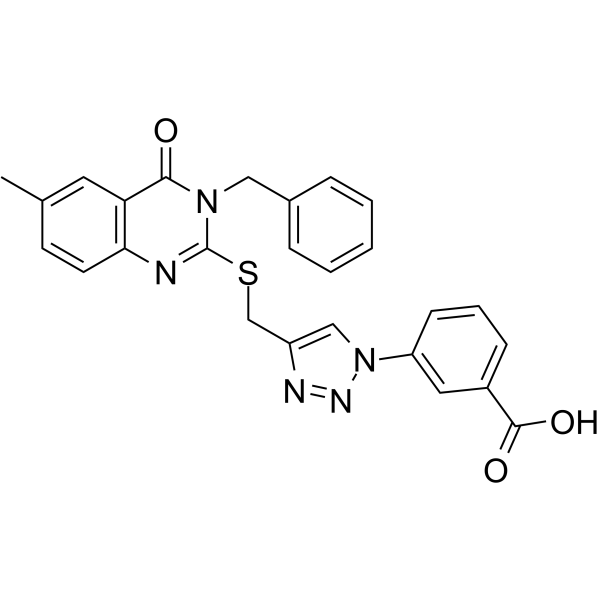
- HY-155061
-
|
|
Cytochrome P450
Aryl Hydrocarbon Receptor
|
Cancer
|
|
hCYP1B1-IN-1 (compound B18) is a hCYP1B1 inhibitor (IC50=3.6 nM),as well as an antagonist of Aryl Hydrocarbon Receptor. hCYP1B1-IN-1 exhibtis suitable metabolic stability and good cell-permeability. hCYP1B1-IN-1 inhibits migration of MCF-7 cells .
|
-
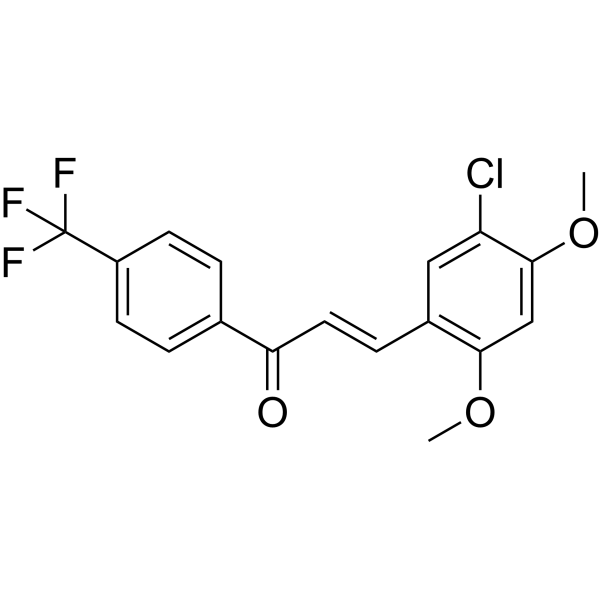
- HY-155203
-
|
|
Apoptosis
Reactive Oxygen Species
Ferroptosis
|
Cancer
|
|
Anticancer agent 154 (Compound 8h) increases the levels of reactive oxygen species and leads to mitochondrial damage. Anticancer agent 154 induces cell apoptosis and DNA damage. Anticancer agent 154 also induces ferroptosis by reducing the GSH level and GPX4 expression and increasing the lipid peroxidation level. Anticancer agent 154 inhibits cancer cell (HT29, H1975, A549, and MCF-7) proliferation with IC50s of 1.0-1.9 μM .
|
-
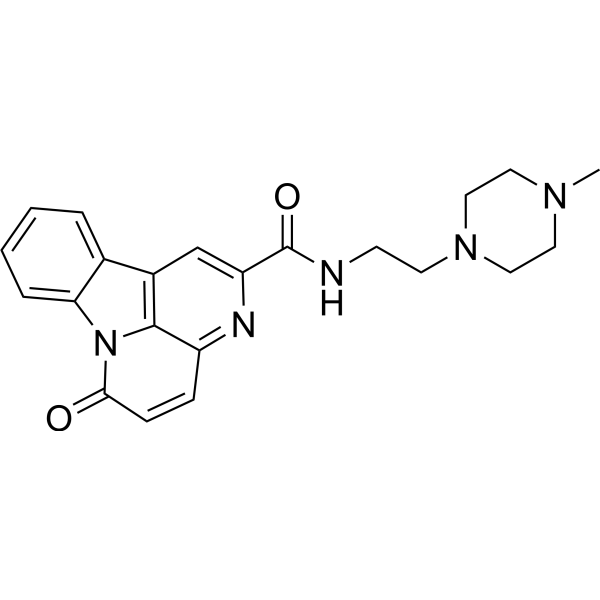
- HY-147852
-
|
|
Raf
|
Cancer
|
|
B-Raf IN 7 (compound 6a) is a potent B-Raf inhibitor, with an IC50 of 110.23 nM. B-Raf IN 7 exhibits antitumor activity against colon carcinoma (HCT-116), mammary gland (MCF-7), hepatocellular carcinoma (HEPG-2), human cervical carcinoma (Hela) and human prostate cancer (PC-3) cells, with IC50 values of 7.50, 9.87, 10.57, 11.63 and 12.83 µM .
|
-
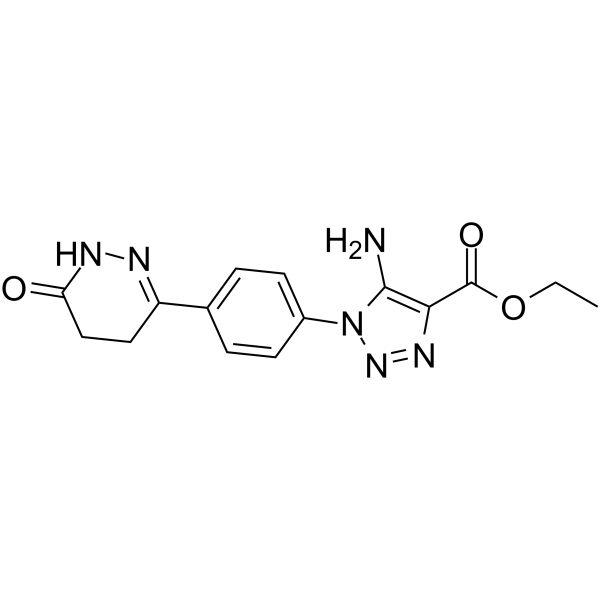
- HY-155242
-
|
|
VEGFR
Bcl-2 Family
Apoptosis
|
Cancer
|
|
VEGFR-2-IN-36 (compound 15) is a VEGFR-2 inhibitor (IC50: 0.067 μM) and inducer of apoptosis with anticancer activity. VEGFR-2-IN-36 upregulates BAX levels and downregulates Bcl-2 levels. VEGFR-2-IN-36 is toxic to cancer cells, MCF-7 (IC50=0.42 μM) and HepG2 (IC50=0.22 μM) .
|
-
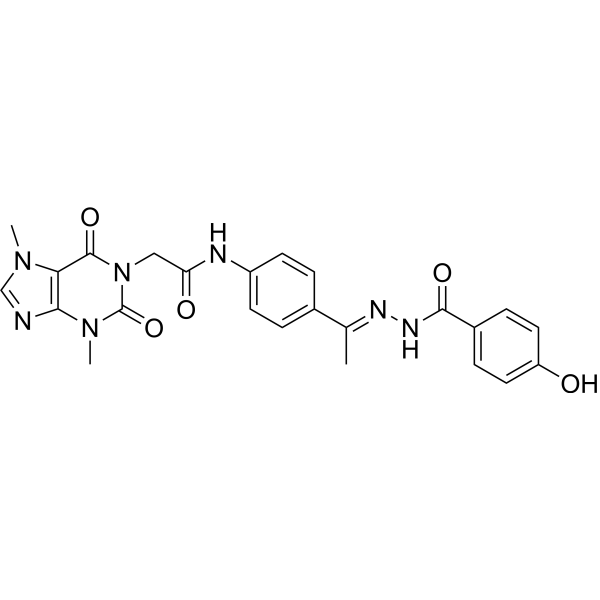
- HY-160062
-
|
|
Mucin
|
Cancer
|
|
S2.2 aptamer sodium is a nucleic acid aptamer targeting the mucin MUC1 and can be used for targeted imaging of MCF-7 cancer cells. S2.2 aptamer sodium was labeled with Cy5, and when fluorescent silicon nanodots (SiND) were present, the fluorescence was quenched; when MUC1 was also present, the fluorescence was restored. S2.2 aptamer sodium detects MUC1 with a linear range of 3.33-250 nM .
|
-
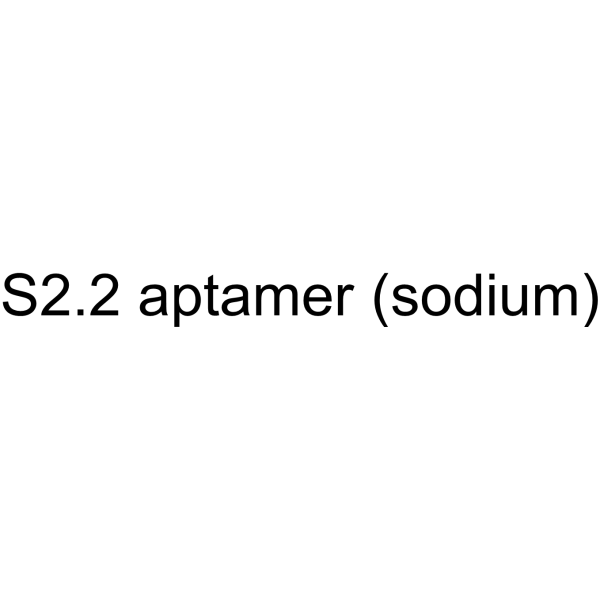
- HY-157942
-
|
|
Cytochrome P450
|
Cancer
|
|
CYP1B1-IN-7 (compound 2a) is a selective inhibitor of CYP1B1 (IC50: 75 nM). CYP1B1-IN-7 also reverses resistance (IC50: 29 μM) and exhibits cytotoxicity in the CYP1B1-overexpressing MCF-7 cell line that is resistant to Docetaxel (HY-B0011) .
|
-
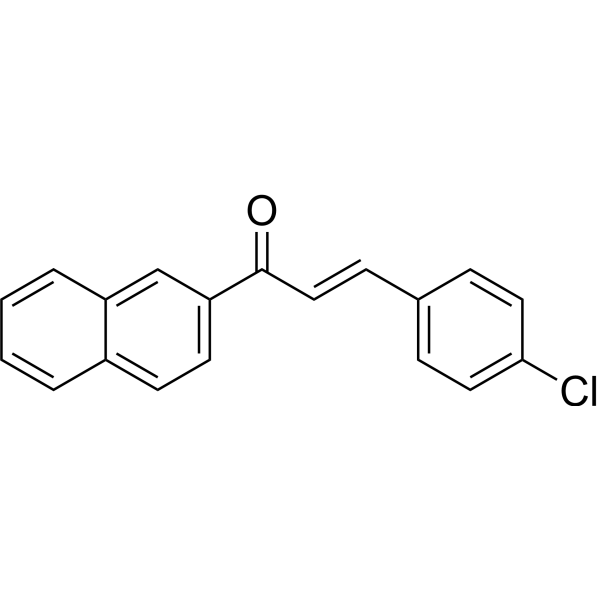
- HY-161324
-
|
|
Microtubule/Tubulin
|
Cancer
|
|
Tubulin degrader 1 (Compound 5i) is a BML284 (HY-19987) derivative that is an orally active colchicine-site noncovalent tubulin degradation agent with IC50 values ranging from 0.02 to 0.05 μM against the five tumor cell lines (Hela, HCT116, MCF-7, K562 and Molm-13). Tubulin degrader 1 has antiproliferative activity that effectively suppressed tumor growth .
|
-
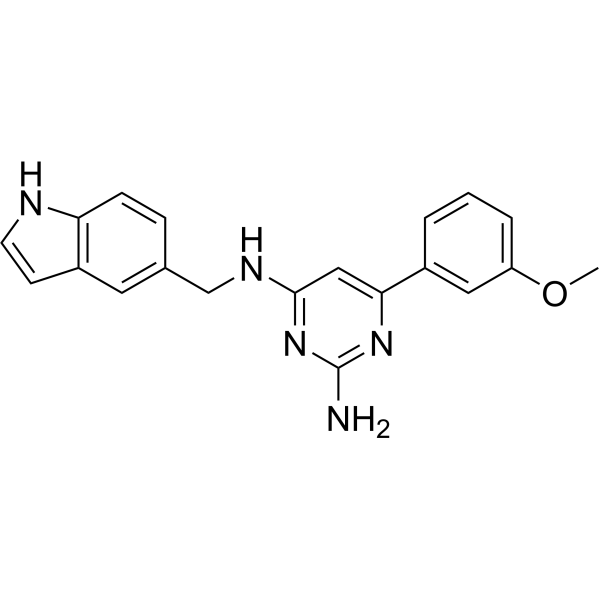
- HY-147202
-
|
|
Epigenetic Reader Domain
|
Cancer
|
|
BRD4 Inhibitor-24 (compound 3U) is a potent BRD4 inhibitor, BRD4 Inhibitor-24 shows antitumor activity against MCF7 and K652 cells, with IC50 values of 33.7 and 45.9 μM, respectively (extracted from patent CN107721975A) .
|
-
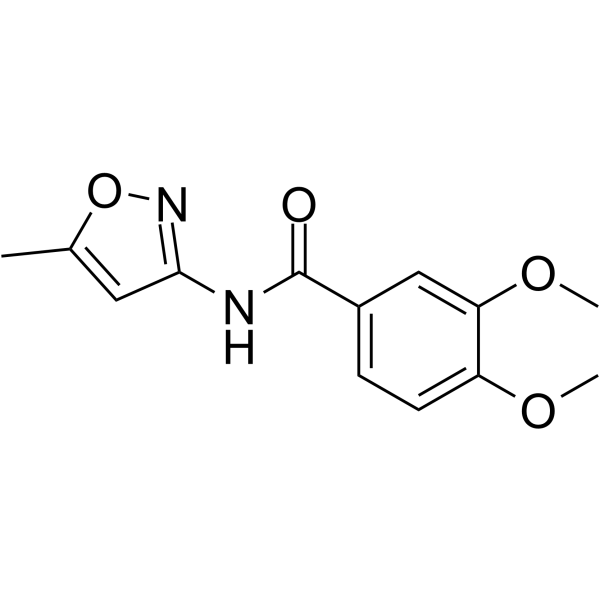
- HY-151573
-
|
|
EGFR
CDK
|
Cancer
|
|
EGFR/CDK2-IN-1 (Compound 3b) is an EGFR/CDK2 inhibitor. EGFR/CDK2-IN-1 shows good cytotoxicity against MCF7 and HepG2 cells. EGFR/CDK2-IN-1 can be used in cancer research .
|
-
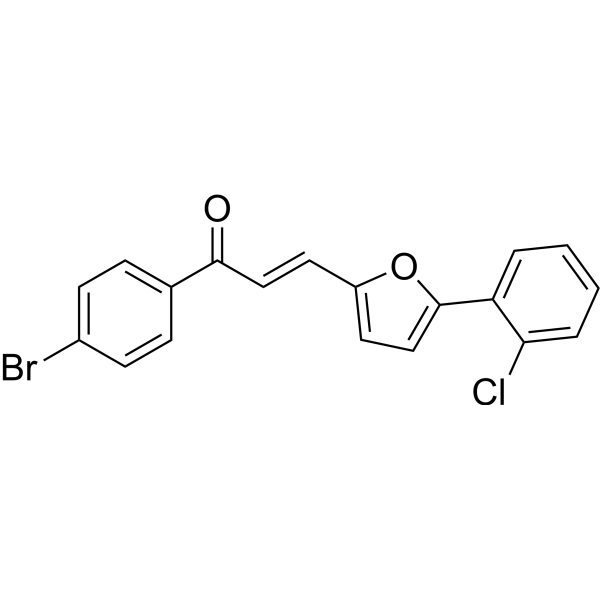
- HY-129152
-
|
|
Influenza Virus
|
Infection
|
|
Ganoderic acid T-N, a triterpenoid, is a H5N1 and H1N1 influenza neuraminidase (NA) inhibitor with IC50s of 2.7 μM and 42 μM, respectively. Ganoderic acid T-Q shows cytotoxicity against MCF7 cells (CC50=24.4 μM) .
|
-
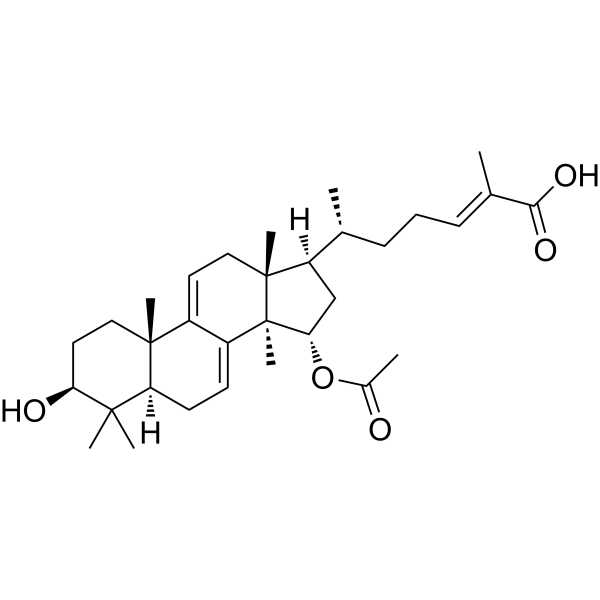
- HY-117102
-
|
|
Aryl Hydrocarbon Receptor
Checkpoint Kinase (Chk)
|
Cancer
|
|
ANI-7 is an activator of aryl hydrocarbon receptor (AhR) pathway. ANI-7 inhibits the growth of multiple cancer cells, and potently and selectively inhibits the growth of MCF-7 breast cancer cells with a GI50 of 0.56 μM. ANI-7 induces CYP1-metabolizing mono-oxygenases by activating AhR pathway, and also induces DNA damage, checkpoint Kinase 2 (Chk2) activation, S-phase cell cycle arrest, and cell death in sensitive breast cancer cell lines .
|
-
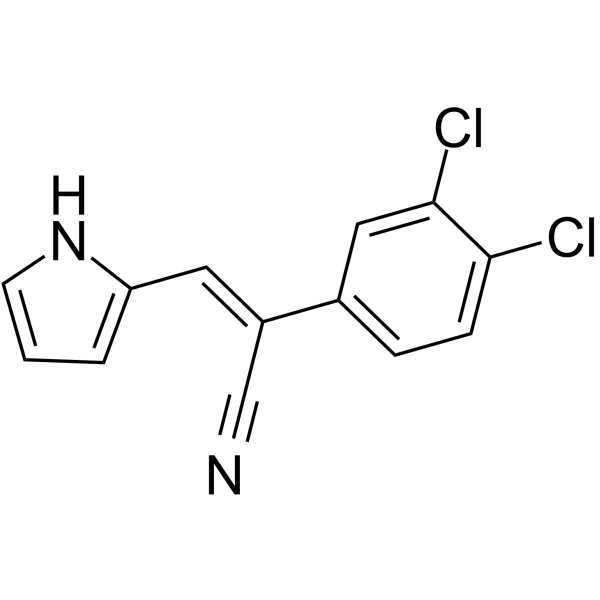
- HY-120275
-
|
|
Bcl-2 Family
Apoptosis
|
Cancer
|
|
CYD-2-11 is a selective Bax agonist with a Ki value of 34.1 nM. CYD-2-11 induces cell apoptosis and shows antiproliferative activity to breast cancer MDA-MB-231 and MCF-7 cell lines with IC50 values of 3.22 and 3.81 μM, respectively. CYD-2-11 suppresses tumor growth in MDA-MB-231 tumor models. CYD-2-11 can be used for the research of breast and lung cancer .
|
-
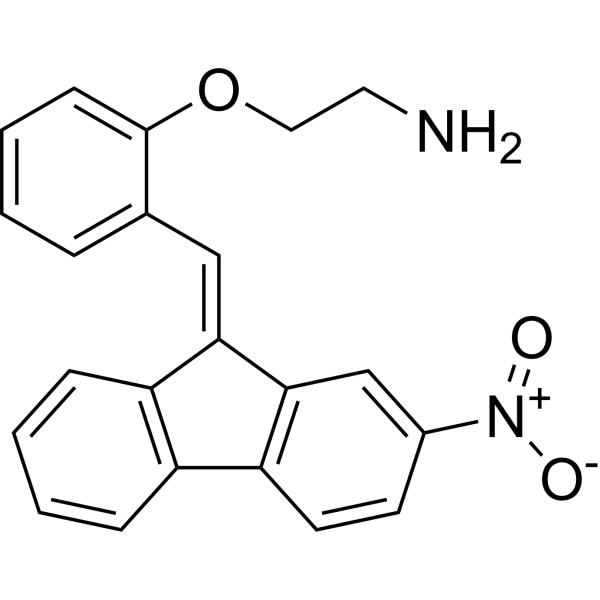
- HY-155177
-
|
|
CDK
|
Cancer
|
|
CDK9-IN-27 (Compound 6a) is a CDK9 inhibitor (IC50s: 0.424 μM). CDK9-IN-27 induces apoptosis and cell cycle arrest at S stage. CDK9-IN-27 has cytotoxic action against HepG2, HCT-116 and MCF-7 cell lines, with IC50s of 10.31-40.34 μM. CDK9-IN-27 can be used for cancer research .
|
-
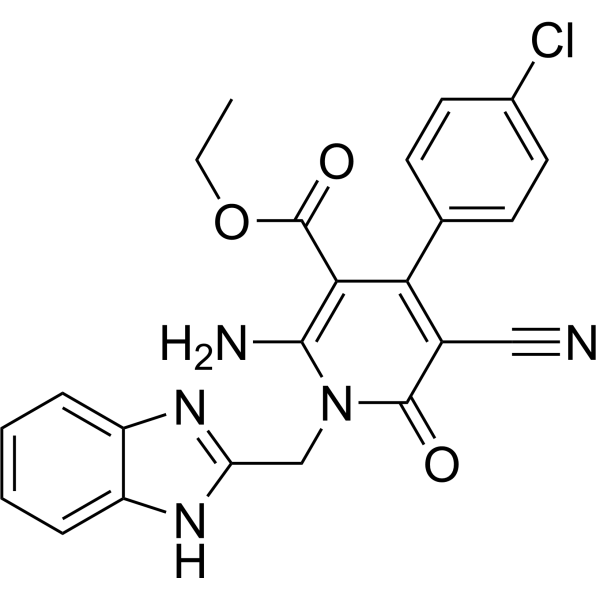
- HY-124053
-
|
|
HDAC
|
Cancer
|
|
BRD2492 (compound 6d) is a potent, selective HDAC1 and HDAC2 inhibitor with IC50s of 13.2 nM and 77.2 nM, respecrtively. BRD2492 exhibits >100-fold selectivity for HDAC1/2 over selectivity over HDAC3 and HDAC6. BRD2492 inhibits breast cancer cell lines growth with IC50s of 1.01 μM and 11.13 μM for T-47D and MCF-7 cells, respectively .
|
-
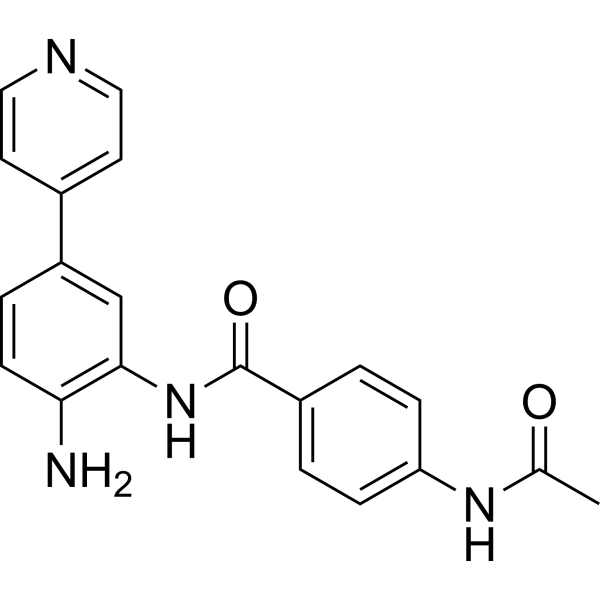
- HY-151154
-
|
|
EGFR
|
Cancer
|
|
EGFR/HER2/DHFR-IN-1 is a potent anticancer agent with high selectivity against MCF-7 breast cancer cells. EGFR/HER2/DHFR-IN-1 is a multiple inhibitor of EGFR/HER2 kinase and DHFR, with IC50s of 0.153 μM, 0.108 μM, 0.291 μM, respectively. EGFR/HER2/DHFR-IN-1 arrests cell cycle at G1/S and induces cells apoptosis .
|
-
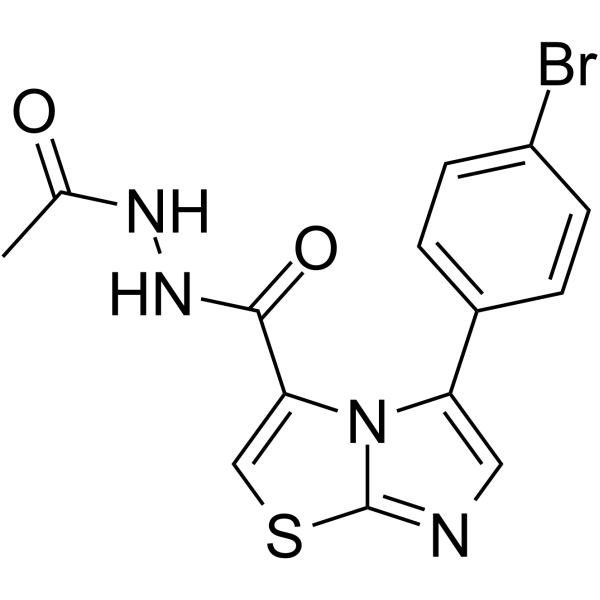
- HY-146103
-
|
|
Apoptosis
Reactive Oxygen Species
|
Cancer
|
|
Antiproliferative agent-7 (compound 8f) is a potent anti-proliferative agent. Antiproliferative agent-7 has antiproliferative activity against cancer cell lines MCF-7, MDA-MB-231, HCT-116 and FR-2 with IC50s of 3.5 μM, 15.54 μM, 30.43 μM and 34.8 μM, respectively. Antiproliferative agent-7 can increase ROS production and induce apoptosis .
|
-
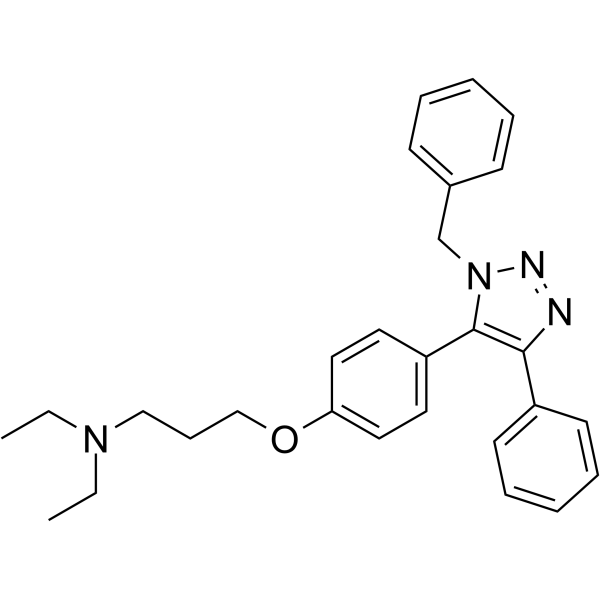
- HY-144749
-
|
|
Others
|
Cancer
|
|
AKR1C3-IN-5 (Compound 6e) is a potent inhibitor of AKR1C3. AKR1C3 enzyme is overexpressed in hormone-dependent prostate and breast tumors. AKR1C3-IN-5 derived from drupanin, which exhibits half-maximal inhibitory concentration (IC50) of 9.6 ± 3 μM and selectivity index (SI) of 5.5 against MCF-7 cells .
|
-
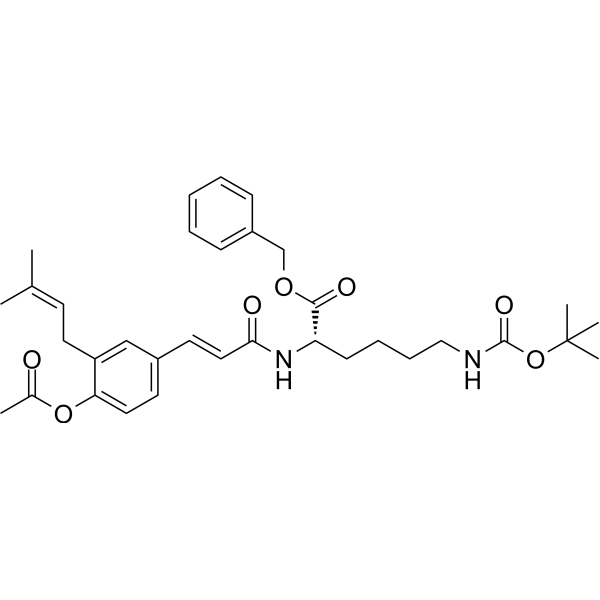
- HY-151158
-
|
|
EGFR
|
Cancer
|
|
EGFR/HER2-IN-7 is a potent anticancer agent with high selectivity against MCF-7 breast cancer cells. EGFR/HER2-IN-7 is a EGFR/HER2 kinase and DHFR inhibitor, with IC50s of 0.18 μM (EGFR), 0.146 μM (HER2), respectively. EGFR/HER2-IN-7 shows moderate inhibition on DHFR (IC50=0.907 μM) .
|
-
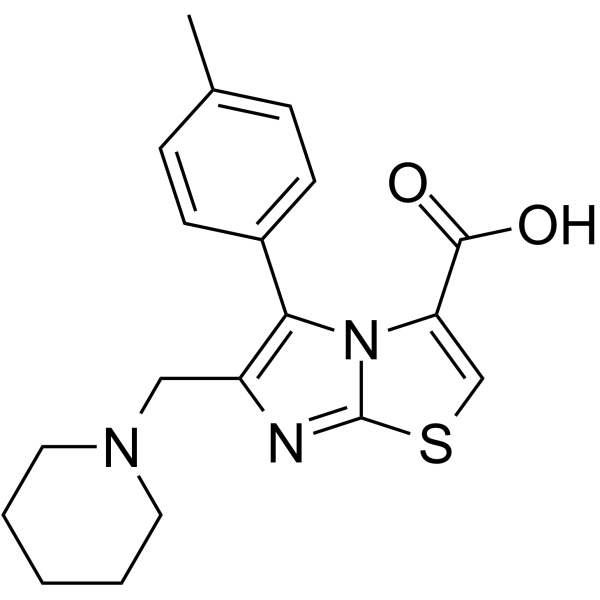
- HY-155965
-
|
|
VEGFR
PARP
Apoptosis
|
Cancer
|
|
VEGFR/PARP-IN-1 (Compound 14b) is a VEGFR/PARP dual inhibitor (IC50s: 191 nM and 60.9 nM respectively). VEGFR/PARP-IN-1 inhibits DNA damage repair, induces cell apoptosis, and arrests cell in the G2/M phase. VEGFR/PARP-IN-1 has good antiproliferative efficacy against BRCA wild-type breast cancer cells (IC50: 4.1 and 3.5 μM for MDA-MB-231 and MCF-7 cells). VEGFR/PARP-IN-1 is an antitumor and anti-metastasis agent .
|
-
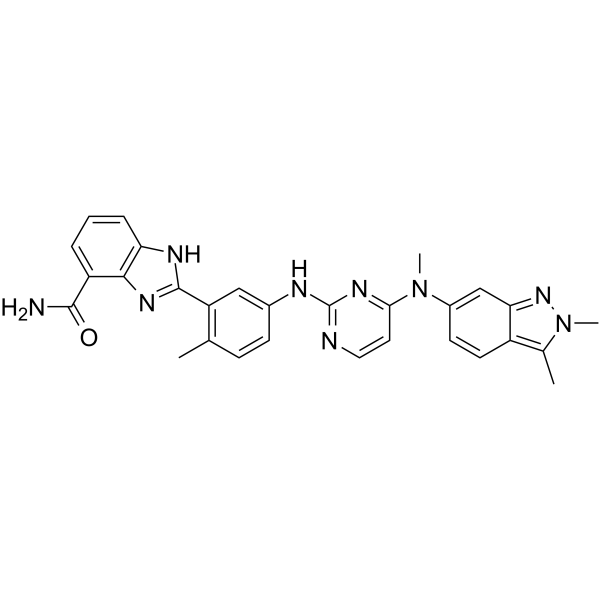
- HY-155382
-
|
|
Monocarboxylate Transporter
|
Others
Cancer
|
|
Lactate transportor 1 (compound 1) is an active lactate transporter in living cells. Lactate transportor 1 displays the cytotoxic effect, with IC50 values of 3.36, 3.27,5.58 and 7.66 μM in Hela, CAL27, MCF7 and MCF10A, respectively. Lactate transportor 1 has an additive effect with Cisplatin (HY-17394) observed in HeLa cells .
|
-
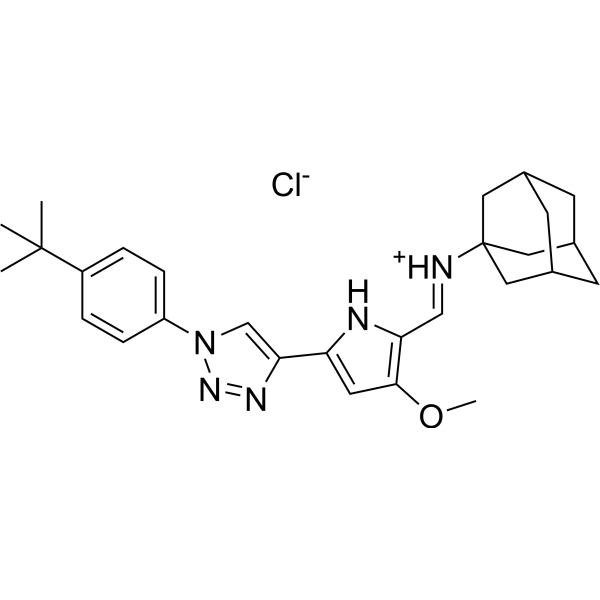
- HY-149636
-
|
|
EGFR
CDK
VEGFR
|
Cancer
|
|
Multi-target kinase inhibitor 2 (compound 5K) is a multi-targeted kinase inhibitor, and exhibits activity against EGFR, Her2, VEGFR2, and CDK2 enzymes, with IC50 values ranging from 40 to 204 nM. Multi-target kinase inhibitor 2 shows cytotoxic effects were observed against HepG2, HeLa , MDA-MB-231 and MCF-7, with IC50 of 41, 57, 51 and 59 μM. Multi-target kinase inhibitor 2 induces cell cycle arrest and apoptosis in HepG2 cells.
|
-
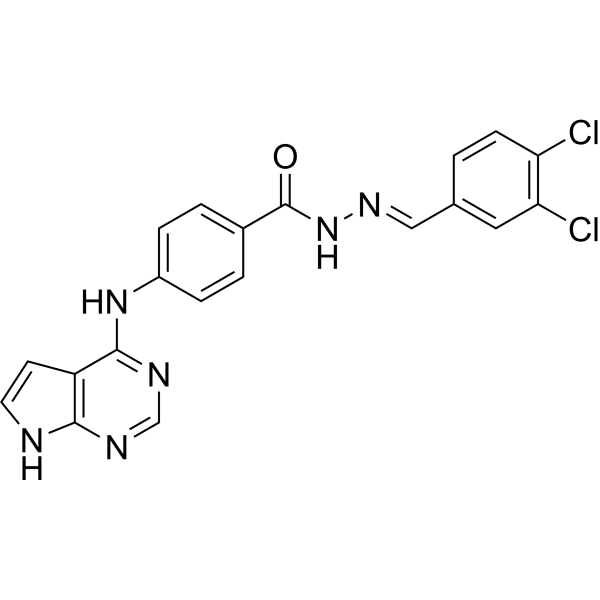
- HY-156444
-
|
|
HDAC
CDK
Apoptosis
|
Cancer
|
|
HDAC1/CDK7-IN-1 (compound 8e) is a dual CDK7 and HDAC1 inhibitor with IC50s of 893 nM and 248 nM, respectively. HDAC1/CDK7-IN-1 inhibits the growth cells of MDA-MB-231, MCF-7, A549, and HCT-116 cancer cells. HDAC1/CDK7-IN-1 induces cell cycle arrest and apoptosis in HCT-116 cells, as well as hindered the migration of HCT-116 cells .
|
-
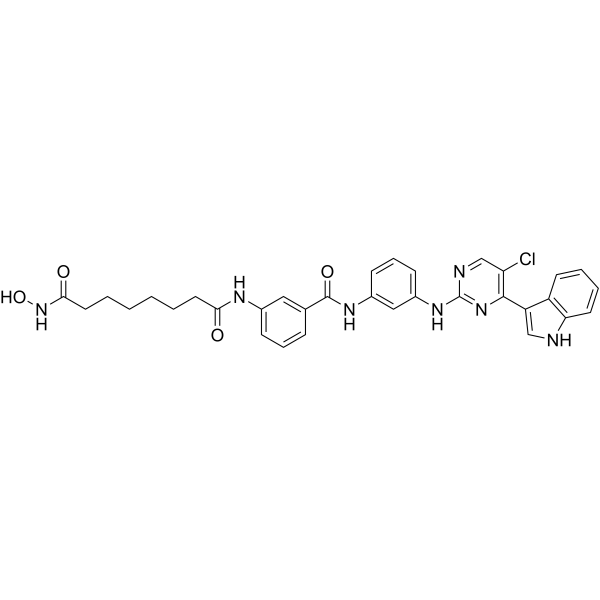
- HY-146440
-
|
|
Histone Demethylase
Estrogen Receptor/ERR
Apoptosis
|
Cancer
|
|
LSD1/ER-IN-1 (compound 11g) is a potent ER and LSD1 inhibitor, with an IC50 of 1.55 μM (LSD1). LSD1/ER-IN-1 has high affinity selectivity for ERα protein, with α/β ratio of 7.11. LSD1/ER-IN-1 shows good antiproliferative activity against MCF-7 breast cancer cells, with an IC50 of 8.79 μM .
|
-
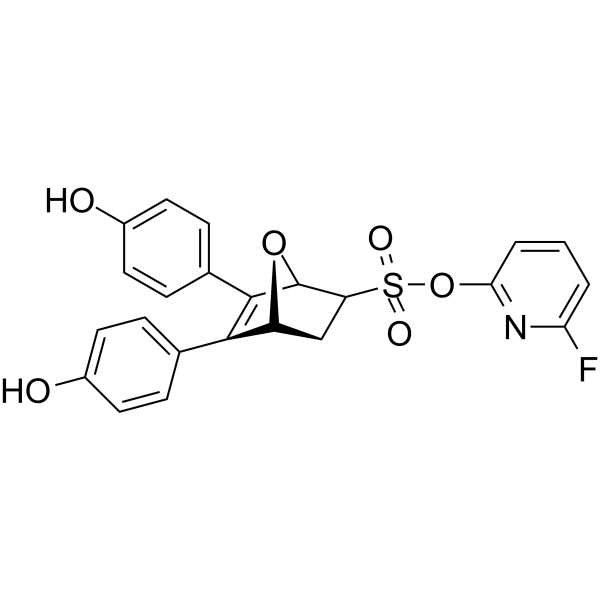
- HY-146169
-
|
|
Reactive Oxygen Species
Microtubule/Tubulin
|
Cancer
|
|
Antitumor agent-68 is a potent tubulin inhibitor. Antitumor agent-68 shows potent anticancer activity with IC50s of 3.6 and 3.8 μM for HeLa and MCF-7 cells, respectively. Antitumor agent-68 exhibits good scavenging activity of ROS and DPPH radical in a dose-dependent manner . Antitumor agent-68 is a click chemistry reagent, it contains an Alkyne group and can undergo copper-catalyzed azide-alkyne cycloaddition (CuAAc) with molecules containing Azide groups.
|
-
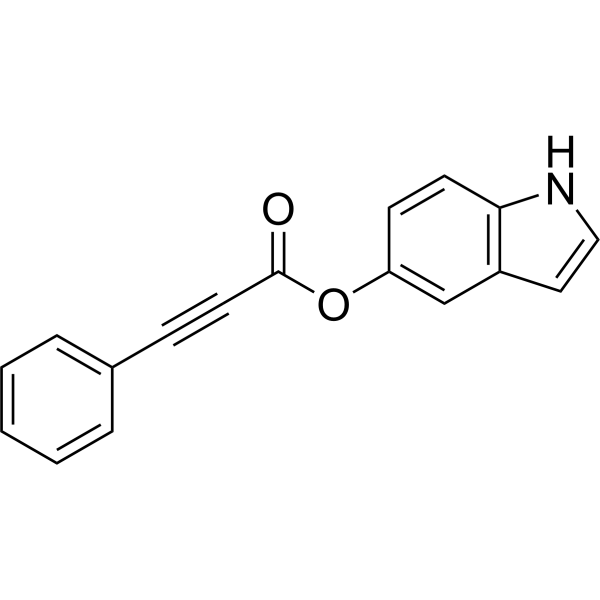
- HY-155113
-
|
|
PROTACs
HSP
|
Cancer
|
|
PROTAC Hsp90α degrader 1 (Compound X10g) is a selective PROTAC Hsp90α degrader. PROTAC Hsp90α degrader 1 can be used for breast cancer research. PROTAC Hsp90α degrader 1 inhibits the proliferation of MDA-MB-231, MDA-MB-468, MCF-7, MX-1 cells with IC50s of 51.48 μM, 16.46 μM, 8.93 μM, 11.95 μM respectively .
|
-
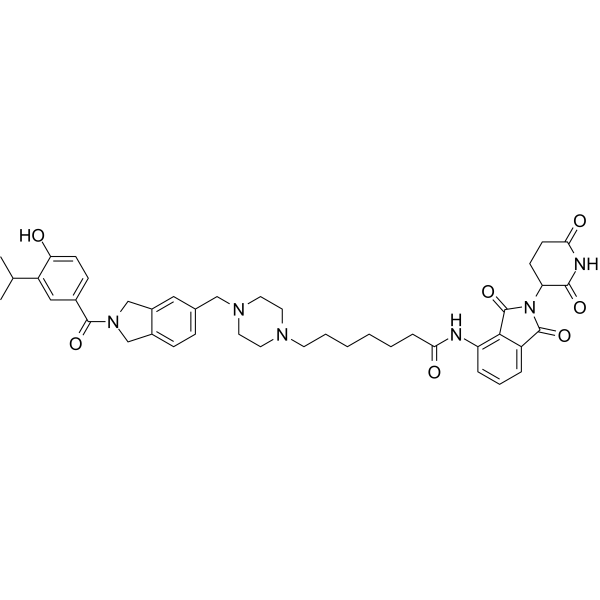
- HY-146238
-
|
|
EGFR
Thymidylate Synthase
Apoptosis
|
Cancer
|
|
EGFR/HER2/TS-IN-1 (Compound 4d) is an EGFR, HER2 and TS (Thymidylate synthase) inhibitor with IC50 values of 0.203, 0.088 and 0.168 μM against EGFR, HER2 and TS, respectively. EGFR/HER2/TS-IN-1 induces MCF7 cell apoptosis .
|
-
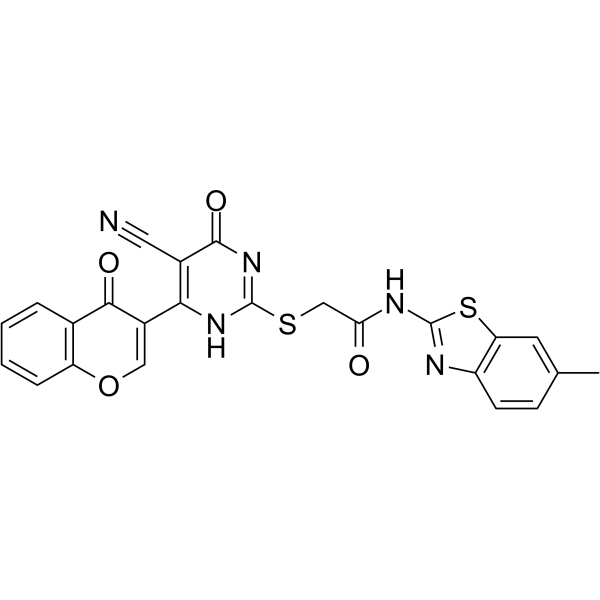
- HY-115997
-
|
|
PROTACs
HSP
|
Cancer
|
|
PROTAC HSP90 degrader BP3 is a potent and selective degradation of HSP90 in a CRBN-dependent fashion. PROTAC HSP90 degrader BP3 has a certain degradation effect on HSP90 protein in MCF-7 cells (DC50=0.99 μM). PROTAC HSP90 degrader BP3 inhibits the growth of breast cancer cell . PROTAC HSP90 degrader BP3 is a click chemistry reagent, it contains an Alkyne group and can undergo copper-catalyzed azide-alkyne cycloaddition (CuAAc) with molecules containing Azide groups.
|
-
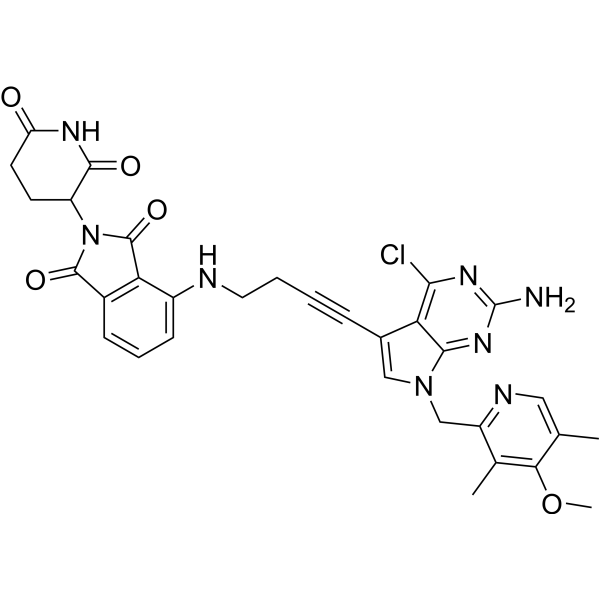
- HY-155197
-
|
|
Microtubule/Tubulin
Estrogen Receptor/ERR
|
Cancer
|
|
ER degrader 7 (Compound 35t) is an ERα and ERβ degrader. ER degrader 7 inhibits tubulin polymerization. ER degrader 7 inhibits cell viability with IC50s of 0.06, 2.56, 15.84, 1.59, 1.67, 1.37 μM for MCF-7, T47D, MCF-10A, LCC2, T47D D538G, and T47D Y537S cells respectively. ER degrader 7 also inhibits breast cancer tumor growth .
|
-
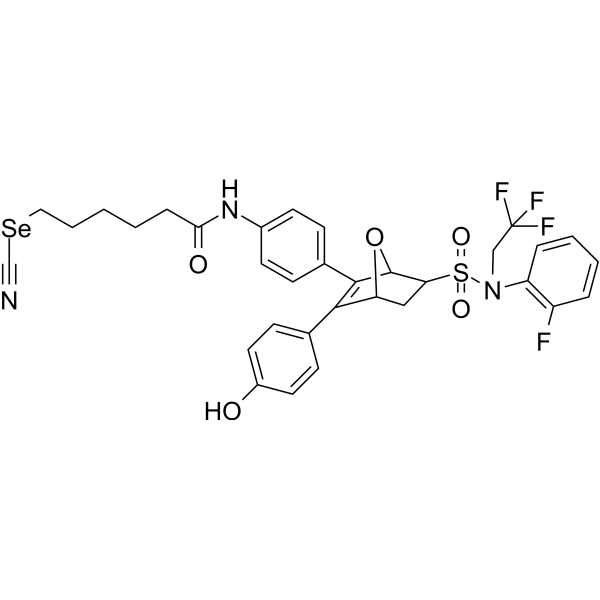
- HY-156912
-
|
|
EGFR
|
Cancer
|
|
Tyrosine kinase-IN-7 (compound 13h) is an inhibitor of the tyrosine kinase EGFR. The IC50s for inhibiting EGFR(WT) and EGFR(T790M) are 0.630 μM and 0.956 μM respectively. Tyrosine kinase-IN-7 has antitumor activity against four cancer cell lines (HepG2, HCT-116, MCF-7, and A431) with IC50s of 13.02 μM, 10.14 μM, 12.68 μM, and 47.05 μM, respectively .
|
-
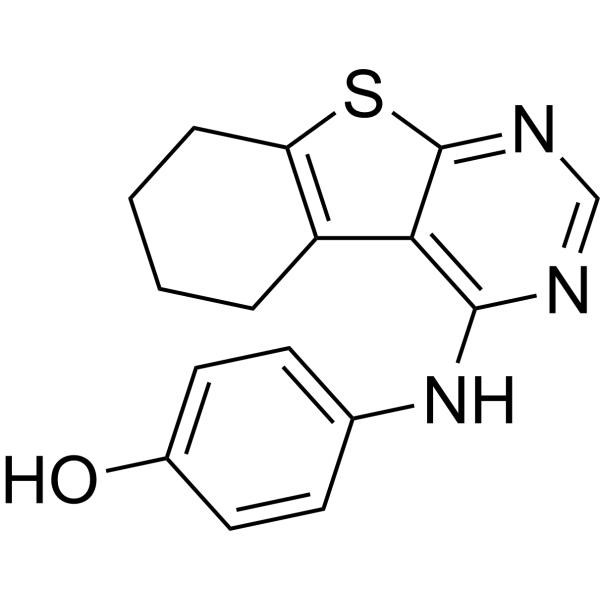
- HY-135453
-
|
|
Bacterial
|
Infection
|
|
(-)-Pinocembrin exhibits anti-mycobacterium activity against mycobacteriuum tuberculosis H37Ra with an IC50 value of 1.11 mg/mL in dormant phase and 1.21 mg/mL in active phase, respectively. (-)-Pinocembrin has potent antiproliferative activity with IC50 values of 1.88-11.00 mg/mL against THP-1, A549, Panc-1, HeLa and MCF7 cell lines .
|
-
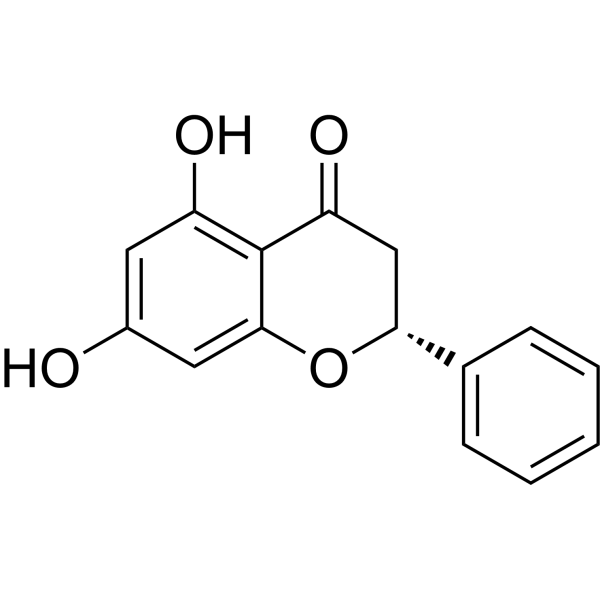
- HY-146080
-
|
|
Apoptosis
|
Cancer
|
|
Antitumor agent-61 (Compound 9b), Irinotecan (Ir) derivative, is a potential antitumor agent. Antitumor agent-61 displays potent activity with IC50s of 0.92, 1.39, 1.75, 2.20, 3.05 and 3.23 μM against five human cancer cells SK-OV-3, SK-OV-3/CDDP, U2OS, MCF-7, A549 and MG-63, respectively. Antitumor agent-61 induces SK-OV-3 cells apoptosis through mitochondrion pathways .
|
-
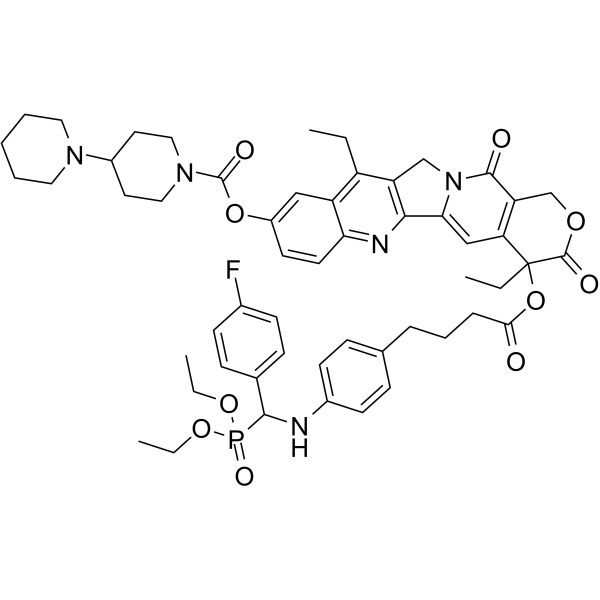
- HY-157161
-
|
|
11β-HSD
|
Cancer
|
|
11β-HSD2-IN-1 (compound CDSN) is a potent inhibitor of 11β-HSD2, inhibiting the metabolism of Cholestane-3β,5α,6β-triol (CT) in cells by 11β-HSD2 into the tumor promoter, carcinosterone. 11β-HSD2-IN-1 inhibits testosterone biosynthesis, thereby inhibiting MCF-7 cell proliferation. 11β-HSD2-IN-1 has immune activity and antiviral infection effects .
|
-
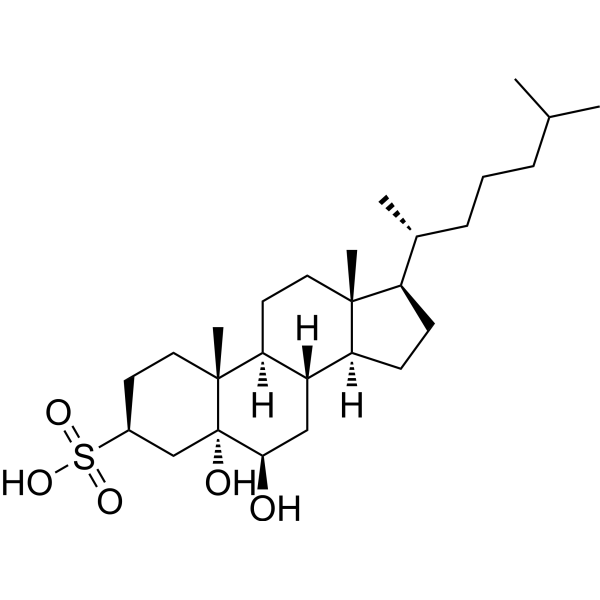
- HY-138098
-
|
|
Others
|
Cancer
|
|
Sartorypyrone B is a 2β-acetoxyl analogue of chevalone C. Sartorypyrone B is yielded from the ethyl acetate extract of the culture of the marine sponge-associated fungus Neosartorya tsunodae (KUFC 9213). Sartorypyrone B exhibits strong growth inhibitory activity, having GI50s of 17.8, 20.5, and 25.0 μM, respectively, for MCF-7, NCI-H460, and A375-C5. Sartorypyrone B has the potential for the research of breast adenocarcinoma, non-small cell lung cancer, and melanoma diseases .
|
-
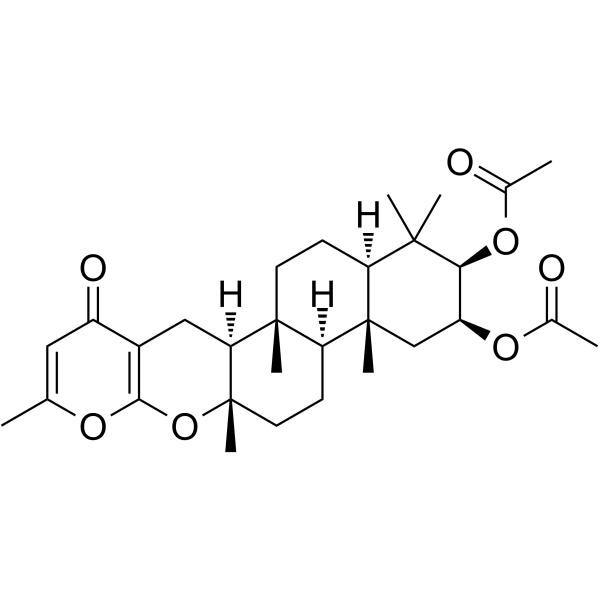
- HY-N10621
-
|
|
Others
|
Cancer
|
|
3,5-Dimethoxy-2,7-phenanthrenediol (compound 2) is a phenanthrene compound isolated from the roots of Combretum laxum. 3,5-Dimethoxy-2,7-phenanthrenediol is cytotoxic to human cancer cell lines 786-0, MCF-7 and NCI/ADR-RES, with IC50s of 73.26 μM, 118.40 μM and 83.99 μM respectively. 3,5-Dimethoxy-2,7-phenanthrenediol also has free radical scavenging activity with an IC50 of 20.4 μM .
|
-
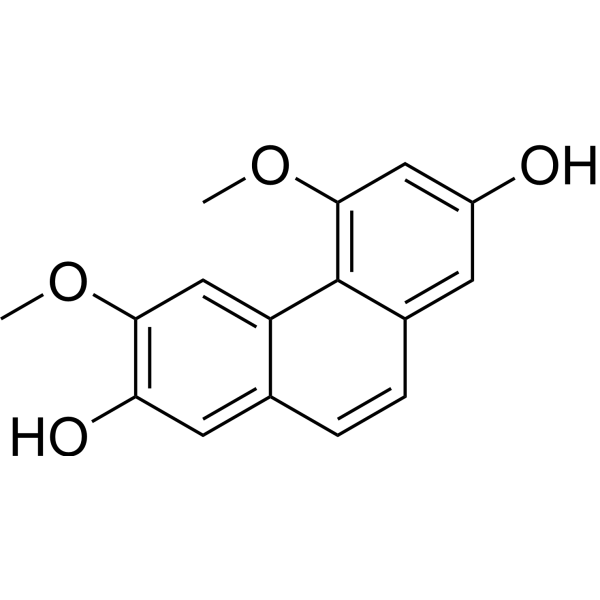
- HY-143233
-
|
|
Pim
HDAC
Apoptosis
|
Cancer
|
|
PIM-1/HDAC-IN-1 (compound 4d) is a PIM-1 inhibitor, with an IC50 of 343.87 nM. PIM-1/HDAC-IN-1 has strong inhibitory activity and selectivity against HDAC 1 and HDAC 6, with IC50 values of 63.65 and 62.39 nM, respectively. PIM-1/HDAC-IN-1 exhibits apoptosis inducing potential in MCF-7 cell lines. PIM-1/HDAC-IN-1 shows pre-G1 apoptosis and cell cycle arrest at G2/M phase .
|
-
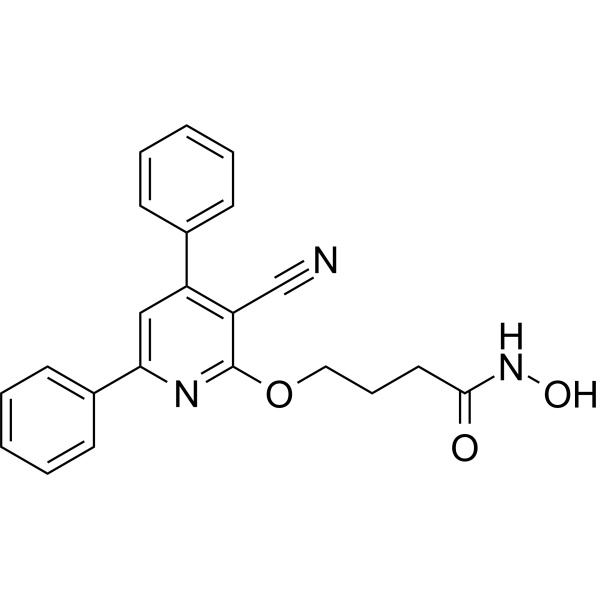
- HY-N9174
-
|
|
Others
|
Cancer
|
|
5,7,3',4'-Tetrahydroxy-3-methoxy-8,5'-diprenylflavone is a natural product that can be extracted from B. papyrifera. 5,7,3',4'-Tetrahydroxy-3-methoxy-8,5'-diprenylflavone has potent anti-proliferation effects on ER-positive breast cancer cells, with an IC50 value of 4.41 μM for MCF-7 cells. 5,7,3',4'-Tetrahydroxy-3-methoxy-8,5'-diprenylflavone also reduces the tumor growth in the BCAP-37 xenograft .
|
-
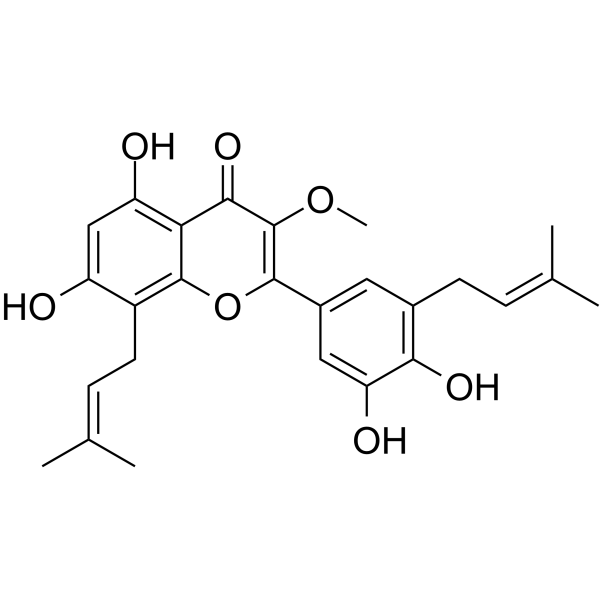
- HY-156018
-
|
|
PI3K
|
Cancer
|
|
PI3Kα-IN-13 (Compound 18a) is a PI3Kα inhibitor (IC50: 2.5 nM). PI3Kα-IN-13 induces tumor cell apoptosis. PI3Kα-IN-13 inhibits cancer cell proliferation with IC50s of 0.75 μM (MCF-7), 3.79 μM (HCT-116), 13.71 μM (MDA-MB-231), 9.85 μM (SW620), respectively. PI3Kα-IN-13 inhibits tumor cell colony formation, migration and invasion .
|
-
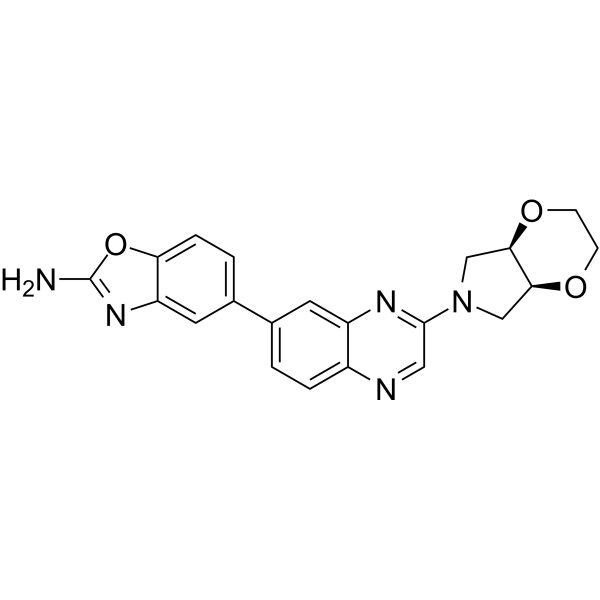
- HY-149407
-
|
|
VEGFR
CDK
EGFR
Necroptosis
Apoptosis
|
Cancer
|
|
Multi-kinase-IN-4 (compound 5d) is multi-targeted kinase inhibitor, including VEGFR2, EGFR, HER2, and CDK2, with IC50 values of 0.33, 0.22, 0.18 and 2.09 μM, respectively. Multi-kinase-IN-4 shows broad-spectrum anti-cancer activities against HepG2, MCF-7, MDA-231, and HeLa cell lines (IC50 = 1.94–7.1 µM), but exhibits lower toxicity in the WI-38 cells (IC50 = 40.85 µM). Multi-kinase-IN-4 induces apoptosis and arrests cell cycle at S phase in HepG2 cells. Multi-kinase-IN-4 has the potential for the research of cancer .
|
-
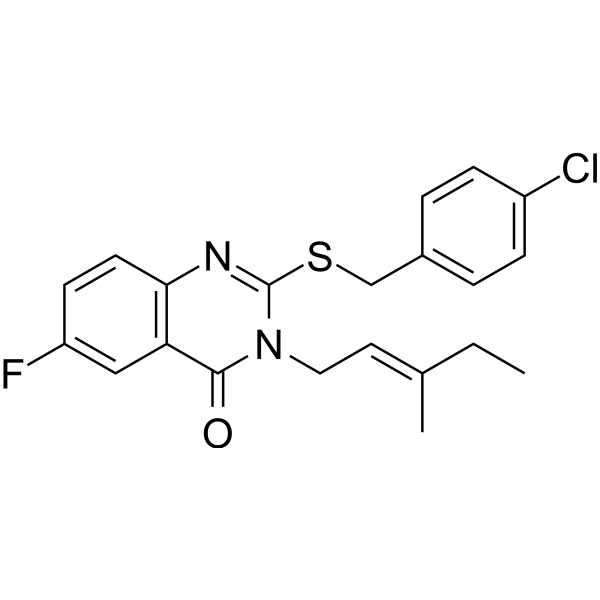
- HY-111846
-
|
|
SNIPERs
PROTACs
Estrogen Receptor/ERR
|
Cancer
|
|
PROTAC ERα Degrader-2 comprises a IAP ligand binding group, a linker and an estrogen receptor α (ERα) binding group. PROTAC ERα Degrader-2 is an ERα degrader. Maximal ERα degradation at 30 μM concentration in human mammary tumor MCF7 cells. Degradation inducers based on cIAP1 are called specific and non-genetic IAP-dependent protein erasers (SNIPERs) .
|
-
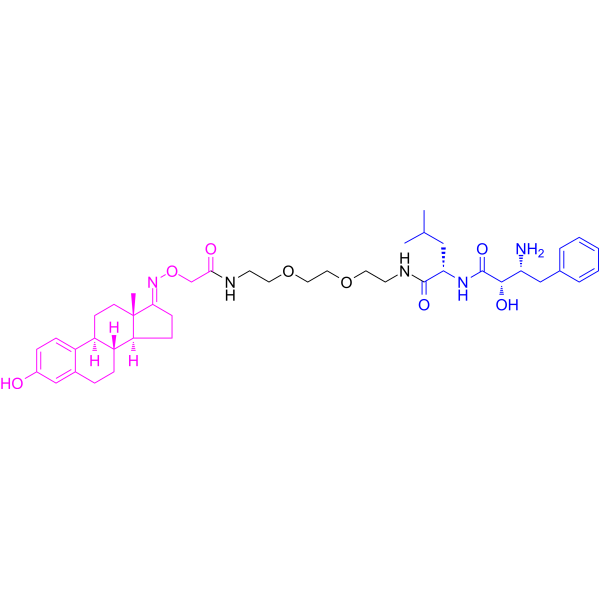
- HY-149633
-
|
|
EGFR
Dihydrofolate reductase (DHFR)
Apoptosis
|
Cancer
|
|
EGFR/HER2/DHFR-IN-3 (compound 4c) is a potent dual inhibitor of EGFR/HER2, with IC50s of 0.138 and 0.092 μM, respectively. EGFR/HER2/DHFR-IN-3 also inhibits DHFR, with an IC50 of 0.193 M. EGFR/HER2/DHFR-IN-3 causes arrest at the S phase of the cell cycle and induces apoptosis in MCF7 breast cancer cells .
|
-
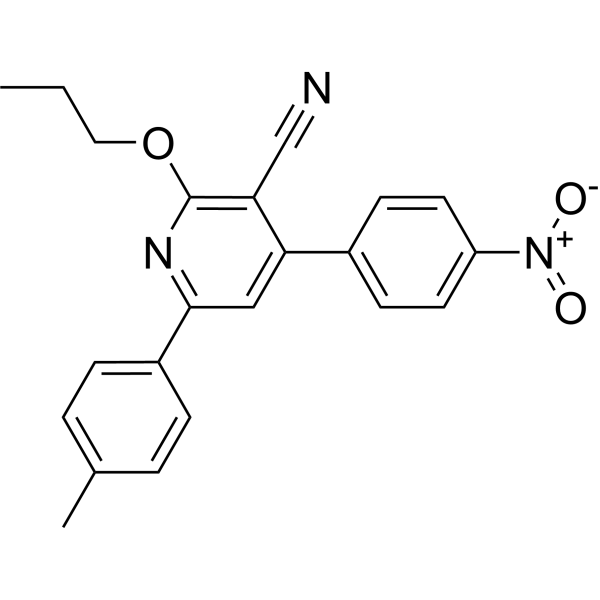
- HY-110193
-
SPP-86
1 Publications Verification
|
RET
|
Cancer
|
|
SPP-86 is a potent and selective cell permeable inhibitor of RET tyrosine kinase, with an IC50 of 8 nM. SPP-86 inhibits RET-induced phosphatidylinositide 3-kinases (PI3K)/Akt and MAPK signaling, also inhibits RET-induced estrogen receptorα (ERα) phosphorylation in MCF7 cells . SPP-86 is a click chemistry reagent, it contains an Alkyne group and can undergo copper-catalyzed azide-alkyne cycloaddition (CuAAc) with molecules containing Azide groups.
|
-
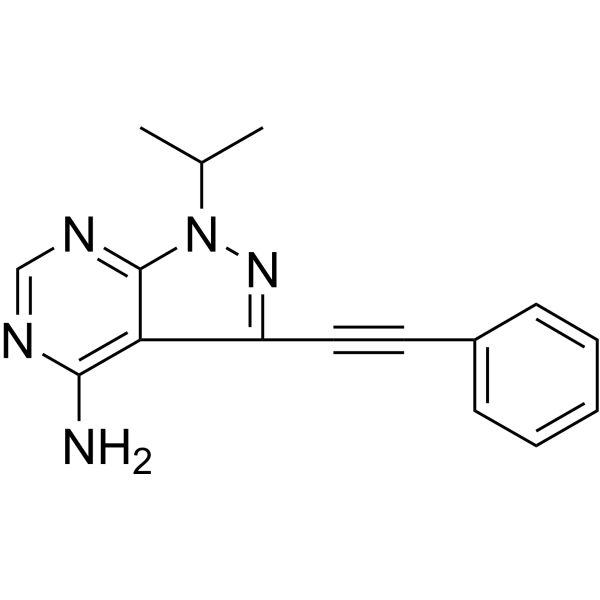
- HY-151459
-
|
|
VEGFR
Bacterial
Dihydrofolate reductase (DHFR)
Fungal
|
Infection
Cancer
|
|
VEGFR-2/DHFR-IN-2 (compound 5b) is an inhibitor of VEGFR-2 and DHFR with IC50s of 0.623 and 9.085 μM, respectively. VEGFR-2/DHFR-IN-2 exhibits good cytotoxic activities against C26, HepG2, and MCF7 cancer cell lines with IC50 values of 3.59-8.38 μM. VEGFR-2/DHFR-IN-2 can be used for the research of cancer .
|
-
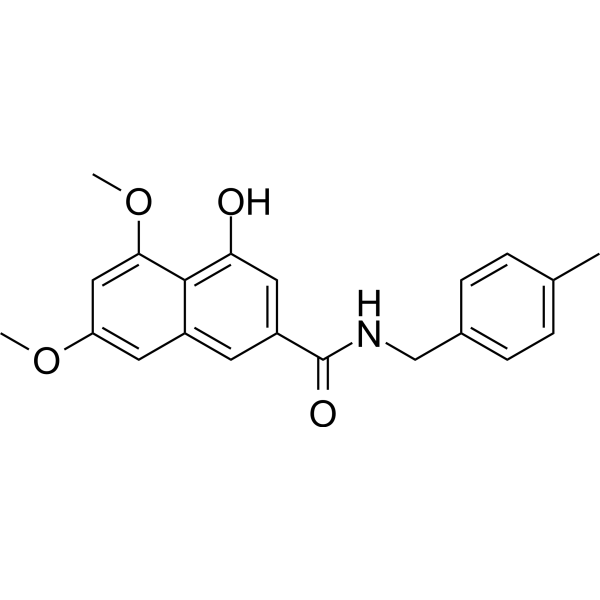
- HY-147825
-
|
|
EGFR
Raf
Apoptosis
|
Cancer
|
|
EGFR/BRAFV600E-IN-1 (Compound 23) is a potent EGFR and BRAF V600E dual inhibitor with IC50s of 0.08 and 0.15 µM, respectively. EGFR/BRAFV600E-IN-1 induces apoptosis and cell cycle arrest in both pre-G1 and G2/M phases. EGFR/BRAFV600E-IN-1 exhibits antiproliferative activity againist A-549, MCF-7, Panc-1, HT-29 with IC50s of 1.2, 0.79, 1.3, and 1.23 µM, respectively .
|
-
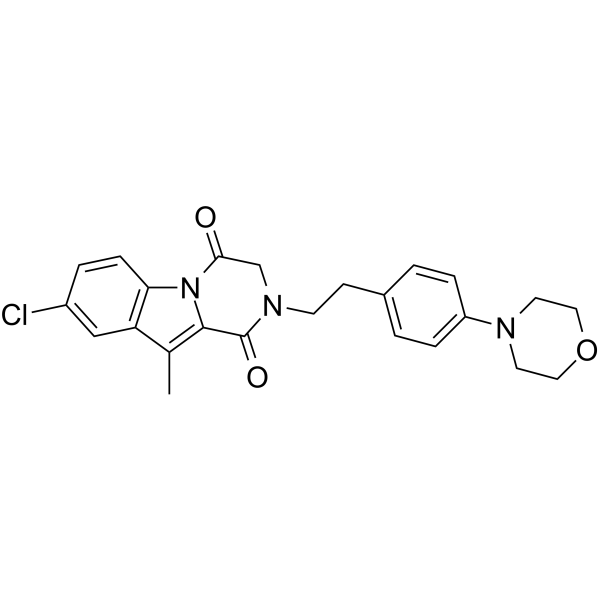
- HY-N10778
-
|
|
Others
|
Others
|
|
(19R,23E)-5b,19-Epoxy19-ethoxycucurbita-6,23-diene-3b,25-diol is a cucurbitane-type triterpenoid. (19R,23E)-5b,19-Epoxy19-ethoxycucurbita-6,23-diene-3b,25-diol has been tested to no effect against 5 cancer cell lines, MCF-7, HepG2, Du145, Colon205 and HL-60 by MTT assay .
|
-
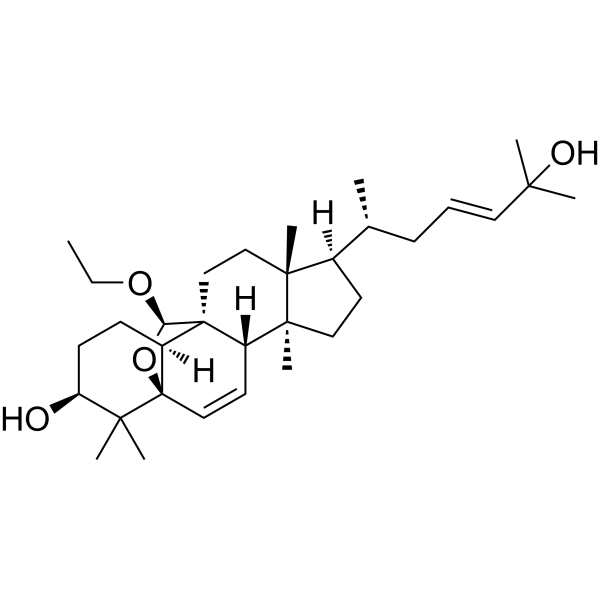
- HY-111640
-
|
|
HIV
Reverse Transcriptase
|
Infection
|
|
3'-Azido-3'-deoxy-5-methylcytidine (CS-92) is a potent xenotropic murine leukemia-related retrovirus (XMRV) inhibitor with a CC50 of 43.5 μM in MCF-7 cells. 3'-Azido-3'-deoxy-5-methylcytidine also inhibits HIV-1 reverse transcriptase with an EC50 of 0.06 μM in peripheral blood mononuclear (PBM) cells . 3'-Azido-3'-deoxy-5-methylcytidine is a click chemistry reagent, it contains an Azide group and can undergo copper-catalyzed azide-alkyne cycloaddition reaction (CuAAc) with molecules containing Alkyne groups. Strain-promoted alkyne-azide cycloaddition (SPAAC) can also occur with molecules containing DBCO or BCN groups.
|
-
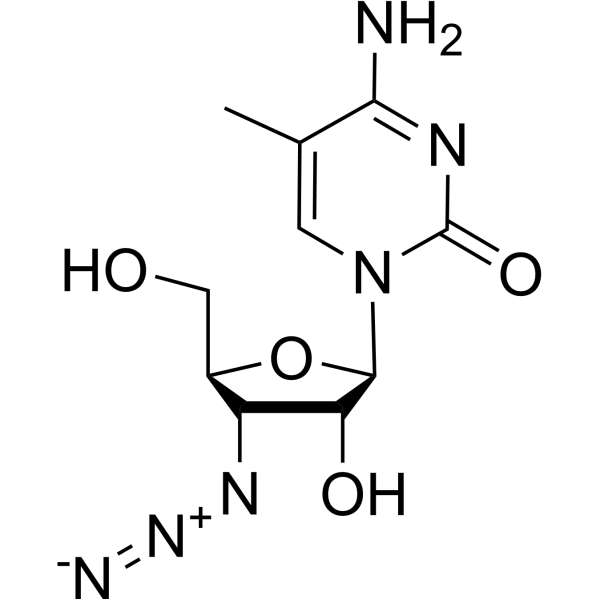
- HY-149632
-
|
|
EGFR
Dihydrofolate reductase (DHFR)
|
Cancer
|
|
EGFR/HER2/DHFR-IN-2 (Compound 4b) is an inhibitor of EGFR, HER2, and DHFR (IC50: 0.248, 0.156, 0.138 μM respectively). EGFR/HER2/DHFR-IN-2 has anticancer activities against a panel of cancer cells (IC50: 9.14, 7.33, 14.18, 24.87, 20.07, 6.16 μM for Hep G2, HeLa, HEp-2, HCT 116, PC-3, MCF7 cells). EGFR/HER2/DHFR-IN-2 reduce breast cancer tumor growth .
|
-
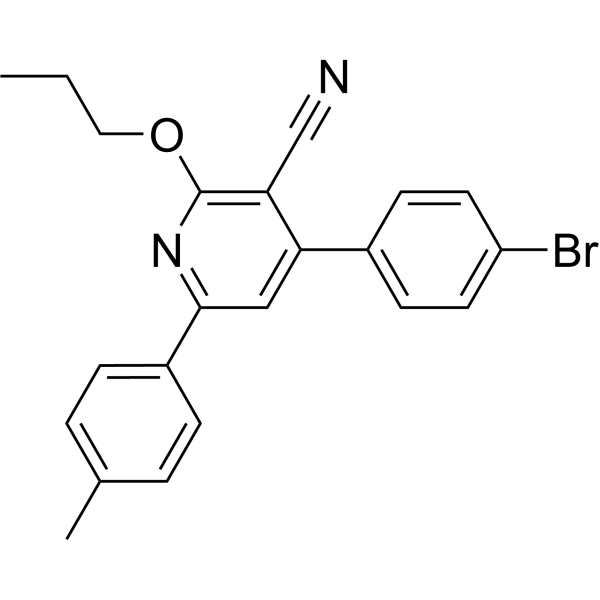
- HY-155180
-
|
|
PI3K
|
Cancer
|
|
FD2056 is a potent and orally active PI3K inhibitor. FD2056 inhibits PI3Kα/PI3Kβ/PI3Kγ/PI3Kδ with IC50s of 0.30, 0.80, 1.10, 0.42 nM. FD2056 also inhibits CDK2-CyclinA2 and CDK4-CyclinD3 with IC50 of 115.95 and 2782.15 nM. FD2056 inhibits breast cancer cell proliferation with IC50s of 1.06, 0.04, 1.40 μM for MDA-MB-231, MDA-MB-468, MCF-7 cells. FD2056 also induces cancer apoptosis and inhibits tumor growth .
|
-
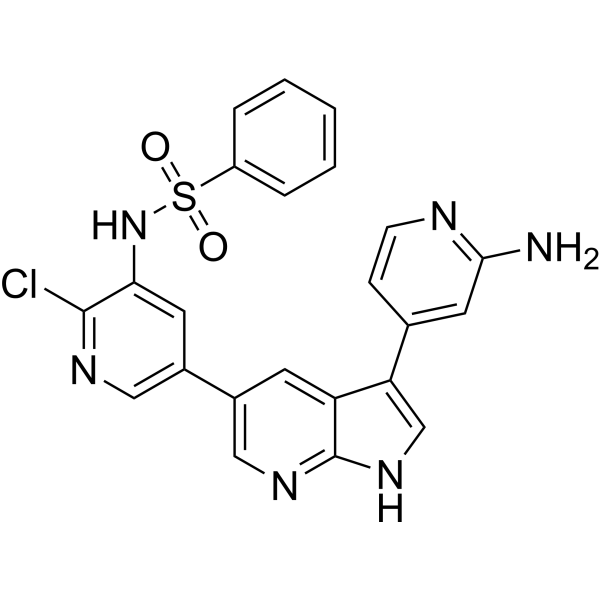
- HY-N12135
-
|
|
Others
|
Cancer
|
|
15α-Hydroxy-20-oxo-6,7-seco-ent-kaur-16-en-1,7α(6,11α)-diolide (compound 2) is an enantio-kaurene diterpenoid (ent -kaurene diterpenoid), which can be isolated from Rubescens rubescens. 15α-Hydroxy-20-oxo-6,7-seco-ent-kaur-16-en-1,7α(6,11α)-diolide has cellular activity against EC-1, U87, A549, MCF-7 and HeLa cell lines Toxicity, IC50s are 37.69 μM, 79.362 μM, 80.07 μM, 197.35 μM, 462.13 μM, and 180.09 μM respectively .
|
-
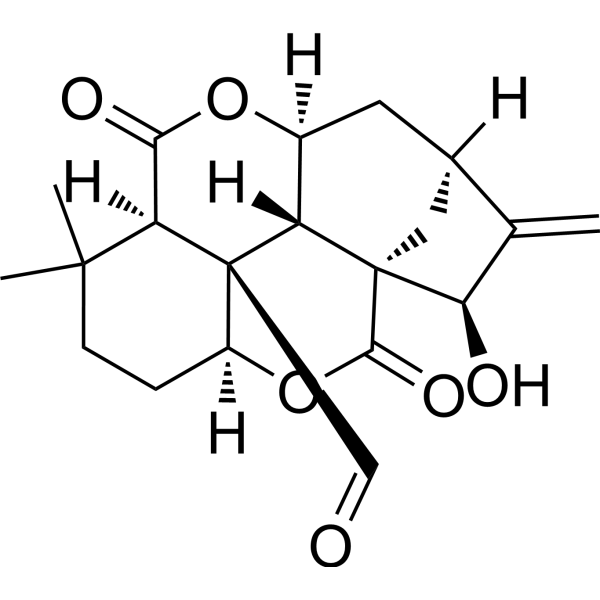
- HY-151458
-
|
|
VEGFR
Bacterial
Dihydrofolate reductase (DHFR)
Fungal
|
Infection
Cancer
|
|
VEGFR-2/DHFR-IN-1 (compound 8b) is an inhibitor of VEGFR-2 and DHFR with IC50s of 0.384 and 7.881 μM, respectively. VEGFR-2/DHFR-IN-1 shows good antibacterial activities against Escherichia coli, Streptococcus faecalis, Salmonella enterica, MSSA and MRSA with MIC values of 16, 16, 16, 8, and 16 μg/mL, respectively. VEGFR-2/DHFR-IN-1 exhibits good cytotoxic activities against C26, HepG2, and MCF7 cancer cell lines with IC50 values of 2.97-7.12 μM. VEGFR-2/DHFR-IN-1 can be used for the research of cancer .
|
-
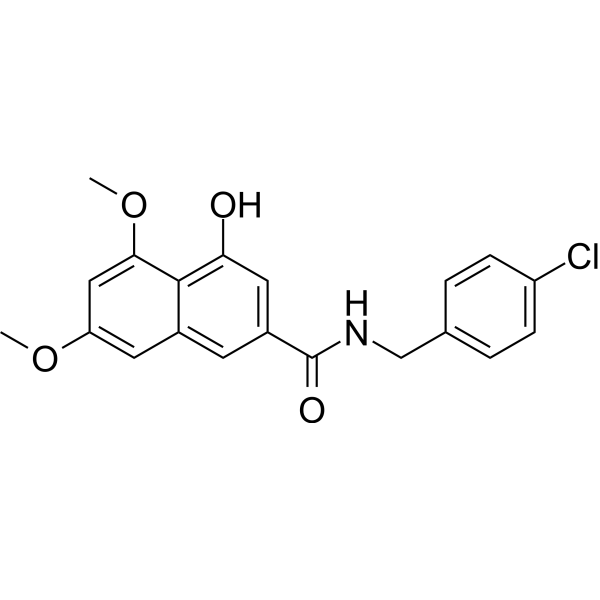
- HY-154978
-
|
|
Others
|
Cancer
|
|
Cisplatin-resistant cells-IN-1 (Compound 8) has high cytotoxicity against Cisplatin (HY-17394)-resistant cells. Cisplatin-resistant cells-IN-1 reduces the metabolic activity effectively in the low nanomolar range (IC50: 0.14–1.79 μM in A549/A549-R, K562/K562-R, and MCF-7/MCF-7TamR cells) .
|
-
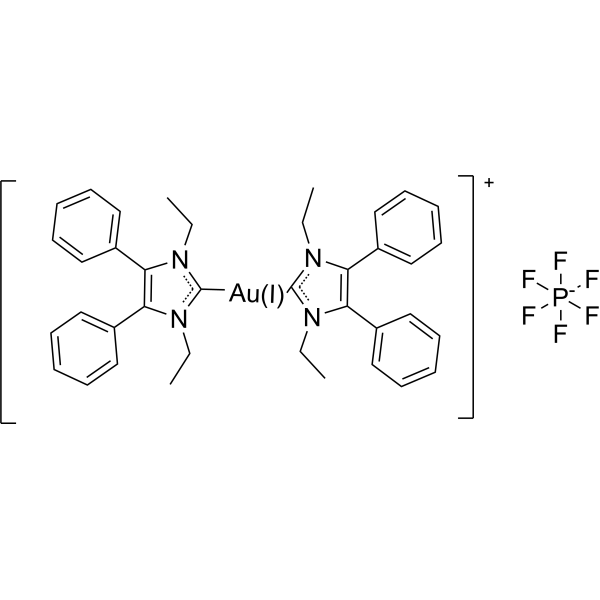
- HY-114803
-
-
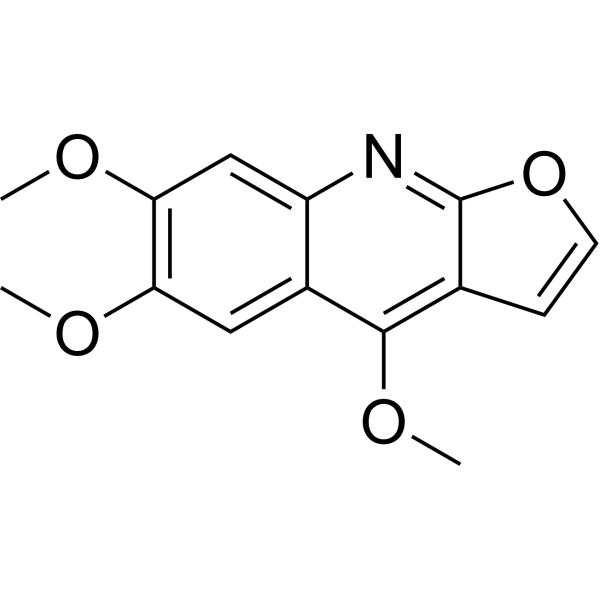
- HY-10815
-
|
|
Sigma Receptor
Apoptosis
|
Neurological Disease
Cancer
|
|
σ1 Receptor antagonist-1 is a highly potent and selective sigma 1 receptor antagonist (pKi=10.28). σ1 Receptor antagonist-1 inhibits cell growth, arrests cell cycle at G0/G1 phase and induces apoptosis of MCF-7/ADR cells .
|
-
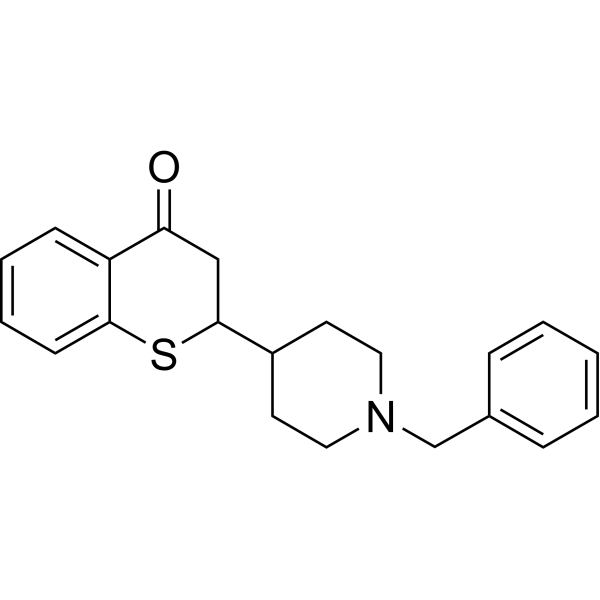
- HY-161260
-
|
|
P-glycoprotein
|
Cancer
|
|
P-gp inhibitor 20 (compound H27) is a low cytotoxicity P-glycoprotein (P-gp) inhibitor. P-gp inhibitor 20 inhibits the efflux function of P-gp in a dose-dependent manner (without affecting the expression of P-gp), thereby reversing the multidrug resistance (MDR) of MCF-7/ADR cells, with an IC50 value of 46.6 nM. P-gp inhibitor 20 can be used for cancer research .
|
-
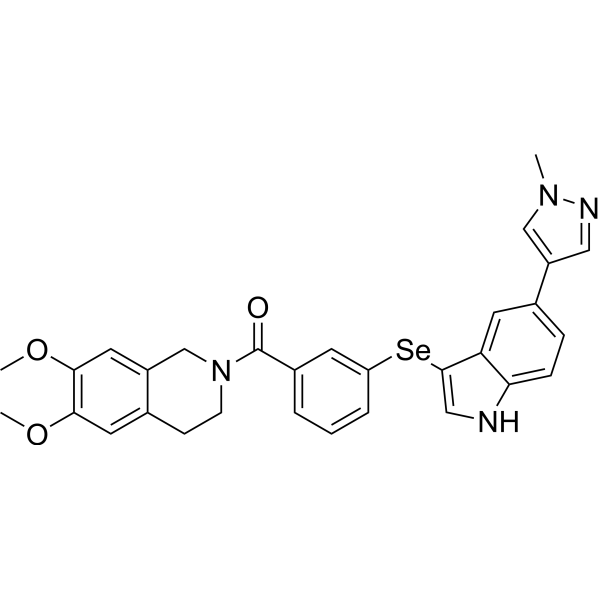
- HY-161171
-
|
|
Parasite
Ephrin Receptor
|
Cancer
|
|
Antimalarial agent 37 (compound 33) is a selective inhibitor against Type Ⅱ kinase with antiplasmodial activity. Antimalarial agent 37 exhibited cytotoxicity and selectivity towards cancer cells HepG2 and MCF 7 .
|
-
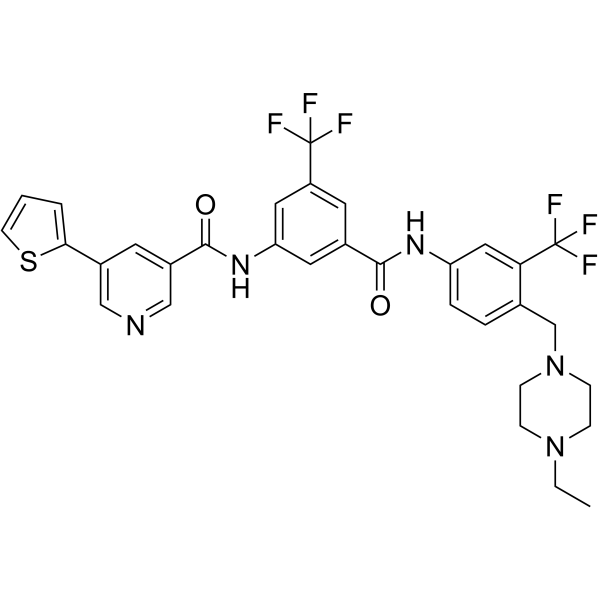
- HY-144666
-
|
|
Glutaminase
|
Cancer
|
|
GLS-1-IN-1 (compound 1d) is a GLS-1 inhibitor. GLS-1-IN-1 shows inhibitory effect against Hep G2, MCF 7, and MCF 10A cells .
|
-
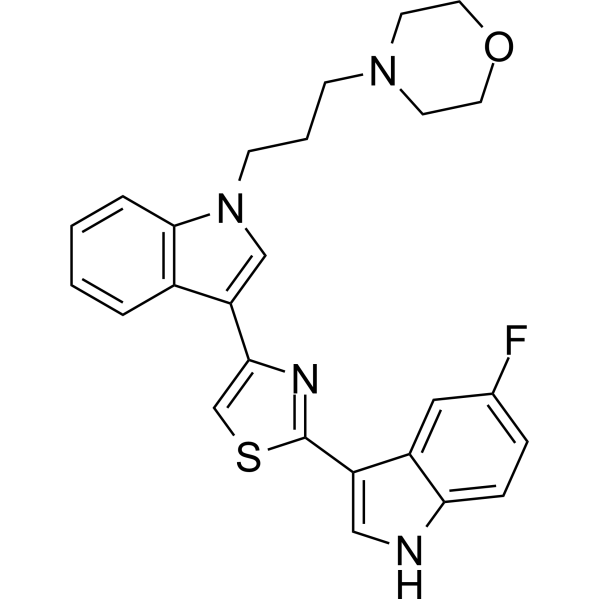
- HY-149360
-
|
|
P-glycoprotein
|
Cancer
|
|
P-gb-IN-1 (compound Ⅲ-8), a 2,5-disubstituted furan derivative, is a highly effective, broadspectrum P-glycoprotein (P-gp) inhibitor. P-gb-IN-1 displayed the reversal activity by inhibiting P-gp efflux. P-gb-IN-1 has a potent affinity to P-gp by forming H-bond interactions with residues Asn 721 and Met 986. P-gb-IN-1 possesses broad-spectrum reversal activity and low toxicity in MCF-7/ADR cells .
|
-
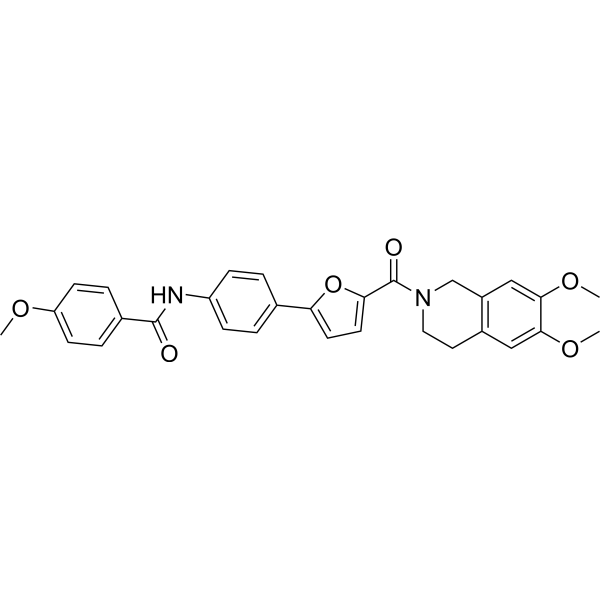
- HY-124647
-
|
|
PI3K
|
Cancer
|
|
PI3Kα-IN-1 is a PI3Kα inhibitor (IC50 < 0.5 nM), and also inhibits mTOR (IC50: 104 nM) .
|
-
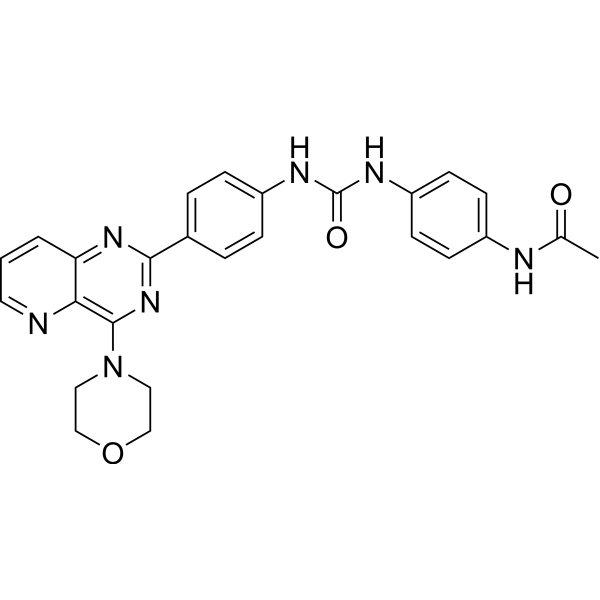
- HY-N12606
-
|
|
Fungal
|
Infection
|
|
Neodidymelliosides A (compound 1)It is a secondary metabolite of fungi and has a significant inhibitory effect on Staphylococcus aureus and Candida albicans biofilms. Neodidymelliosides AIt also has anti-cancer activity and can inhibit KB3.1 (cervix),PC-3 (prostate),MCF-7(breast),SKOV-3 (ovary),A431 (skin )and A549 (lung )Cell viability of cell lines .
|
-
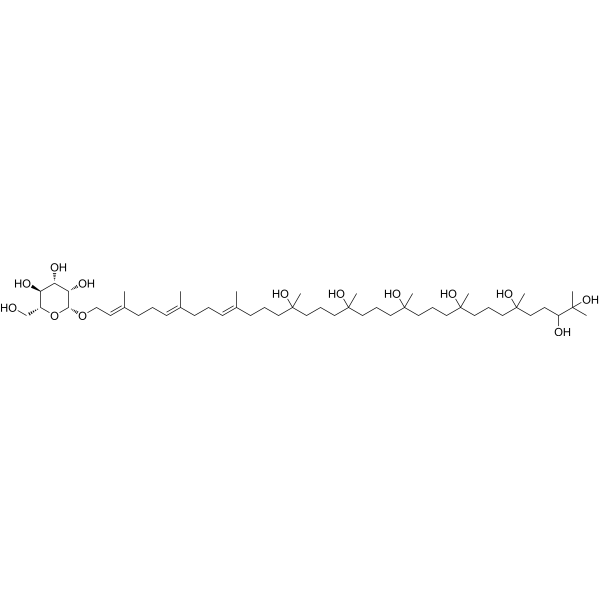
- HY-N3737
-
|
|
Aurora Kinase
PERK
Reactive Oxygen Species
|
Cancer
|
|
Derrone, a prenylated isoflavones, is an Aurora kinase inhibitor, with IC50 values of 6 and 22.3 μM against Aurora B and Aurora A, respectively. Derrone shows anti-tumor activity .
|
-
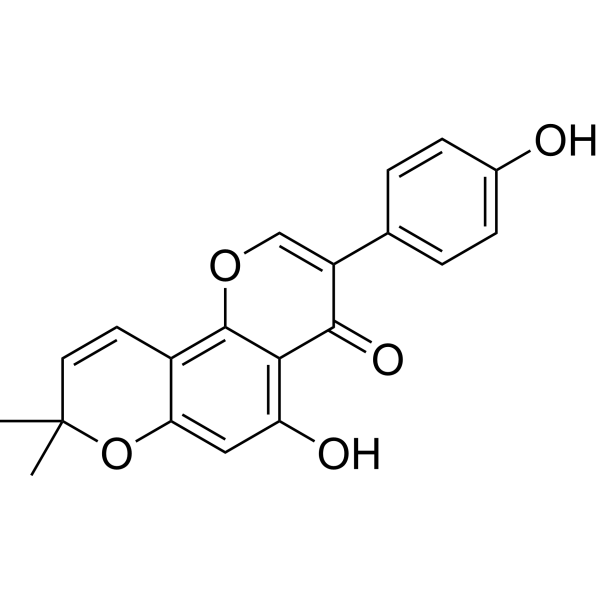
- HY-155784
-
|
|
Sirtuin
Reactive Oxygen Species
Keap1-Nrf2
|
Cancer
|
|
SPC-180002 is a SIRT1/3 dual inhibitor, with IC50 values of 1.13 and 5.41 μM, respectively. SPC-180002 disturbs redox homeostasis via ROS generation, which leads to an increase in both p21 protein stability and mitochondrial dysfunction. SPC-180002 strongly inhibits cell cycle progression and cancer cell growth. SPC-180002 activates the Nrf2 signaling pathway .
|
-
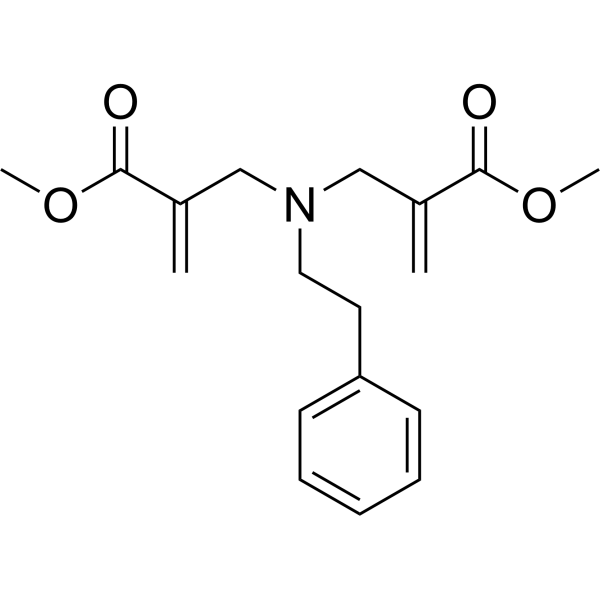
- HY-N11690
-
-
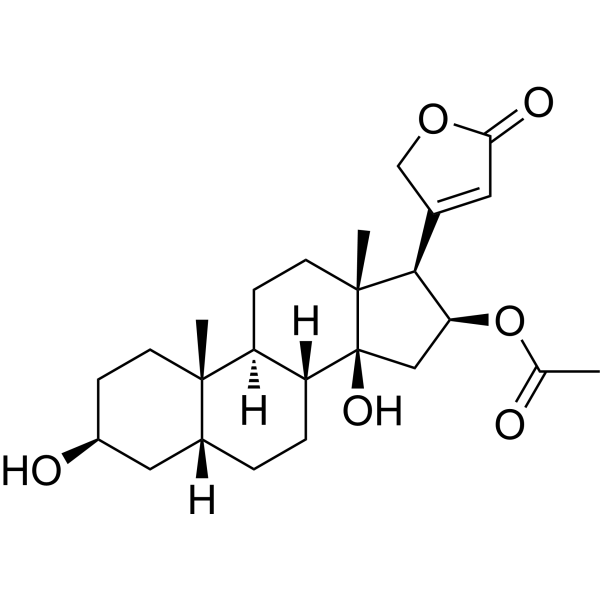
- HY-118384
-
|
NSC 65346; BA-90912
|
PKC
Nucleoside Antimetabolite/Analog
|
Cancer
|
|
Sangivamycin (NSC 65346), a nucleoside analog, is a potent inhibitor of protein kinase C (PKC) with an Ki of 10 μM. Sangivamycin has potent antiproliferative activity against a variety of human cancers .
|
-
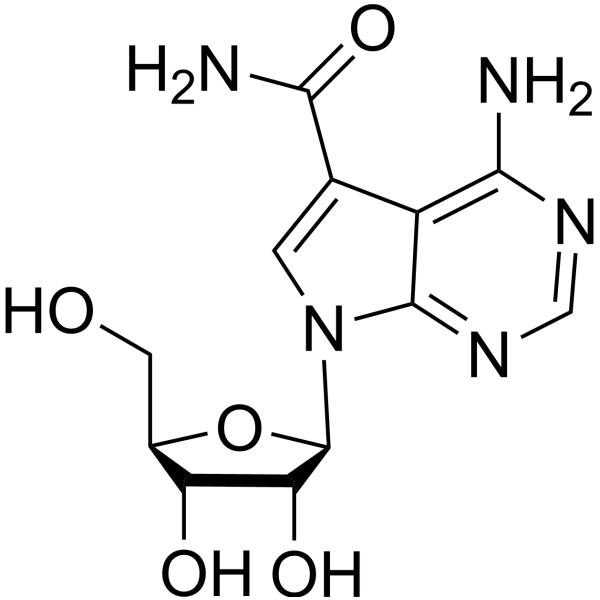
- HY-158018
-
|
|
EGFR
|
Cancer
|
|
EGFR-TK-IN-2 (compound 10b) is EGFR-TK inhibitor with the IC50 of 0.16 μM. EGFR-TK-IN-2 inhibits cell growth .
|
-
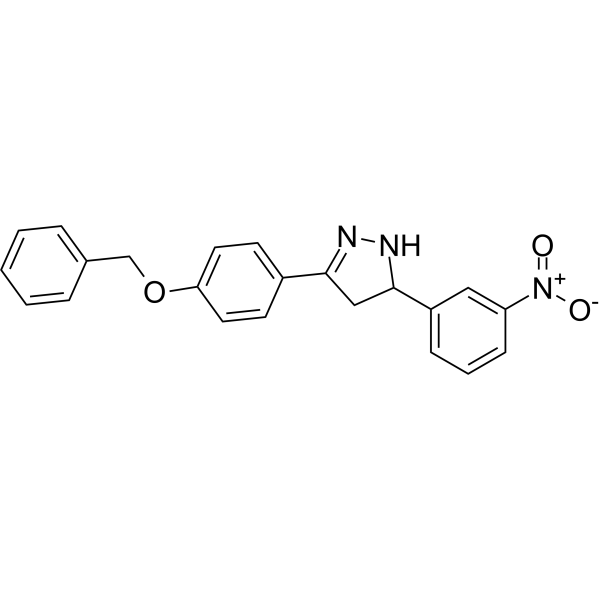
- HY-119635
-
|
|
Others
|
Cancer
|
|
Albicanol is a sesquiterpenoid with potent antioxidant and antagonistic activities against heavy metal toxicity. Albicanol shows cytotoxicity. Albicanol suppress profenofos (HY-B0832) induced genotoxicity in grass carp hepatocytes .
|
-
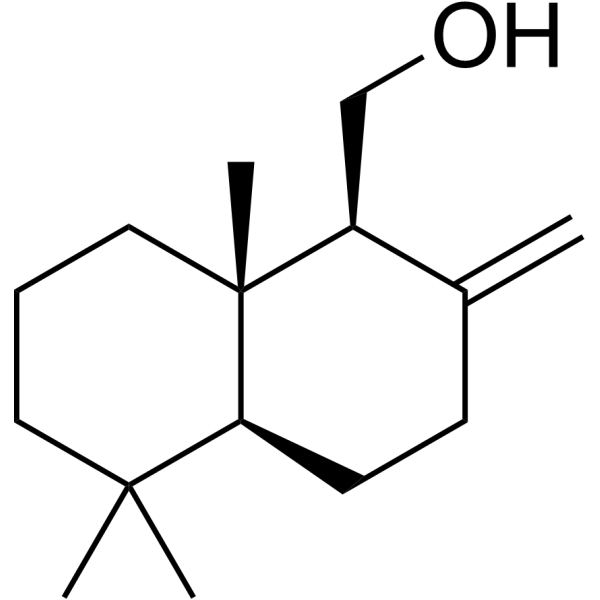
- HY-147532
-
|
|
Cannabinoid Receptor
|
Cancer
|
|
CB2R probe 1 is a safe and green CB2R (cannabinoid 2 receptor) fluorescent probe with an Ki of 130 nM. CB2R probe 1 shows low cytotoxicity in cancer cells .
|
-
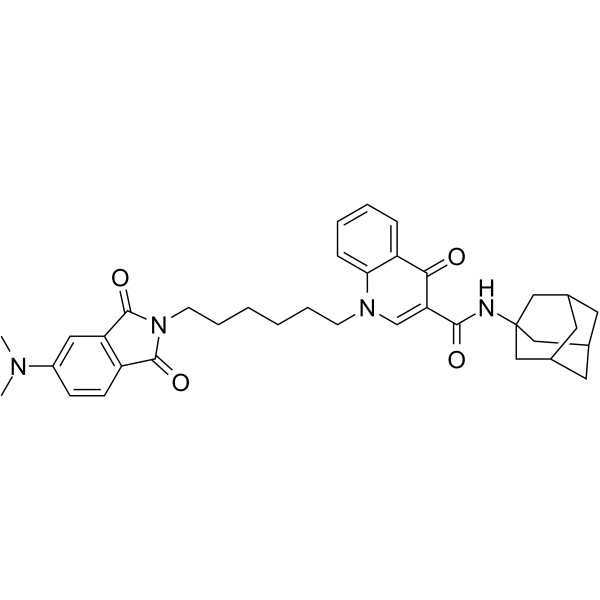
- HY-19822A
-
|
RAD1901 dihydrochloride
|
Estrogen Receptor/ERR
|
Cancer
|
|
Elacestrant (RAD1901) dihydrochloride is an orally available and selective estrogen receptor degrader (SERD) with IC50s of 48 and 870 nM for ERα and ERβ, respectively. Elacestrant dihydrochloride also can inhibit growth of ER + breast cancer cell lines in vitro and in vivo .
|
-
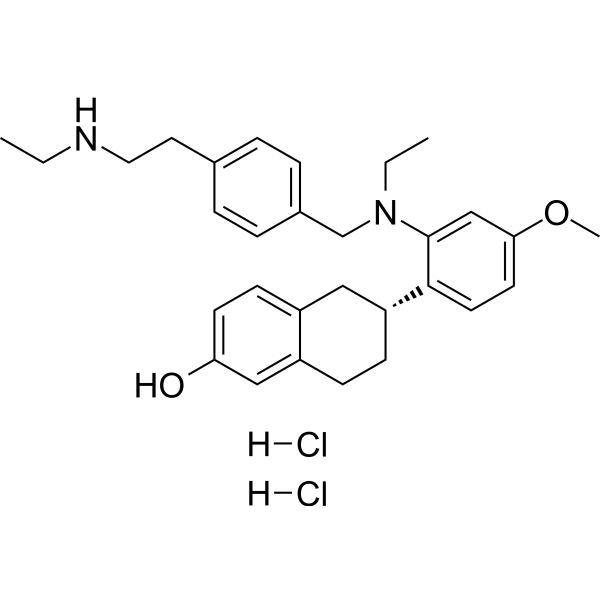
- HY-19822
-
|
RAD1901
|
Estrogen Receptor/ERR
|
Cancer
|
|
Elacestrant (RAD1901) is an orally available and selective estrogen receptor degrader (SERD) with IC50s of 48 and 870 nM for ERα and ERβ, respectively. Elacestrant also can inhibit growth of ER + breast cancer cell lines in vitro and in vivo .
|
-
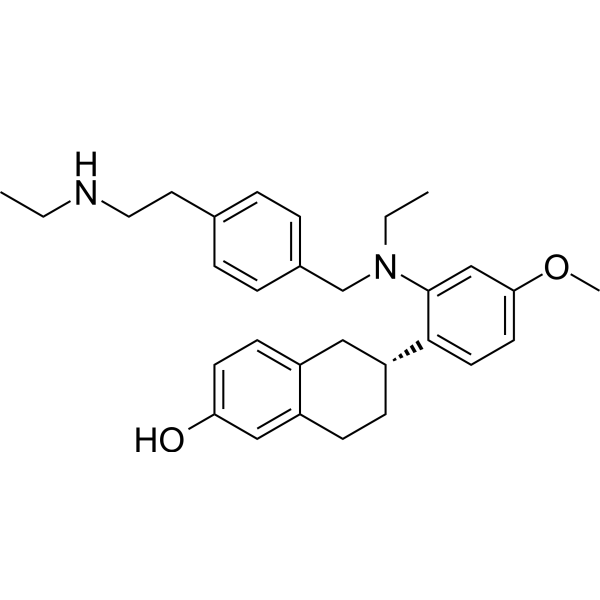
- HY-P99284
-
|
MK-0646; h7C10
|
IGF-1R
Apoptosis
|
Cancer
|
|
Dalotuzumab (MK-0646) is a recombinant humanized monoclonal antibody (IgG1 type) targeting IGF-1R. Dalotuzumab acts by inhibiting IGF-1- and IGF-2-mediated tumor cell proliferation, IGF-1R autophosphorylation, and Akt phosphorylation. Dalotuzumab also induces apoptosis and cycle arrest. Dalotuzumab in combination with other anticancer agents such as statins can enhance the antitumor activity of Dalotuzumab in vitro and in vivo .
|
-

- HY-19822S2
-
|
RAD1901-d10
|
Estrogen Receptor/ERR
Isotope-Labeled Compounds
|
Cancer
|
|
Elacestrant-d10 is the deuterium labeled of Elacestrant (HY-19822). Elacestrant is an orally available and selective estrogen receptor degrader (SERD) with IC50s of 48 and 870 nM for ERα and ERβ, respectively. Elacestrant also inhibits growth of ER + breast cancer cell lines in vitro and in vivo .
|
-
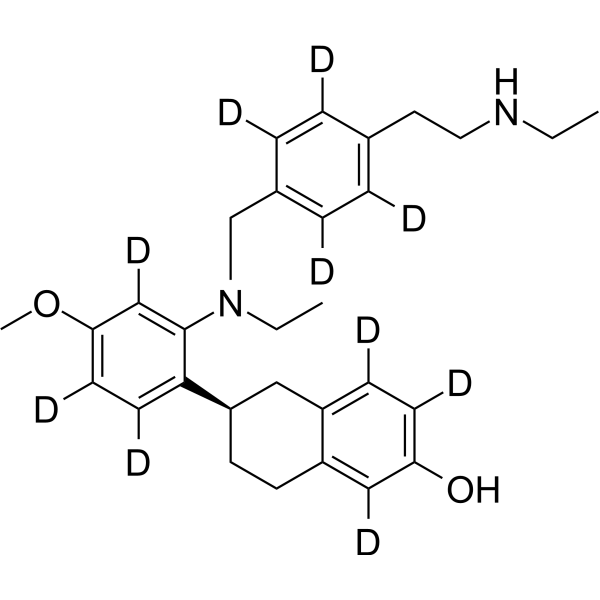
- HY-162360
-
|
|
Apoptosis
EGFR
Caspase
Bcl-2 Family
|
Cancer
|
|
EGFR-IN-109 (compound 4) is an EGFR inhibitor, with the IC50 values of 25.8 and 182.3 nM for EGFR WT and EGFR T790M, respectively. EGFR-IN-109 arrests the cancer cells’ growth at the G2/M phase and induces both early and late apoptosis. EGFR-IN-109 can be used in cancer research .
|
-
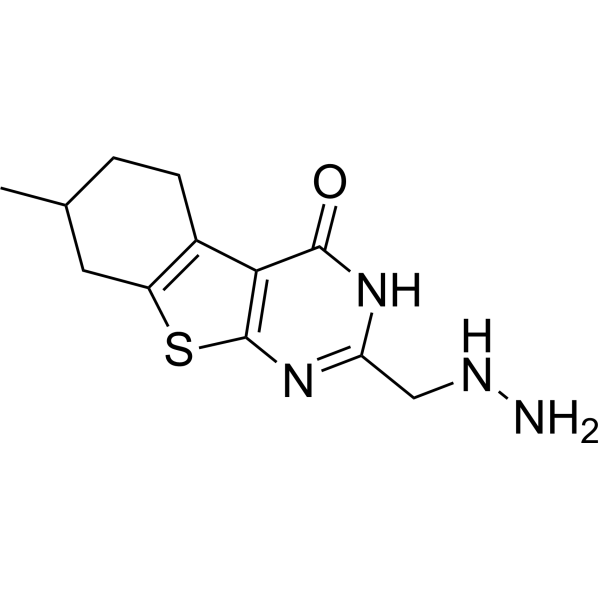
- HY-12646
-
|
|
Ras
Apoptosis
|
Cancer
|
|
Rhosin hydrochloride is a potent, specific RhoA subfamily Rho GTPases inhibitor. Rhosin hydrochloride specifically binds to RhoA to inhibit RhoA-GEF interaction with a Kd of ~ 0.4 uM, and does not interact with Cdc42 or Rac1, nor the GEF, LARG. Rhosin hydrochloride induces cell apoptosis . Rhosin hydrochloride promotes stress resiliency through enhancing D1-MSN plasticity and reducing hyperexcitability .
|
-
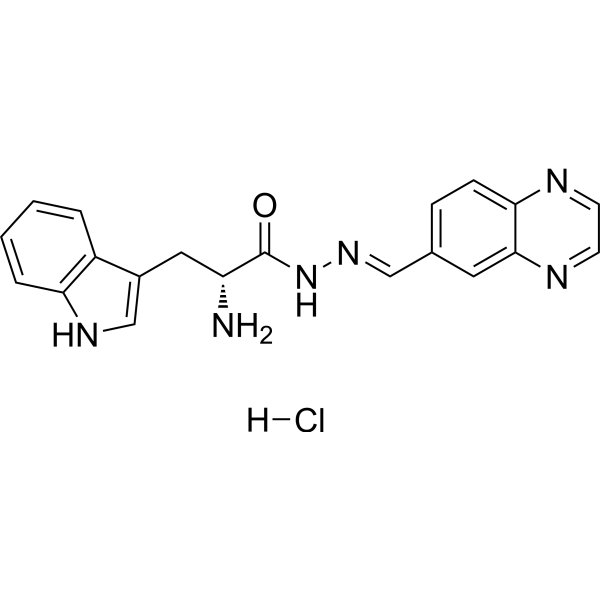
- HY-12646A
-
|
|
Ras
Apoptosis
|
Cancer
|
|
Rhosin is a potent, specific RhoA subfamily Rho GTPases inhibitor, which specifically binds to RhoA to inhibit RhoA-GEF interaction with a Kd of ~ 0.4 uM, and does not interact with Cdc42 or Rac1, nor the GEF, LARG. Rhosin induces cell apoptosis . Rhosin promotes stress resiliency through enhancing D1-MSN plasticity and reducing hyperexcitability .
|
-
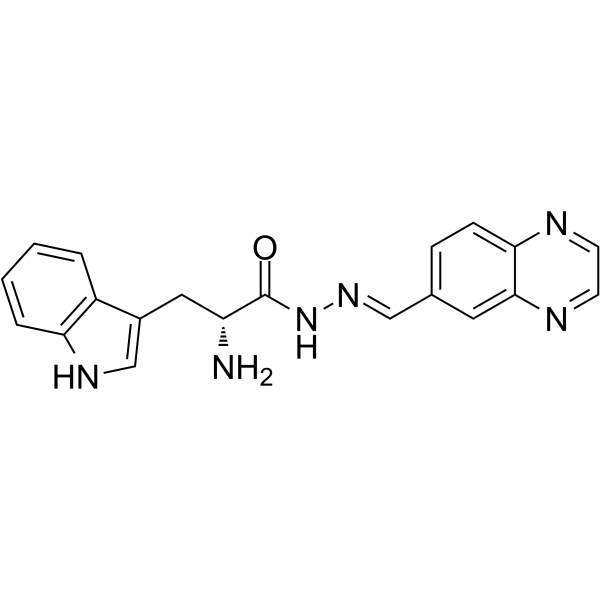
- HY-147703
-
|
|
Aurora Kinase
|
Cancer
|
|
Aurora kinase inhibitor-9 (compound 9d) is a potent AURKA/B dual aurora kinase inhibitor with IC50s of 0.093, 0.09 µM for Aurora A, Aurora B, respectively. Aurora kinase inhibitor-9 shows broad spectrum anti-proliferative activity .
|
-
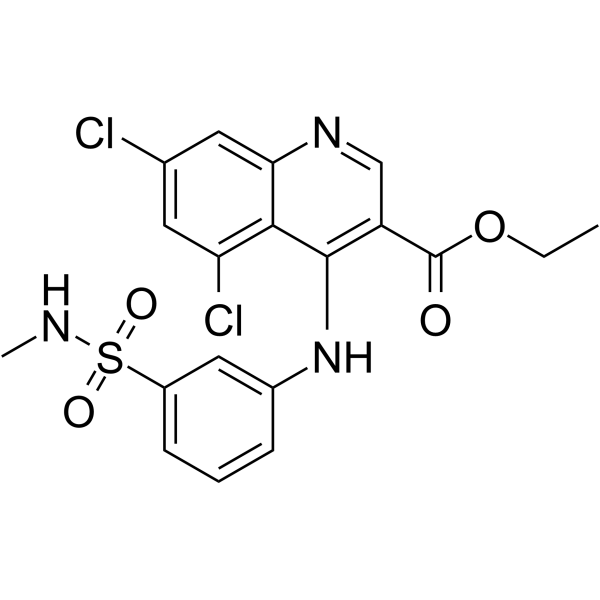
- HY-117522
-
|
|
Separase
|
Cancer
|
|
Sepin-1 is a potent separase inhibitor with an IC50 value of 14.8 µM. Sepin-1 inhibits cell proliferation, migration and wound healing. Sepin-1 decreases the expression of FoxM1 protein and mRNA level. Sepin-1 shows anti-tumor activity .
|
-
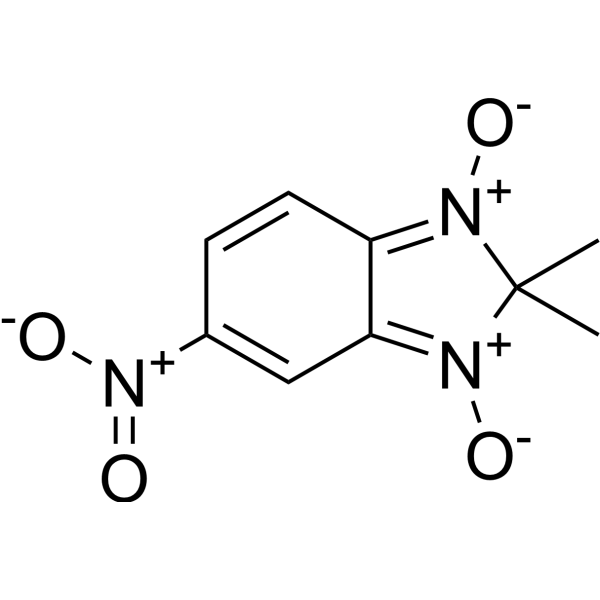
- HY-110147A
-
|
|
Furin
|
Infection
|
|
SSM3 tetraTFA is a potent synthetic furin inhibitor with an EC50 and a Ki of 54 nM and 12 nM, respectively. SSM3 tetraTFA is able to block furin-dependent cell surface processing of anthrax protective antigen-83 in vitro .
|
-
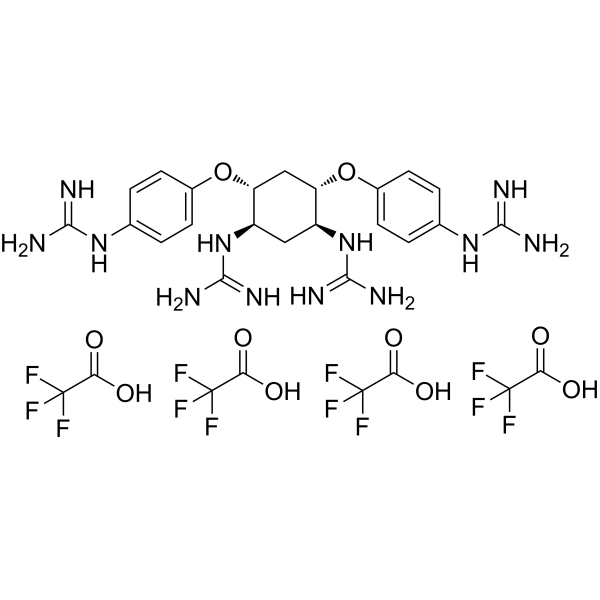
- HY-110147B
-
|
|
Furin
|
Infection
|
|
SSM3 tetraTFA hydrate is a potent synthetic furin inhibitor with an EC50 and a Ki of 54 nM and 12 nM, respectively. SSM3 tetraTFA hydrate is able to block furin-dependent cell surface processing of anthrax protective antigen-83 in vitro .
|
-
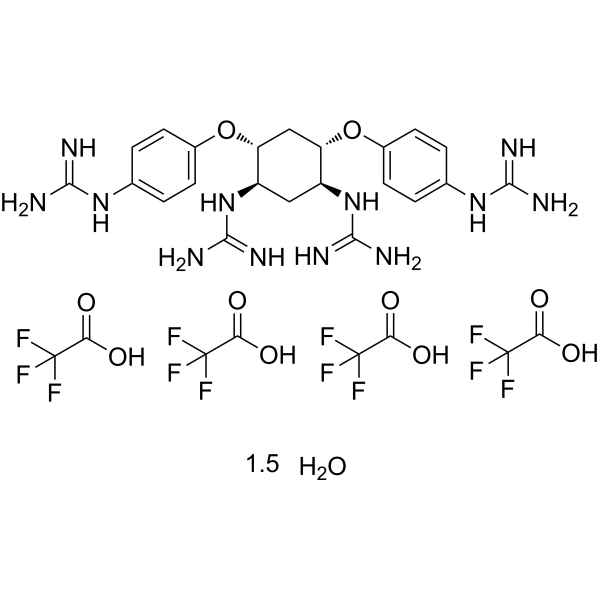
- HY-148592
-
|
|
Cytochrome P450
|
Cancer
|
|
Antitumor agent-87 is a potent antitumor agent. Antitumor agent-87 shows a high affinity for CYP1A1 with a Ki value of 0.23 µM. Antitumor agent-87 shows antiproliferative activity. Antitumor agent-87 induces cell cycle arrest at the G2/M phase. Antitumor agent-87 show antitumoral activity .
|
-
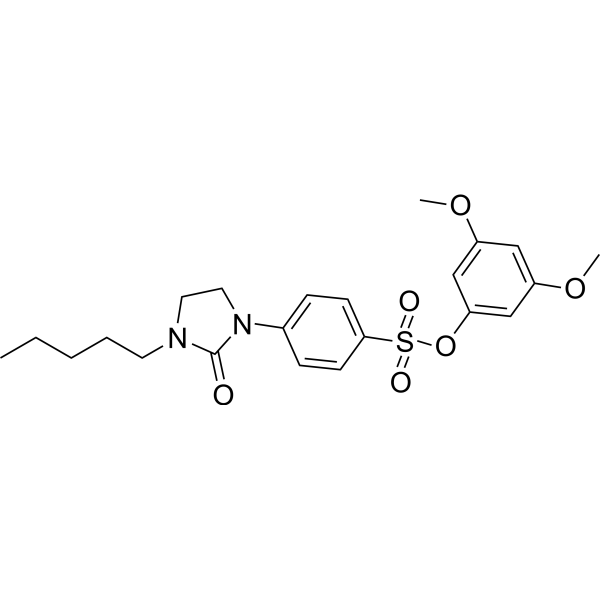
- HY-145857
-
|
|
HSP
Apoptosis
|
Cancer
|
|
GRP78-IN-1 exhibits several interactions with GRP78 residues with binding energy of -8.07 kcal/mol. GRP78-IN-1 shows the potent cytotoxic, anti-proliferative in cancer cells. GRP78-IN-1 exhibits promising apoptosis in breast cancer cells and wound healing properties .
|
-
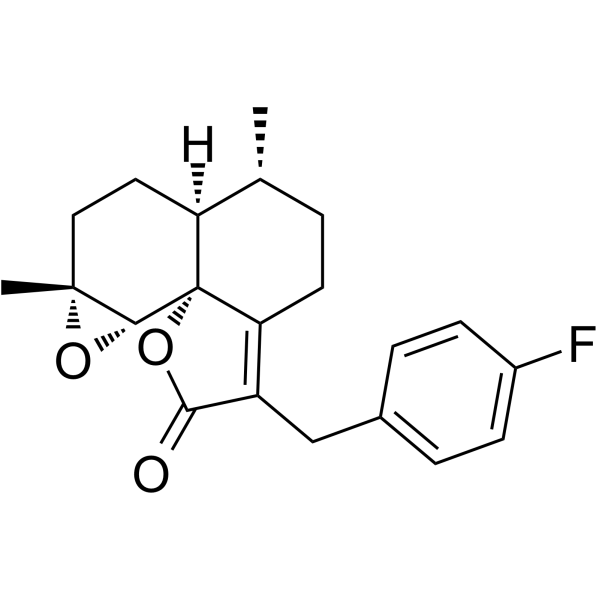
- HY-124675
-
MYCMI-6
1 Publications Verification
NSC354961
|
c-Myc
Apoptosis
|
Cancer
|
|
MYCMI-6 (NSC354961) is a potent and selective endogenous MYC:MAX protein interactions inhibitor. MYCMI-6 blocks MYC-driven transcription and binds selectively to the MYC bHLHZip domain with a Kd of 1.6 μM. MYCMI-6 inhibits tumor cell growth in a MYC-dependent manner (IC50<0.5 μM). MYCMI-6 is not cytotoxic to normal human cells. MYCMI-6 induces apoptosis .
|
-
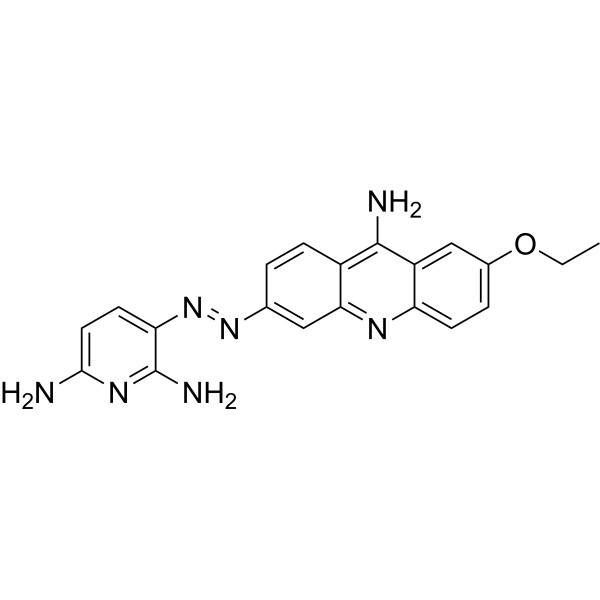
- HY-122886
-
|
|
Deubiquitinase
|
Cancer
|
|
XL 188 is a potent and selective USP7 inhibitor with IC50 values of 90 nM and 193 nM for USP7 full-length and catalytic domain enzyme, respectively. XL 188 can be used in research of cancer .
|
-
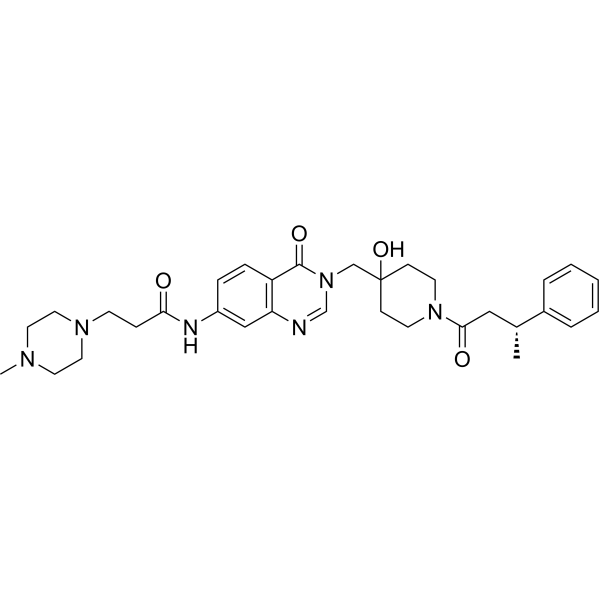
- HY-15275
-
|
|
CDK
Angiotensin-converting Enzyme (ACE)
|
Infection
Cancer
|
|
BMS-265246 is a potent and selective cyclin-dependent kinase CDK1 and CDK2 inhibitor, with IC50 values of 6 and 9 nM, respectively. BMS-265246 inhibits CHI3L1 (chitinase 3-like-1) stimulation of ACE2 (angiotensin converting enzyme 2) and SPP (viral spike protein priming proteases). BMS-265246 can be used for ovarian cancer and COVID-19 research .
|
-
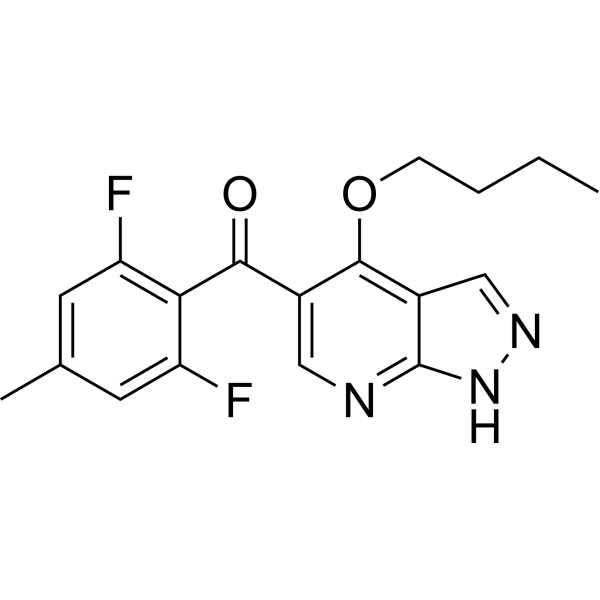
- HY-110088
-
|
|
MDM-2/p53
|
Cancer
|
|
SCH529074 is a potent and orally active p53 activator. SCH529074 binds specifically and conformation-dependently to p53 DBD ( DNA binding domain) with a Ki of 1-2 μM in a saturable manner. SCH529074 restores mutant p53 function and interrupts HDM2-mediated ubiquitination of wild Type p53. SCH529074 can be used for the study of non-small-cell lung carcinoma (NSCLC) .
|
-
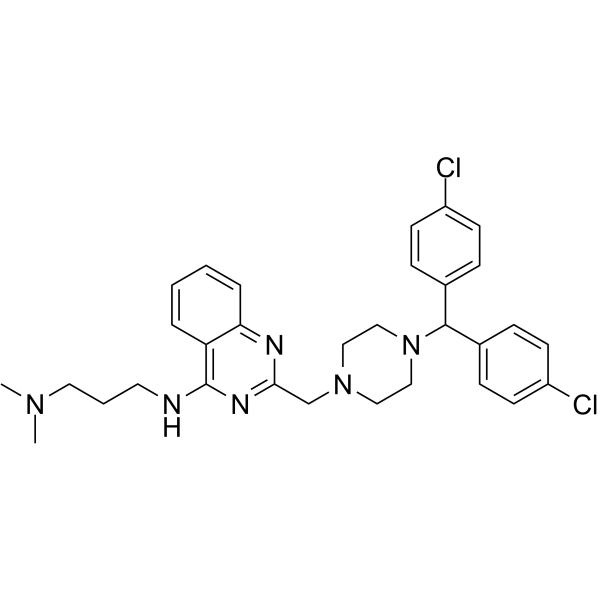
- HY-122665
-
|
|
MELK
DYRK
Pim
mTOR
CDK
GSK-3
RIP kinase
|
Cancer
|
|
HTH-01-091 is a potent and selective maternal embryonic leucine zipper kinase (MELK) inhibitor, with an IC50 of 10.5 nM. HTH-01-091 also inhibits PIM1/2/3, RIPK2, DYRK3, smMLCK and CLK2. HTH-01-091 can be uesd for breast cancer research .
|
-
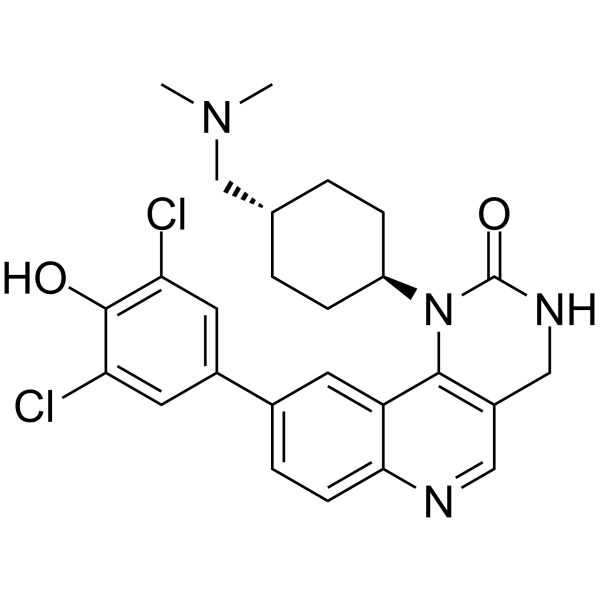
- HY-122665A
-
|
|
MELK
DYRK
Pim
mTOR
CDK
GSK-3
RIP kinase
|
Cancer
|
|
HTH-01-091 TFA is a potent and selective maternal embryonic leucine zipper kinase (MELK) inhibitor, with an IC50 of 10.5 nM. HTH-01-091 TFA also inhibits PIM1/2/3, RIPK2, DYRK3, smMLCK and CLK2. HTH-01-091 TFA can be uesd for breast cancer research .
|
-
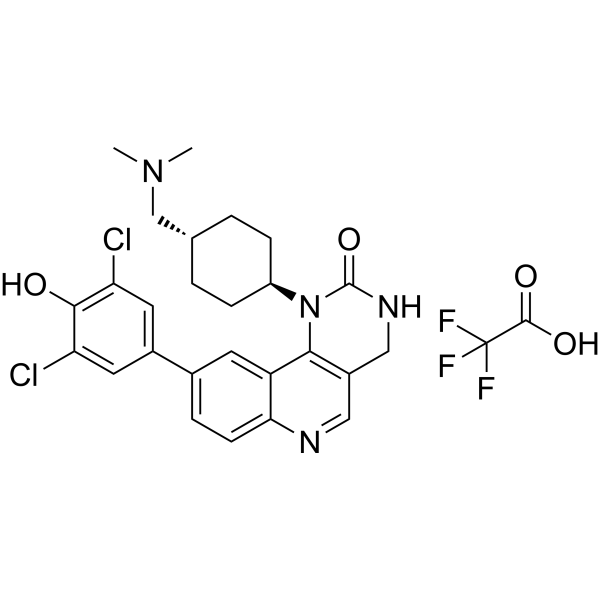
- HY-144315
-
|
|
HDAC
|
Cancer
|
|
Snail/HDAC-IN-1 is a potent Snail/HDAC dual target inhibitor. Snail/HDAC-IN-1 displays potent inhibitory activity against HDAC1 with an IC50 of 0.405 μM and potent inhibition against Snail with a Kd of 0.18 μM. Snail/HDAC-IN-1 increases histone H4 acetylation in HCT-116 cells and decreases the expression of Snail protein to induce cell apoptosis .
|
-
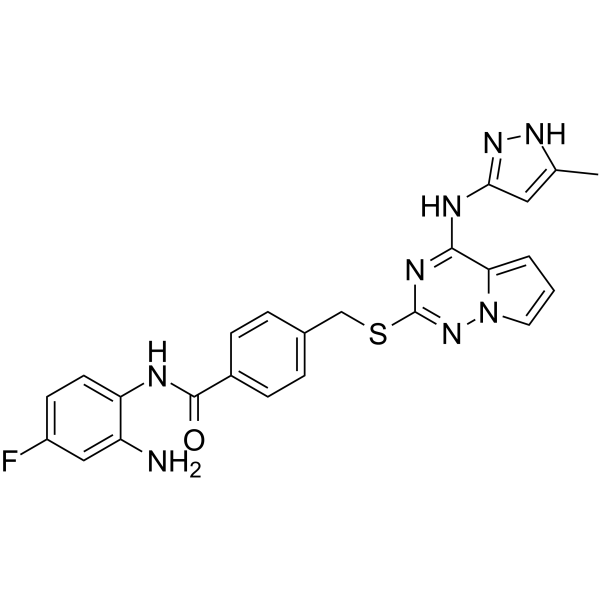
- HY-158058
-
|
|
Toll-like Receptor (TLR)
Pyroptosis
|
Inflammation/Immunology
Cancer
|
|
WYJ-2 is a selective agonist for toll-like receptor 2/1 (TLR2/1) with EC50 of 18.57 nM in human TLR2 and TLR1 transient-cotransfected HEK 293T cells. WYJ-2 induces pyroptosis and exhibits anticancer activity against non-small cell lung cancer (NSCLC) .
|
-
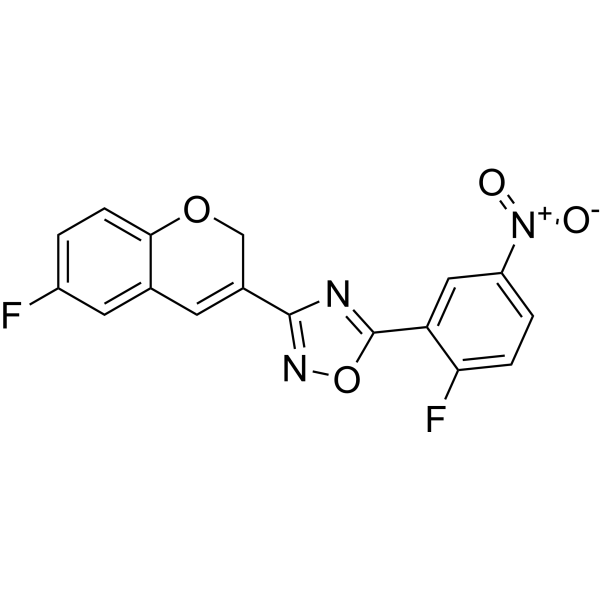
- HY-U00447
-
|
|
MDM-2/p53
DNA Alkylator/Crosslinker
|
Cancer
|
|
PK11000 is an alkylating agent, and stabilizes the DNA-binding domain of both WT and mutant p53 proteins by covalent cysteine modification without compromising DNA binding. PK11000 has anti-tumor activities .
|
-
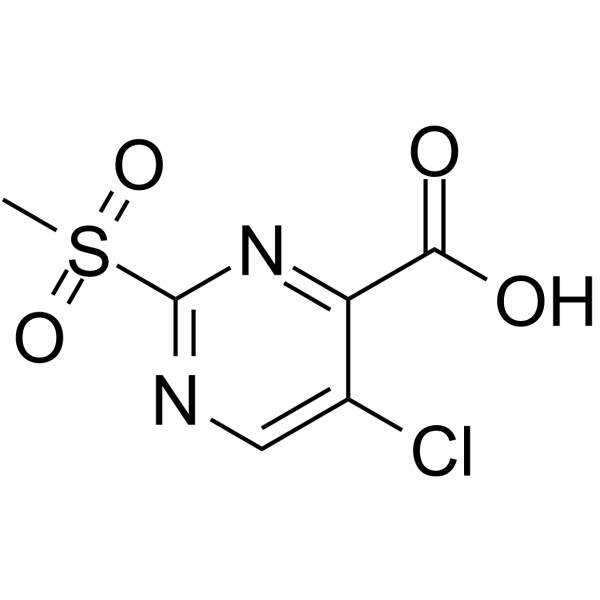
| Cat. No. |
Product Name |
Type |
-
- HY-B0812
-
|
SSA dihydrate
|
Biochemical Assay Reagents
|
|
5-Sulfosalicylic acid dihydrate is a sulfonated salicylic acid derivative. 5-Sulfosalicylic acid dihydrate is effective against the breast cancer cell line, MCF-7, with less toxicity . 5-Sulfosalicylic acid dihydrate has antioxidant activities .
|
| Cat. No. |
Product Name |
Target |
Research Area |
-
- HY-P5956
-
|
|
Caspase
|
Cancer
|
|
Ac-AAVALLPAVLLALLAP-LEHD-CHO is an inhibitor of caspases 4, 5 and 9. Ac-AAVALLPAVLLALLAP-LEHD-CHO shows protective effects upon Neocarzinostatin (HY-111183)-treated MCF-7 cells .
|
-
- HY-P5033
-
|
|
Peptides
|
Cancer
|
Cyclo(Gly-His) is a liposome-encapsulated cyclic dipeptide with antimicrobial and anticancer activity. Cyclo(Gly-His) has cytotoxicity for HeLa and MCF-7 cell with IC50 values of 1.699 mM and 0.358 mM, respectively. Cyclo(Gly-His) can be used for the research of drug delivery systems .
|
-
- HY-P4523
-
|
|
Endogenous Metabolite
|
Endocrinology
|
|
FA-Ala-Arg is a dipeptide with furylacryloyl group. FA-Ala-Arg breaks down to produce arginine. While cell-surface Carboxypeptidase-D (CPD) also increases intracellular Arg, which is converted to nitric oxide (NO). FA-Ala-Arg enhances NO production in MCF-7 cells. FA-Ala-Arg also increases the cell survival of prolactin (PRL)-treated cells, PRL regulates CPD mRNA levels in cells .
|
| Cat. No. |
Product Name |
Target |
Research Area |
-
- HY-P99284
-
|
MK-0646; h7C10
|
IGF-1R
Apoptosis
|
Cancer
|
|
Dalotuzumab (MK-0646) is a recombinant humanized monoclonal antibody (IgG1 type) targeting IGF-1R. Dalotuzumab acts by inhibiting IGF-1- and IGF-2-mediated tumor cell proliferation, IGF-1R autophosphorylation, and Akt phosphorylation. Dalotuzumab also induces apoptosis and cycle arrest. Dalotuzumab in combination with other anticancer agents such as statins can enhance the antitumor activity of Dalotuzumab in vitro and in vivo .
|
| Cat. No. |
Product Name |
Category |
Target |
Chemical Structure |
-
- HY-N11973
-
-

-
- HY-N10871
-
-

-
- HY-N12209
-
-

-
- HY-N5103
-
-

-
- HY-N3042
-
-

-
- HY-N4010
-
-

-
- HY-N8679
-
-

-
- HY-N2887
-
-

-
- HY-N10305
-
-

-
- HY-119539
-
-

-
- HY-N2863
-
-

-
- HY-N7464
-
-

-
- HY-N6990
-
-

-
- HY-N9391
-
-

-
- HY-22024
-
-

-
- HY-N8859
-
-

-
- HY-N3443
-
-

-
- HY-N10846
-
-

-
- HY-N7654
-
-

-
- HY-N11438
-
-

-
- HY-N3316
-
-

-
- HY-N3261
-
-

-
- HY-N11919
-
-

-
- HY-N7302
-
-

-
- HY-N3000
-
-

-
- HY-N10959
-
-

-
- HY-N10351
-
-

-
- HY-N6885
-
-

-
- HY-N3615
-
-

-
- HY-N12299
-
-

-
- HY-N12607
-
-

-
- HY-N10777
-
-

-
- HY-N11928
-
-

-
- HY-145379
-
-

-
- HY-N10023
-
-

-
- HY-113319
-
-

-
- HY-N9505
-
-

-
- HY-N1107
-
-

-
- HY-N7340
-
-

-
- HY-N12208
-
-

-
- HY-50936
-
-

-
- HY-N3210
-
-

-
- HY-119358
-
-

-
- HY-N2741
-
-

-
- HY-N12586
-
-

-
- HY-138210
-
|
|
Structural Classification
Natural Products
Microorganisms
Source classification
|
Fungal
|
|
N,O-Diacetyltyramine is a compound with antibacterial activity and cytotoxicity that can be isolated from the actinomycete Pseudonocardia endophytica VUK-10. N,O-Diacetyltyramine has antibacterial activity against Gram-positive and Gram-negative bacteria and fungi. N,O-Diacetyltyramine is cytotoxic to MDA-MB-231, HeLa, MCF-7 and OAW-42 cells .
|
-

-
- HY-N10481
-
-

-
- HY-135453
-
-

-
- HY-138098
-
-

-
- HY-N10621
-
|
|
Structural Classification
Combretaceae
Phenols
Polyphenols
Plants
Quisqualis indica Linn.
|
Others
|
|
3,5-Dimethoxy-2,7-phenanthrenediol (compound 2) is a phenanthrene compound isolated from the roots of Combretum laxum. 3,5-Dimethoxy-2,7-phenanthrenediol is cytotoxic to human cancer cell lines 786-0, MCF-7 and NCI/ADR-RES, with IC50s of 73.26 μM, 118.40 μM and 83.99 μM respectively. 3,5-Dimethoxy-2,7-phenanthrenediol also has free radical scavenging activity with an IC50 of 20.4 μM .
|
-

- HY-N9174
-
|
|
Structural Classification
Flavonoids
Flavones
Source classification
Plants
Moraceae
Broussonetia papyrifera (Linnaeus) L'Heritier ex Ventenat
|
Others
|
|
5,7,3',4'-Tetrahydroxy-3-methoxy-8,5'-diprenylflavone is a natural product that can be extracted from B. papyrifera. 5,7,3',4'-Tetrahydroxy-3-methoxy-8,5'-diprenylflavone has potent anti-proliferation effects on ER-positive breast cancer cells, with an IC50 value of 4.41 μM for MCF-7 cells. 5,7,3',4'-Tetrahydroxy-3-methoxy-8,5'-diprenylflavone also reduces the tumor growth in the BCAP-37 xenograft .
|
-

- HY-N10778
-
|
|
Triterpenes
Structural Classification
Terpenoids
Source classification
Cucurbitaceae
Plants
Momordica charantia Linn.
|
Others
|
|
(19R,23E)-5b,19-Epoxy19-ethoxycucurbita-6,23-diene-3b,25-diol is a cucurbitane-type triterpenoid. (19R,23E)-5b,19-Epoxy19-ethoxycucurbita-6,23-diene-3b,25-diol has been tested to no effect against 5 cancer cell lines, MCF-7, HepG2, Du145, Colon205 and HL-60 by MTT assay .
|
-

- HY-N12135
-
|
|
Structural Classification
Terpenoids
Labiatae
Source classification
Diterpenoids
Plants
Cyrtocymura cincta var. cincta
|
Others
|
|
15α-Hydroxy-20-oxo-6,7-seco-ent-kaur-16-en-1,7α(6,11α)-diolide (compound 2) is an enantio-kaurene diterpenoid (ent -kaurene diterpenoid), which can be isolated from Rubescens rubescens. 15α-Hydroxy-20-oxo-6,7-seco-ent-kaur-16-en-1,7α(6,11α)-diolide has cellular activity against EC-1, U87, A549, MCF-7 and HeLa cell lines Toxicity, IC50s are 37.69 μM, 79.362 μM, 80.07 μM, 197.35 μM, 462.13 μM, and 180.09 μM respectively .
|
-

- HY-114803
-
-

- HY-N12606
-
-

- HY-N3737
-
-

- HY-N11690
-
-

- HY-118384
-
-

- HY-119635
-
-

| Cat. No. |
Product Name |
Chemical Structure |
-
- HY-13636S
-
|
|
|
Fulvestrant-d3 is the deuterium labeled Fulvestrant. Fulvestrant (ICI 182780) is a pure antiestrogen and a potent estrogen receptor (ER) antagonist with an IC50 of 9.4 nM. Fulvestrant is also a GPR30 agonist. Fulvestrant effectively inhibits the growth of ER-positive MCF-7 cells with an IC50 of 0.29 nM. Fulvestrant also induces autophagy and has antitumor efficacy[1].
|
-

-
- HY-50936S
-
|
|
|
Trabectedin D3 (Ecteinascidin 743 D3) is deuterium labeled Trabectedin. Trabectedin is a tetrahydroisoquinoline alkaloid with potent antitumor activity. Trabectedin binds to the minor groove of DNA, blocks transcription of stress-induced proteins, induces DNA backbone cleavage and cancer cells apoptosis, and increases the generation of ROS in MCF-7 and MDA-MB-453 cells. Trabectedin has tje potential for soft tissue sarcoma and ovarian cancer treatment .
|
-

-
- HY-19822S2
-
|
|
|
Elacestrant-d10 is the deuterium labeled of Elacestrant (HY-19822). Elacestrant is an orally available and selective estrogen receptor degrader (SERD) with IC50s of 48 and 870 nM for ERα and ERβ, respectively. Elacestrant also inhibits growth of ER + breast cancer cell lines in vitro and in vivo .
|
-

| Cat. No. |
Product Name |
|
Classification |
-
- HY-111640
-
|
|
|
Azide
|
|
3'-Azido-3'-deoxy-5-methylcytidine (CS-92) is a potent xenotropic murine leukemia-related retrovirus (XMRV) inhibitor with a CC50 of 43.5 μM in MCF-7 cells. 3'-Azido-3'-deoxy-5-methylcytidine also inhibits HIV-1 reverse transcriptase with an EC50 of 0.06 μM in peripheral blood mononuclear (PBM) cells . 3'-Azido-3'-deoxy-5-methylcytidine is a click chemistry reagent, it contains an Azide group and can undergo copper-catalyzed azide-alkyne cycloaddition reaction (CuAAc) with molecules containing Alkyne groups. Strain-promoted alkyne-azide cycloaddition (SPAAC) can also occur with molecules containing DBCO or BCN groups.
|
Your information is safe with us. * Required Fields.
Inquiry Information
- Product Name:
- Cat. No.:
- Quantity:
- MCE Japan Authorized Agent:



















































































































































































































































































